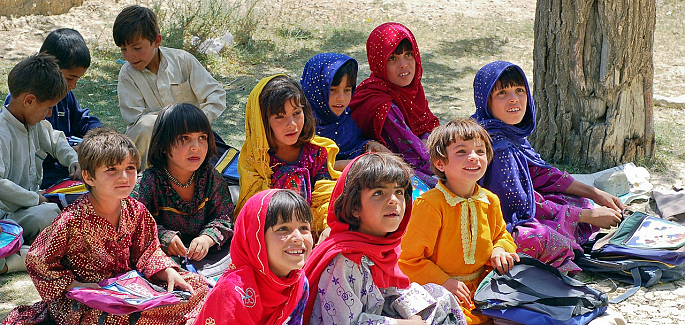
13 Jan 2018 | Non categorizzato

Foto: Pixabay
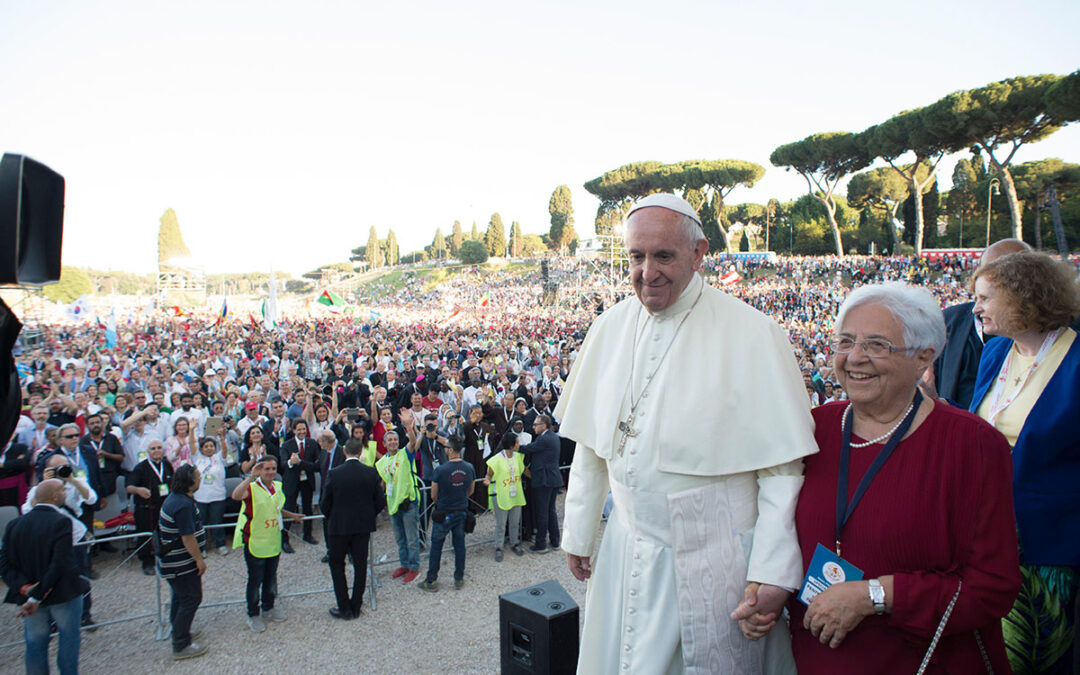
12 Jan 2018 | Non categorizzato
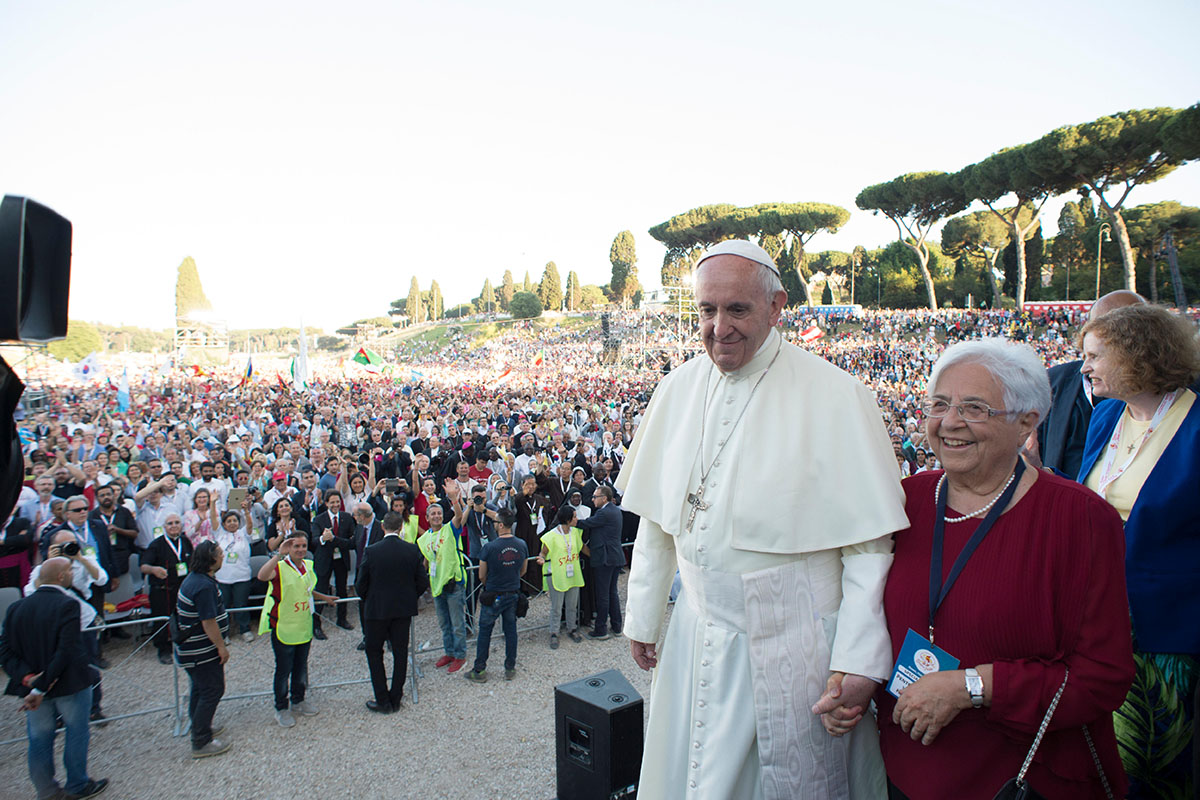
© Osservatore Romano
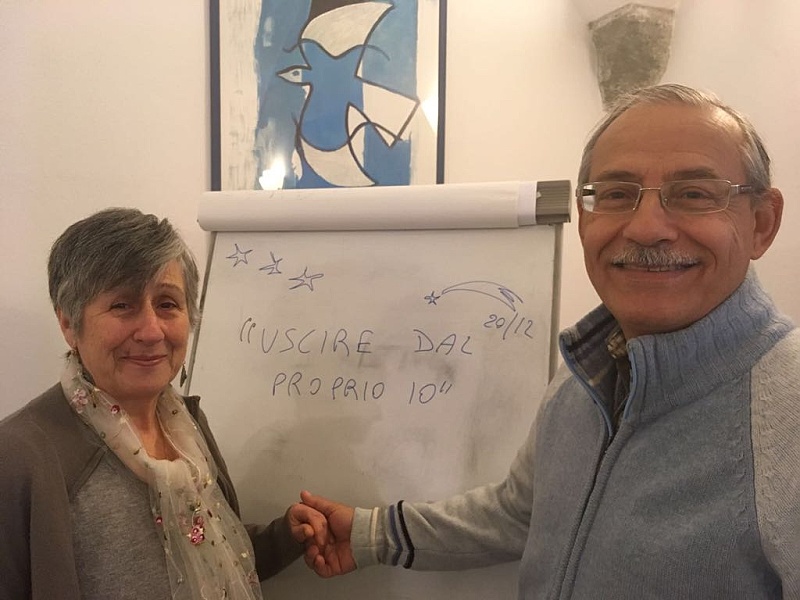
11 Jan 2018 | Focolare Worldwide
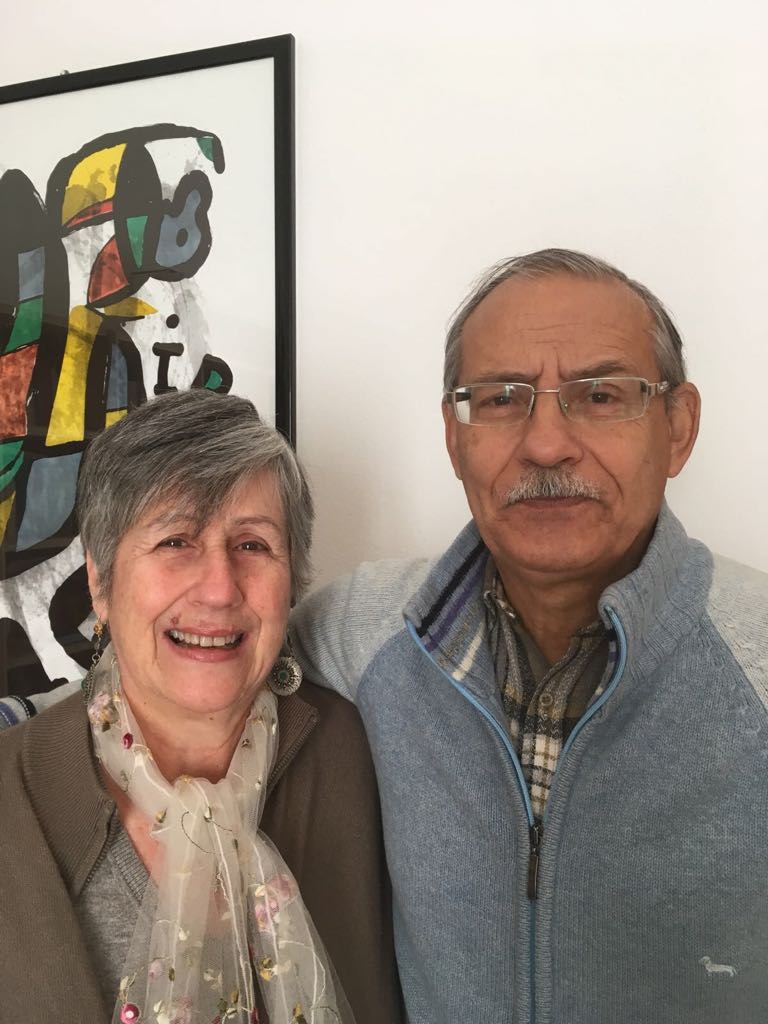 Rosy and Leo Prisco are from Naples, Italy. He’s a railroad worker and she’s an accountant. They’re retired. Their story began 40 years ago at a time when couples who opted for a civil ceremonies were very few. They were agnostics and went to city hall for their wedding. They were so different from each other that no one was betting on their staying together. At the birth of their first child they had a doubt: Should they baptize him or not? They spoke with the parish priest. “For us, adamant Marxists and agnostics, it was unthinkable that a priest should welcome us in such a warm, friendly and open way. Father Salvatore didn’t express a single judgement towards us regarding our situation as a couple, but he became a friend to the point that we were even able to tell him about our constant fighting. Yes, because it was easy to be a revolutionary when we were outside the house, inside the house I was the one doing all the cooking and cleaning. I remember how – to get Leo to listen to me (I was a bit crazy, but at least it worked sometimes!) – I’d do what we did when we held protests on the town square: I’d hang signs on the kitchen walls that said: ‘You’re a tyrant,’ ‘You’re treading on the equality of women,’ and so on. Father Salvatore introduced us to other couples. They were also having problems but had learned to dialogue, and they also had a secret: apologizing and beginning again. We began doing the same, which helped to improve our relationship one day at a time. Meanwhile, Father Salvatore agreed to celebrate Francesco’s baptism and, six years later, the baptism of Nunzio.” “Thanks to Father Salvatore and the other families,” Leo explains, “we had an encounter with God and with God’s love and, little by little, the desire grew in us to be children in accordance with God’s heart.” We came to realize that even though we had turned our backs on him, He never stopped speaking to us, because He is Love. Just as He had in 1993, inside a mortuary room at a hospital. There, by chance, we had come across the pain of two parents whose little angel, a boy of three years, had died. That was a powerful message to us. What if that happened to us? They were the same parents that we met again at a Focolare meeting, invited by Father Salvatore. Yet, from that pain of theirs three family homes were opened for children in difficulty.”
Rosy and Leo Prisco are from Naples, Italy. He’s a railroad worker and she’s an accountant. They’re retired. Their story began 40 years ago at a time when couples who opted for a civil ceremonies were very few. They were agnostics and went to city hall for their wedding. They were so different from each other that no one was betting on their staying together. At the birth of their first child they had a doubt: Should they baptize him or not? They spoke with the parish priest. “For us, adamant Marxists and agnostics, it was unthinkable that a priest should welcome us in such a warm, friendly and open way. Father Salvatore didn’t express a single judgement towards us regarding our situation as a couple, but he became a friend to the point that we were even able to tell him about our constant fighting. Yes, because it was easy to be a revolutionary when we were outside the house, inside the house I was the one doing all the cooking and cleaning. I remember how – to get Leo to listen to me (I was a bit crazy, but at least it worked sometimes!) – I’d do what we did when we held protests on the town square: I’d hang signs on the kitchen walls that said: ‘You’re a tyrant,’ ‘You’re treading on the equality of women,’ and so on. Father Salvatore introduced us to other couples. They were also having problems but had learned to dialogue, and they also had a secret: apologizing and beginning again. We began doing the same, which helped to improve our relationship one day at a time. Meanwhile, Father Salvatore agreed to celebrate Francesco’s baptism and, six years later, the baptism of Nunzio.” “Thanks to Father Salvatore and the other families,” Leo explains, “we had an encounter with God and with God’s love and, little by little, the desire grew in us to be children in accordance with God’s heart.” We came to realize that even though we had turned our backs on him, He never stopped speaking to us, because He is Love. Just as He had in 1993, inside a mortuary room at a hospital. There, by chance, we had come across the pain of two parents whose little angel, a boy of three years, had died. That was a powerful message to us. What if that happened to us? They were the same parents that we met again at a Focolare meeting, invited by Father Salvatore. Yet, from that pain of theirs three family homes were opened for children in difficulty.”  For Rosy and Leo, who in 1995 said their yes in the Sacrament of Marriage, finding Gino and Elisa within the context of the Focolare appeared to be no small coincidence. “Right away a bond was established,” Rosy recounts, “which led us to offer our full-time help as foster parents in a home for families who came to stay at Casa Sorriso for longer or shorter time periods, depending on their family situations.” “This experience,” Leo confides, “gave us an awareness of being merely instruments in God’s hands, and being able to be of help wasn’t a matter of having any special gifts. Today, as then, we’re not the perfect family. We just want to place ourselves at the service of Jesus in the people we meet. Like those little Russian children that we took into our home: a relationship that continues until today now that they’re adults.” In the beginning of 2017, already retired, they wanted to celebrate the 50th anniversary of the New Families Movement by being actively involved in some of the celebratory events. They also took part in a meal for young people. The year came to an end, but not their determination to give more. Last October they moved to Loppiano, planning to stay until July and be able to follow things more closely: practical things like transportation for the families that go there from around the world.
For Rosy and Leo, who in 1995 said their yes in the Sacrament of Marriage, finding Gino and Elisa within the context of the Focolare appeared to be no small coincidence. “Right away a bond was established,” Rosy recounts, “which led us to offer our full-time help as foster parents in a home for families who came to stay at Casa Sorriso for longer or shorter time periods, depending on their family situations.” “This experience,” Leo confides, “gave us an awareness of being merely instruments in God’s hands, and being able to be of help wasn’t a matter of having any special gifts. Today, as then, we’re not the perfect family. We just want to place ourselves at the service of Jesus in the people we meet. Like those little Russian children that we took into our home: a relationship that continues until today now that they’re adults.” In the beginning of 2017, already retired, they wanted to celebrate the 50th anniversary of the New Families Movement by being actively involved in some of the celebratory events. They also took part in a meal for young people. The year came to an end, but not their determination to give more. Last October they moved to Loppiano, planning to stay until July and be able to follow things more closely: practical things like transportation for the families that go there from around the world.
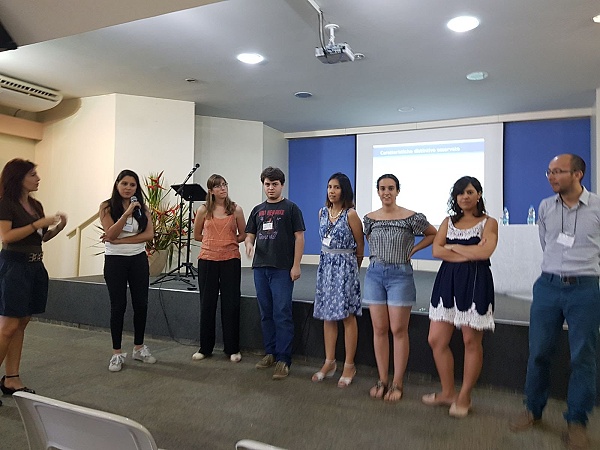
10 Jan 2018 | Focolare Worldwide
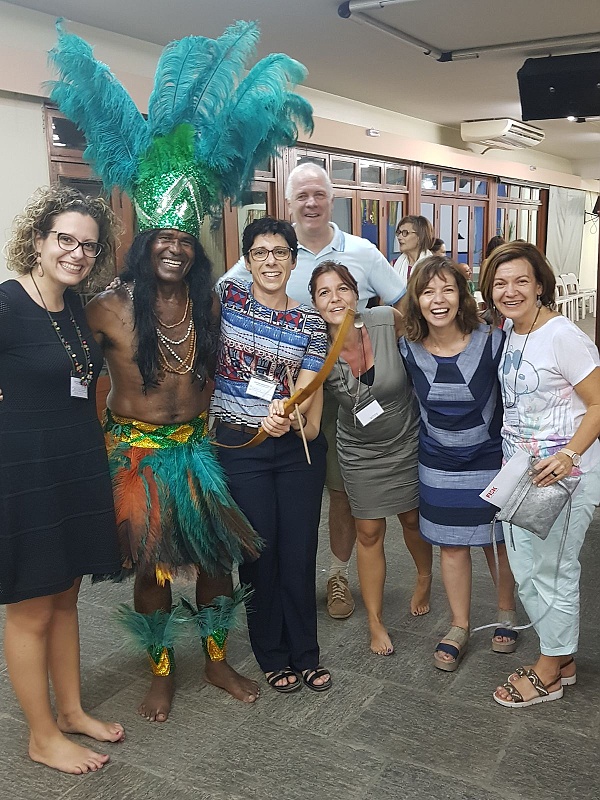 A warm summer atmosphere of the Southern Hemisphere was the framework of an encounter with the sociology of Latin America, which some of the participants described as “dazzling”. Every time we love, every time we give, it’s Christmas, claims the book “Love in the Time of Globalization”, written by Social-One Secretary, Silvia Cataldi, researcher at La Sapienza University of Rome, along with Vera Araujo and Gennaro Iorio who wrote Toward a new conception of sociology (Città Nuova, 2015). Sociologists pondered that same agape dimension during study sessions and in workshops.
A warm summer atmosphere of the Southern Hemisphere was the framework of an encounter with the sociology of Latin America, which some of the participants described as “dazzling”. Every time we love, every time we give, it’s Christmas, claims the book “Love in the Time of Globalization”, written by Social-One Secretary, Silvia Cataldi, researcher at La Sapienza University of Rome, along with Vera Araujo and Gennaro Iorio who wrote Toward a new conception of sociology (Città Nuova, 2015). Sociologists pondered that same agape dimension during study sessions and in workshops.
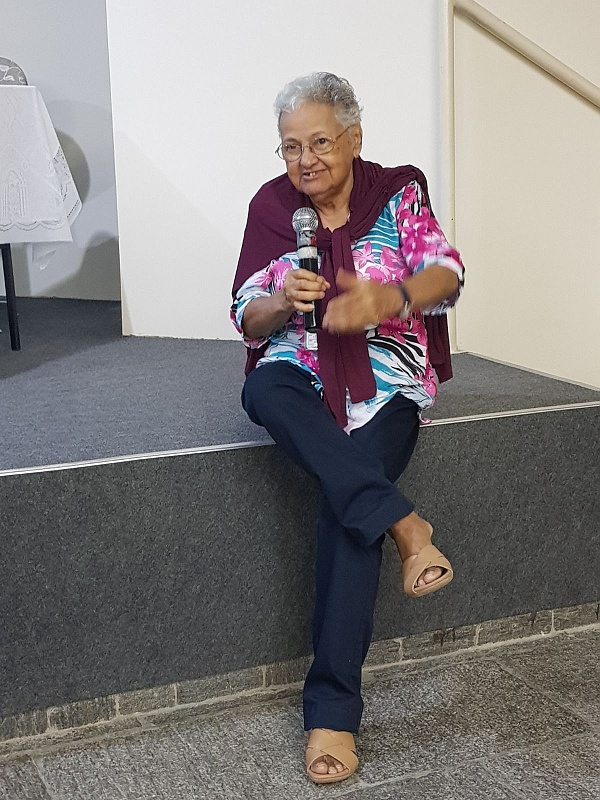
Vera Araujo
 One Brazilian student and social worker commented: “The summer school was a confirmation for me of the importance of interdisciplinary approaches. I’m a social worker in contact with suffering people who have had their human dignity taken away. A new understanding of what it means to be a human person generates new practices that can activate dormant aspects of human nature.” A professor from Recife: “Agape is not only a sociological concept, but crosses over into the fields of philosophy and metaphysics. I saw that love is at work in your group too. From this standpoint, a loving and generous dialogue has been started.” Giuseppe Pellegrini, from the University of Padua: “The encounter with the Latin American culture is always enriching. For me, it’s a way to know my own country better. The need of testing our categories and concepts, the ability to read the social reality and its changes were some of the most stimulating elements I found here. At a distance of thirty years from my first experience in Brazil, I felt the same vibrations, the same energy that animates this very diverse people in the ways of manifesting communitarian life. The effort put forth by so many people that live according to the ideal of Chiara Lubich has produced genuine and respectable fruits in Latin American life. Agapic behavior is one manifestation of mutual love, a generative and contagious element, both theoretical and practical, at a level that is capable of influencing social, cultural and political change.” The next step for Social-One will be a conference on the 7th and 8th of June at the Italian University of Salerno, Italy. The continuing dialogue with contemporary sociology, but also to host a “social” Expo of best practices of associations and institutes that work in the field of society.
One Brazilian student and social worker commented: “The summer school was a confirmation for me of the importance of interdisciplinary approaches. I’m a social worker in contact with suffering people who have had their human dignity taken away. A new understanding of what it means to be a human person generates new practices that can activate dormant aspects of human nature.” A professor from Recife: “Agape is not only a sociological concept, but crosses over into the fields of philosophy and metaphysics. I saw that love is at work in your group too. From this standpoint, a loving and generous dialogue has been started.” Giuseppe Pellegrini, from the University of Padua: “The encounter with the Latin American culture is always enriching. For me, it’s a way to know my own country better. The need of testing our categories and concepts, the ability to read the social reality and its changes were some of the most stimulating elements I found here. At a distance of thirty years from my first experience in Brazil, I felt the same vibrations, the same energy that animates this very diverse people in the ways of manifesting communitarian life. The effort put forth by so many people that live according to the ideal of Chiara Lubich has produced genuine and respectable fruits in Latin American life. Agapic behavior is one manifestation of mutual love, a generative and contagious element, both theoretical and practical, at a level that is capable of influencing social, cultural and political change.” The next step for Social-One will be a conference on the 7th and 8th of June at the Italian University of Salerno, Italy. The continuing dialogue with contemporary sociology, but also to host a “social” Expo of best practices of associations and institutes that work in the field of society.
9 Jan 2018 | Non categorizzato
On its 50th birth anniversary, the international Gen Verde band has recorded “TURN IT UP!” “It is an invitation,” they said, “to raise the volume of unity.” And this calls for a concrete, universal love that is able to take the initiative. This idea has toured the globe with the group, echoing in squares, schools and homes throughout the world. It has contaminated many and has become a life commitment. “As the year is about to end,”he artists added, “the idea has returned ’in a million hues’, sung by numberless voices, and danced with the fantasy of different peoples. And these 465 boys and girls from 31 cities of 21 countries in 5 continents are the protagonists of the video clip, ‘TURN IT UP!’ with their passion, enthusiasm and joy.” https://youtu.be/DKoodP6IYqg?t=40
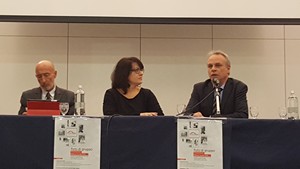
8 Jan 2018 | Focolare Worldwide
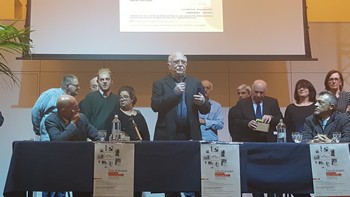 It was a very unique “group photo” taken during a public presentation of the social budget of the Tassano Group in the presence of some of the protagonists and authorities. Over time the Group was transformed from a cooperative into a consortium, and from a consortium into a group of consortia. It is complex and made up of different parts, currently comprised of 33 cooperatives that offer diversified services to 4,700 direct users and 100 thousand indirect users in the northwest region of Italy, which arrives from a brief stretch away at the sea and Mediterranean farmland all the way to the snow-covered mountains of winter. It involves 700 employees formed in the spirit of the economy of communion. “It’s an economic approach that the world doesn’t follow,” Luigino Bruni explained, “but it exists. Businesses who follow it try to destine profits in three directions: a part for creating jobs, a part for helping the poor, and a part for spreading this culture. The Tassano story is a love story made of employees and work that generated wealth and values.”
It was a very unique “group photo” taken during a public presentation of the social budget of the Tassano Group in the presence of some of the protagonists and authorities. Over time the Group was transformed from a cooperative into a consortium, and from a consortium into a group of consortia. It is complex and made up of different parts, currently comprised of 33 cooperatives that offer diversified services to 4,700 direct users and 100 thousand indirect users in the northwest region of Italy, which arrives from a brief stretch away at the sea and Mediterranean farmland all the way to the snow-covered mountains of winter. It involves 700 employees formed in the spirit of the economy of communion. “It’s an economic approach that the world doesn’t follow,” Luigino Bruni explained, “but it exists. Businesses who follow it try to destine profits in three directions: a part for creating jobs, a part for helping the poor, and a part for spreading this culture. The Tassano story is a love story made of employees and work that generated wealth and values.” 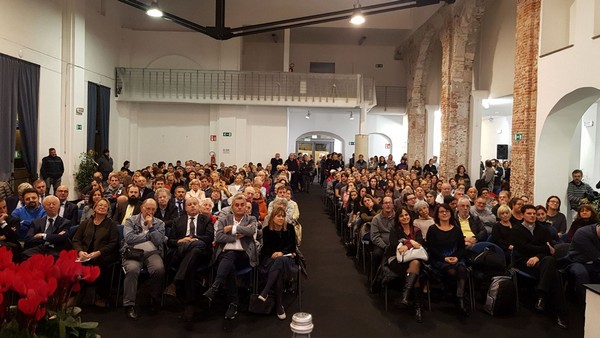 It’s a story that began a long time ago when, in 1989, two friends, small local businessmen, Gicaomo Linaro and Piero Cattani, together with 24 volunteer partners adherents to the Focolare Movement, started a cooperative to respond to the many cases of social poverty in the region. The cooperative grew and gradually won the trust of several interlocutors, including public ones, which led to the acquisition of new services. Two years later, the members of Tassano felt that their objectives were in perfect harmony with the Economy of Communion Project begun by Chiara Lubich in Brazil so that it spread solidarity at a global level. They joined the project at once. Little by little, the diversified growth of the different activities and the consequent growth of new specialized cooperatives gave rise to a Consortium of businesses that remain independent administratively, but are united in the experience, all operating with the same spirit in the social, educational and assistance field, with services geared towards the weakest strands of the population, elderly who are alone, the disabled, mentally ill, unemployed, but also families, children and young people, as well as a view towards the maintenance and appreciation of the region. In 1997, Tassano became a Group of Business Cooperatives, with the intent of unifying the difference business and social experiences that already existed, but also to act as an incubator of new production agencies. In the future, all the strategic areas will flow into consortia that will be able to consolidate growth and favour further development.
It’s a story that began a long time ago when, in 1989, two friends, small local businessmen, Gicaomo Linaro and Piero Cattani, together with 24 volunteer partners adherents to the Focolare Movement, started a cooperative to respond to the many cases of social poverty in the region. The cooperative grew and gradually won the trust of several interlocutors, including public ones, which led to the acquisition of new services. Two years later, the members of Tassano felt that their objectives were in perfect harmony with the Economy of Communion Project begun by Chiara Lubich in Brazil so that it spread solidarity at a global level. They joined the project at once. Little by little, the diversified growth of the different activities and the consequent growth of new specialized cooperatives gave rise to a Consortium of businesses that remain independent administratively, but are united in the experience, all operating with the same spirit in the social, educational and assistance field, with services geared towards the weakest strands of the population, elderly who are alone, the disabled, mentally ill, unemployed, but also families, children and young people, as well as a view towards the maintenance and appreciation of the region. In 1997, Tassano became a Group of Business Cooperatives, with the intent of unifying the difference business and social experiences that already existed, but also to act as an incubator of new production agencies. In the future, all the strategic areas will flow into consortia that will be able to consolidate growth and favour further development.  Maurizio Cantamessa, president of the Group, explains: “We’re quite a cohesive group, sharing the same values and understanding at the level of every day work. It was the right moment to group together, to consolidate and start again. The fact of being concentrated on the region is very important, because it favours relationships. We work side by side every day with local institutions every day. Being in the business of serving people, it’s important to be here in person. Business and solidarity together. Even with all the changes, the mission of the Group has always stayed the same: to promote a concept of business dealing geared towards the integral and solidarity promotion of the human person and of society, while not neglecting a strong orientation towards the market, through the individuation of objectives and business development plans that can lead to the creation of new businesses and new jobs. In demonstration of the fact that the values and ideas of the cooperative can be translated into concrete work actions in favour of the region and its citizens.
Maurizio Cantamessa, president of the Group, explains: “We’re quite a cohesive group, sharing the same values and understanding at the level of every day work. It was the right moment to group together, to consolidate and start again. The fact of being concentrated on the region is very important, because it favours relationships. We work side by side every day with local institutions every day. Being in the business of serving people, it’s important to be here in person. Business and solidarity together. Even with all the changes, the mission of the Group has always stayed the same: to promote a concept of business dealing geared towards the integral and solidarity promotion of the human person and of society, while not neglecting a strong orientation towards the market, through the individuation of objectives and business development plans that can lead to the creation of new businesses and new jobs. In demonstration of the fact that the values and ideas of the cooperative can be translated into concrete work actions in favour of the region and its citizens.
6 Jan 2018 | Non categorizzato
These three wise men from the East, the Magi who hurried across the desert in search of a small boy, prefigure the march of Christianity to rediscover its innocence. That small boy was a king, albeit a king without lodgings. But they went anyway, walking in by starlight, guided by a star. That is the miracle of the Christ, who forces people out from their fixed spots, peels away from their hearts the interests that turn them to stone, pushes them beyond the perceived boundaries of the sacred so as to have them recommence their search for unity among all people, in every circumstance. And so to his crib they come from every plague of prophet, Hebrew and Greek philosophes, art and literature, speculation and custom, stripping from themselves along the way whatever is particularly idolatrous and wrong, unreasonable and inhumane. And everything gathers around Christ, who is the reason for everything. The Magi brought perfume and treasure from the far reaches of Arabia and Mesopotamia: affects and effects. Love drew them out from far away to bring them close to Christ, who was the poor person par excellence and is forever to be found in the poor. That trek of the Magi represents the effort to draw near from every distance, to rise from the rubbish and with an offering of hearts and material goods, through the deserts of egoism, to arrive at unity with God, because “God became what we are so that we could become what God is,” as St Augustine would say: the one who descended so that others might ascend. But it’s a long trek, and it happens at night, amid trials and tribulations: Truth is never achieved without effort. God is a prize for those who put the effort into finding him: but whoever seeks finds. Igino Giordani, I Re magi, La Via n.97, January 6, 1951, p.4.
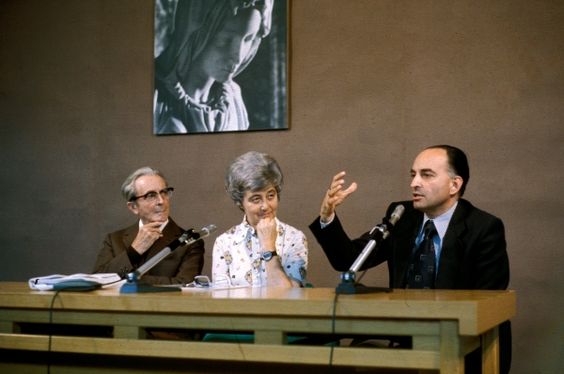
5 Jan 2018 | Non categorizzato
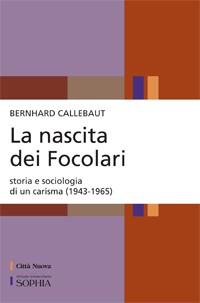 From a small city in northern Italy to five continents: an ample sociological dossier outlines the history of the Focolare, from its birth up to the definitive approval of the Church in 1965. It is a detailed reconstruction, encouraged by the founder of the Focolare herself already in the 1980s, and published for the first time in 2010 in a French edition, and lately translated into Italian by Città Nuova. Piero Coda, Rector of Sophia University Institute, introduces Callebaut’s study in the preface, with these words: “Up to today, there has never been an overall scientific approach to the history of the Focolare […] this current research for the first time constructs and institutes a historical and interpretative dossier of the important phenomenon represented by the Focolare Movement. […] The work is accurate, precise, and as thorough as can be […] exemplary and excellent under the historical profile.” Interviewed by Lorenzo Prezzi for settimananews.it, Bernhard Callebaut (Bruges, 1953) explained the sense of the book: ”I think that the purely testimonial narration, in which the person is strongly felt, is always valid. I think that a book like mine could cancel from my story the beneficial shock experienced in the reading of some pages of Lubich’s first (Meditations) pages that stimulated the actualisation of the messages they contained. On this premise, I think that at a second moment, we have to respect the need to understand, contextualize, link the phenomenon in itself to a previous story and gather some of the future prospects.” With studies in law, philosophy and sociology at the Catholic University of Lovanio, Bernhard Callebaut is currently a professor at Sophia University Institute in Florence, of which he is also Program Director of the Religions in a Global World research group.
From a small city in northern Italy to five continents: an ample sociological dossier outlines the history of the Focolare, from its birth up to the definitive approval of the Church in 1965. It is a detailed reconstruction, encouraged by the founder of the Focolare herself already in the 1980s, and published for the first time in 2010 in a French edition, and lately translated into Italian by Città Nuova. Piero Coda, Rector of Sophia University Institute, introduces Callebaut’s study in the preface, with these words: “Up to today, there has never been an overall scientific approach to the history of the Focolare […] this current research for the first time constructs and institutes a historical and interpretative dossier of the important phenomenon represented by the Focolare Movement. […] The work is accurate, precise, and as thorough as can be […] exemplary and excellent under the historical profile.” Interviewed by Lorenzo Prezzi for settimananews.it, Bernhard Callebaut (Bruges, 1953) explained the sense of the book: ”I think that the purely testimonial narration, in which the person is strongly felt, is always valid. I think that a book like mine could cancel from my story the beneficial shock experienced in the reading of some pages of Lubich’s first (Meditations) pages that stimulated the actualisation of the messages they contained. On this premise, I think that at a second moment, we have to respect the need to understand, contextualize, link the phenomenon in itself to a previous story and gather some of the future prospects.” With studies in law, philosophy and sociology at the Catholic University of Lovanio, Bernhard Callebaut is currently a professor at Sophia University Institute in Florence, of which he is also Program Director of the Religions in a Global World research group.  The first 20 years of the history of the Focolare are fathomed starting from the “enlightenments” of Chiara Lubich, which later became the core of her spirituality. “The charism is always granted to someone in particular, also here,” Callebaut explains. “Only after a certain time, Lubich realised that actually that gift had been bestowed on her and nobody else, at least, not in such a strong, limpid and overwhelming manner. But with time, she realized that also her first companions, who were sent elsewhere – first to Italy, then Europe and the continents – also became in some way, harbingers, multipliers of the charism, ’springs’ in turn. As of today – and in my book it is amply demonstrated – the core of Lubich’s charism is linked to having identified – as a gift – and later developed, and as never before in the two millenniums of Christian life, the meaning of that apex of the passion that constitutes the moment of that cry of abandonment of Man-God.” The history of the Focolare at the start of the story is made up also of a long and suffered wait for the formal recognition of the Church. “At the start of the 1950s the Holy Office examined the papers on the Focolare and initiated a series of meetings with the young founder. To put her and her followers to the test and measure their faithfulness to the Church, they asked her to take a step back, and no longer act as head of the Movement. Her followers would have never hidden who was really the soul of the Movement and there was no leadership crisis during those years, until Paul VI definitively resolved the issue. In 1965 Lubich signed her first letter as president of the Focolare. Today, after a certain time, we are beginning to see that behind her stature as a bearer of spirituality, there was also a rather unusual density of thought.” In more recent years, the charismatic intuition of the founder translates also into a series of concrete proposals as a contribution to the resolution of social and cultural issues. Some of these were Economy of Communion, “which actuates the preferential choice for the poor, and at the same time, values those who are able to contribute to economical life with the not common talent of entrepreneurship,” or the founding of the Sophia Institute, “as an interesting contribution to the debates and ordeals of contemporary thought.” Today, all the members of the Focolare, in some way bring ahead and multiply the charism of Chiara Lubich to fulfill the prayer of Jesus: ‘that all may be one’. And Callebaut concludes: “We need to continue working for some centuries more, it seems.”
The first 20 years of the history of the Focolare are fathomed starting from the “enlightenments” of Chiara Lubich, which later became the core of her spirituality. “The charism is always granted to someone in particular, also here,” Callebaut explains. “Only after a certain time, Lubich realised that actually that gift had been bestowed on her and nobody else, at least, not in such a strong, limpid and overwhelming manner. But with time, she realized that also her first companions, who were sent elsewhere – first to Italy, then Europe and the continents – also became in some way, harbingers, multipliers of the charism, ’springs’ in turn. As of today – and in my book it is amply demonstrated – the core of Lubich’s charism is linked to having identified – as a gift – and later developed, and as never before in the two millenniums of Christian life, the meaning of that apex of the passion that constitutes the moment of that cry of abandonment of Man-God.” The history of the Focolare at the start of the story is made up also of a long and suffered wait for the formal recognition of the Church. “At the start of the 1950s the Holy Office examined the papers on the Focolare and initiated a series of meetings with the young founder. To put her and her followers to the test and measure their faithfulness to the Church, they asked her to take a step back, and no longer act as head of the Movement. Her followers would have never hidden who was really the soul of the Movement and there was no leadership crisis during those years, until Paul VI definitively resolved the issue. In 1965 Lubich signed her first letter as president of the Focolare. Today, after a certain time, we are beginning to see that behind her stature as a bearer of spirituality, there was also a rather unusual density of thought.” In more recent years, the charismatic intuition of the founder translates also into a series of concrete proposals as a contribution to the resolution of social and cultural issues. Some of these were Economy of Communion, “which actuates the preferential choice for the poor, and at the same time, values those who are able to contribute to economical life with the not common talent of entrepreneurship,” or the founding of the Sophia Institute, “as an interesting contribution to the debates and ordeals of contemporary thought.” Today, all the members of the Focolare, in some way bring ahead and multiply the charism of Chiara Lubich to fulfill the prayer of Jesus: ‘that all may be one’. And Callebaut concludes: “We need to continue working for some centuries more, it seems.”
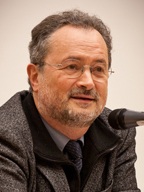 Callebaut Bernhard, Tradition, charisme et prophétie dans le Mouvement international des Focolari. Analyse sociologique, Paris, Nouvelle Cité, 2010, LXXXIII + 537 p. Italian translation La nascita dei Focolari. Storia e sociologia di un carisma (1943-1965), New City – Sophia, Rome 2017, p. 640. Entire interview by Lorenzo Prezzi
Callebaut Bernhard, Tradition, charisme et prophétie dans le Mouvement international des Focolari. Analyse sociologique, Paris, Nouvelle Cité, 2010, LXXXIII + 537 p. Italian translation La nascita dei Focolari. Storia e sociologia di un carisma (1943-1965), New City – Sophia, Rome 2017, p. 640. Entire interview by Lorenzo Prezzi
4 Jan 2018 | Non categorizzato
The Wrinkles of Disenchantment “After years of marriage I realized that the man living beside me was no longer the one I had gone head over heals for when I was young. But there were the children and life went on. One day a friend said to me: ‘I see you aging badly. Instead of growing in love, the wrinkles of disenchantment have grown.’ It was true, in place of loving and giving, I had insisted on being just and fair. I tried to change my attitude towards my husband and I discovered that he needed me more than ever. Things are different now. There’s a greater love flowing among all of us. (M.F. – Polond) The Pharmacy “The employees of the pharmacy I worked at before, were fired. All of them, except me. The new owners, however, were motivated more by self interest than the good of the customers. The atmosphere also changed quickly. For several months I did what I could to improve the relationships among employees and with customers. It was time well spent, during which I learned to be more merciful. Then, dismissal was also proposed for me. In spite of that, I trusted in providence, which didn’t disappoint: Unexpectedly another pharmacy offered me the position of another employee who had retired.” (C.T. – Hungary) My “Difficult” Patients “For several years now I’ve been working in an institute specializing in patients who are in a vegetable state, usually as a result of an accident. The process of recuperating from a coma is very complex and not even sure to happen. To the relatives who ask if their loved one will wake up, I usually answer that we can’t foresee what will happen, and that only God knows the future. We workers are only the instruments in His hands. It’s impossible to stay indifferent in front of such tragedies. At times my Christian faith has wavered. But I think that these “difficult” patients play an important social role: they gather people together and bring out the capacity of giving in them.” (Elio – Italy) Resurrection “Drugs and prostitution… For two years I stood by my friend, Mario, through his Calvary. He had drifted away from God, but respected the way I lived the faith. When he wound up in the hospital, I visited him faithfully. He asked: ‘Why do you do it? I come from a completely different world from yours!’ During his stay he had time to reflect, and one day he said: ‘I tried to convince myself that God didn’t exist, because it would have forced me to change the way I was living. But now I can’t go on like this anymore. You’re the only person I’m truly happy to have ever met. I would so much like to live like you.’ I suggested that he try to put the Gospel into practice one sentence at a time. I tried to do the same and it worked! Since he trusted me, he agreed to give it a try. It was hard for him to change the meaning of “love” in his mind, which for him meant to prostitute himself for money. It was a difficult journey, filled with failures and new beginnings. One day he went to the Sacrament of Confession. Afterwards he was radiant. Then there was the accident in which he lost his life. God was waiting for him there. But he was already prepared..” (S.V. – Switzerland)
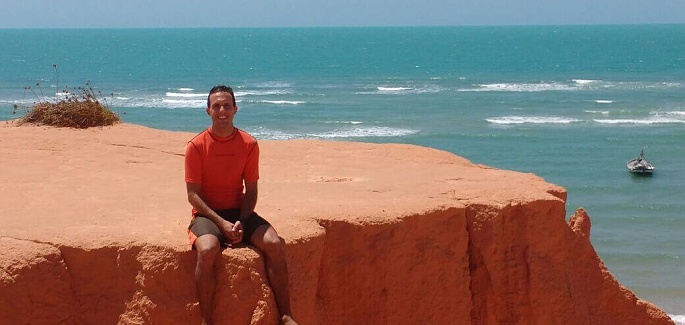
3 Jan 2018 | Focolare Worldwide
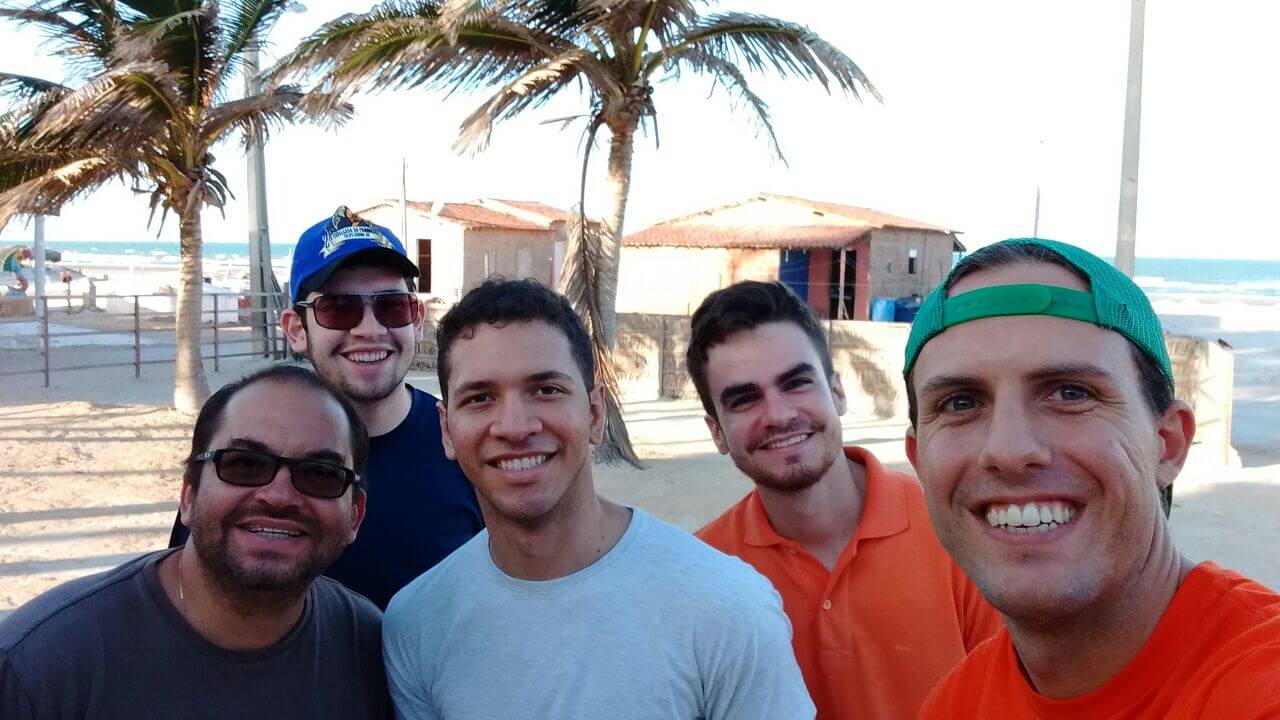 “Without giving it much thought, we had chosen the title together, “Building Bridges,” which could not have been more suitable: we couldn’t distinguish the youths of the wealthier districts from those of the poorer communities. The teams were composed of boys and girls from 10 to 18 altogether. The bigger kids took care of the smaller ones and the smaller ones enlivened the older ones. The participation of the poor communities did not imbue minimally an aspect of social assistance: all benefited from this interaction.” Renzo Megli, who had taken part right from the beginning in the organization of the Olympic games for kids, immediately laid down the foundations and success of the project, and described the preparatory activities with a passionate tone. “It seemed the winds were blowing against it. The idea of perfection and the memory of the “professional” or “semi-professional” sports fields of the previous editions deterred out spirits, blocked our minds, and saddened our thoughts. On the contrary, I was happy because of all the doors that closed on us and the slow and tiring change of direction: the only possibility that remained was to bring the Olympic games to the CEU, the Condominio Espiritual Uirapuru. We started to work on the project, determined to make the event a reality. But the conflicts remained evident; the compasses were still disoriented by old magnetic fields. Stop! We had to choose: shall we go ahead as one or stop? Would it be better to achieve something less perfect, but together, or something perfect in disunity? These will be different types of Olympic games, less professional, and perhaps less “trendy.” But perhaps it is precisely the breeze of the Spirit that is leading us to do something new, and different. We decided to go towards a common north. Even those who first were contrary have started to row in the same direction. Only then did I remember a conversation I had much earlier on with a focolarino who is older than me. He had given me this advice: “To lose an idea you must first possess it, and possibly, it must be really yours, as if it were your child, flesh of your flesh. Imagine a bottle of champagne: it must be full before you can remove its cap and let its bubbles flow.” That was how I felt, “father” to my idea, but ready to lose it. Each of us, upon “losing” our own idea, have become together, “parents” of a better idea, which has been polished along the way.
“Without giving it much thought, we had chosen the title together, “Building Bridges,” which could not have been more suitable: we couldn’t distinguish the youths of the wealthier districts from those of the poorer communities. The teams were composed of boys and girls from 10 to 18 altogether. The bigger kids took care of the smaller ones and the smaller ones enlivened the older ones. The participation of the poor communities did not imbue minimally an aspect of social assistance: all benefited from this interaction.” Renzo Megli, who had taken part right from the beginning in the organization of the Olympic games for kids, immediately laid down the foundations and success of the project, and described the preparatory activities with a passionate tone. “It seemed the winds were blowing against it. The idea of perfection and the memory of the “professional” or “semi-professional” sports fields of the previous editions deterred out spirits, blocked our minds, and saddened our thoughts. On the contrary, I was happy because of all the doors that closed on us and the slow and tiring change of direction: the only possibility that remained was to bring the Olympic games to the CEU, the Condominio Espiritual Uirapuru. We started to work on the project, determined to make the event a reality. But the conflicts remained evident; the compasses were still disoriented by old magnetic fields. Stop! We had to choose: shall we go ahead as one or stop? Would it be better to achieve something less perfect, but together, or something perfect in disunity? These will be different types of Olympic games, less professional, and perhaps less “trendy.” But perhaps it is precisely the breeze of the Spirit that is leading us to do something new, and different. We decided to go towards a common north. Even those who first were contrary have started to row in the same direction. Only then did I remember a conversation I had much earlier on with a focolarino who is older than me. He had given me this advice: “To lose an idea you must first possess it, and possibly, it must be really yours, as if it were your child, flesh of your flesh. Imagine a bottle of champagne: it must be full before you can remove its cap and let its bubbles flow.” That was how I felt, “father” to my idea, but ready to lose it. Each of us, upon “losing” our own idea, have become together, “parents” of a better idea, which has been polished along the way.  Renzo continued his story: “The CEU Director has promised space and the equipment. All the work we had performed up to then was based on this available place. But then the cancellation arrived: we could no longer use that facility. The “dynamics of losing” and of placing in God all our worries has become almost like a daily event that after a few moments of dismay we took this adversity as a clear sign of the spirit. Inviting the children of the CEU community was the most important thing, but time was flying and the enrollments proceeded slowly, leaving us with a lump in the throat: will we reach a minimum number of participants? We decided to open the enrollments also to those who cannot participate due to economic difficulties. We wanted to entrust ourselves to Providence. Many supporters popped up, and all the expenses, even the unforeseen, were covered. The smile of the numerous CEU children became the icon of our Olympics. An extraordinary joy was evident in all, animators, parents, and players. A child of one of the CEU communities said: “I found my father here.” This was a bigger boy who really had shown him love. Among the participants were also the girls of the Lar Santa Mônica community that hosts adolescent victims of domestic sexual abuse. They had become a bit surly and wanted to go home immediately. Instead they participated up to the end. We saw them leave happy. This transformation was one of the most beautiful victories of our Olympics.”
Renzo continued his story: “The CEU Director has promised space and the equipment. All the work we had performed up to then was based on this available place. But then the cancellation arrived: we could no longer use that facility. The “dynamics of losing” and of placing in God all our worries has become almost like a daily event that after a few moments of dismay we took this adversity as a clear sign of the spirit. Inviting the children of the CEU community was the most important thing, but time was flying and the enrollments proceeded slowly, leaving us with a lump in the throat: will we reach a minimum number of participants? We decided to open the enrollments also to those who cannot participate due to economic difficulties. We wanted to entrust ourselves to Providence. Many supporters popped up, and all the expenses, even the unforeseen, were covered. The smile of the numerous CEU children became the icon of our Olympics. An extraordinary joy was evident in all, animators, parents, and players. A child of one of the CEU communities said: “I found my father here.” This was a bigger boy who really had shown him love. Among the participants were also the girls of the Lar Santa Mônica community that hosts adolescent victims of domestic sexual abuse. They had become a bit surly and wanted to go home immediately. Instead they participated up to the end. We saw them leave happy. This transformation was one of the most beautiful victories of our Olympics.”

2 Jan 2018 | Non categorizzato
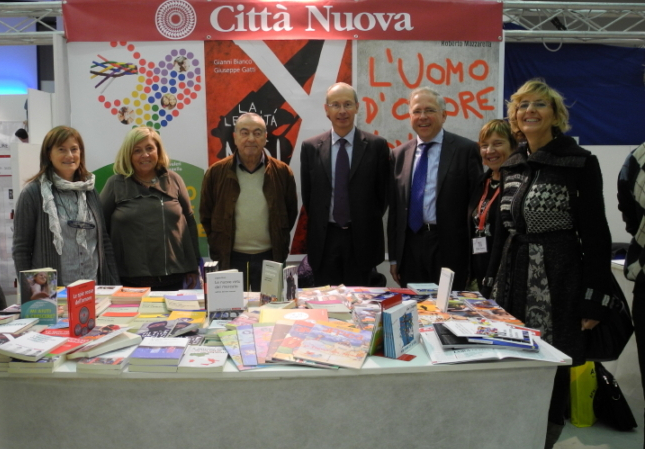 Pisa is known all over the world for its Square of Miracles, UNESCO World Heritage Centre, where the Leaning Tower of Pizza is located. Every year since 2003 the Pisa Book Festival is held in that Tuscan city at the national book show which gathers publishers, writers, translators, illustrators, Italian and foreign artists. It is an ideal setting for sharing ideas, innovative proposals, quality books and magazines, but also writing workshops, seminars, readings and shows. Città Nuova was there again this year with the support of the local Focolare community. “This is fifth year that we have taken part in Pisabook, a truly special edition because of the variety of presentations and the people involved,” explain Rita and Francesco. “For the first time we got to run the workshop in the Junior section where we worked and played with ‘BIG’ and ‘feelings’.”
Pisa is known all over the world for its Square of Miracles, UNESCO World Heritage Centre, where the Leaning Tower of Pizza is located. Every year since 2003 the Pisa Book Festival is held in that Tuscan city at the national book show which gathers publishers, writers, translators, illustrators, Italian and foreign artists. It is an ideal setting for sharing ideas, innovative proposals, quality books and magazines, but also writing workshops, seminars, readings and shows. Città Nuova was there again this year with the support of the local Focolare community. “This is fifth year that we have taken part in Pisabook, a truly special edition because of the variety of presentations and the people involved,” explain Rita and Francesco. “For the first time we got to run the workshop in the Junior section where we worked and played with ‘BIG’ and ‘feelings’.” 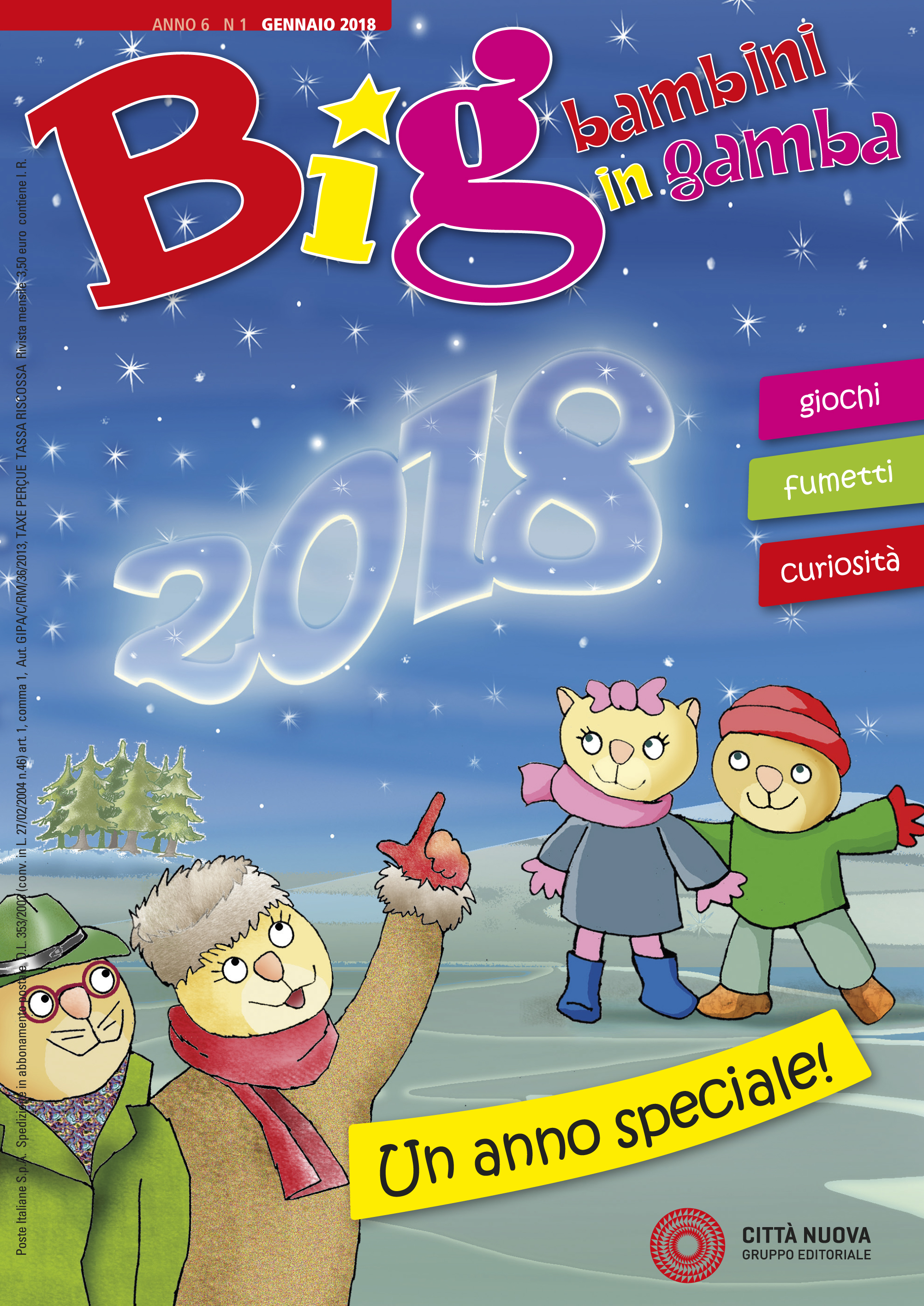 BIG is an Italian monthly children magazine published by Città Nuova. Among the new offerings was a kit that would help teachers discuss the topic of feelings, such as fear, disgust, anger, sadness and happines with children up to ten years old. “During the festival we visited a school on the outskirts of the city where it would be possible to accompany the children in Pisabook’s main office. They were all invited to help promote BIG and now the teachers want to subscribe to the magazine.” Among Città Nuova’s offerings in the Hall was an autobiography of Salvatore Striano, a story of redemption and transformation – from a drug dealer in a suburban criminal district of southern Italy to a writer and actor. In between, ten years of jail time in Madrid and Rome. It is story of salvation through books and the theatre, but mostly through meeting the right people at the right time. In his autobiographic novel, Giù le maschere, (Città Nuova, 2017), a group of disadvantaged and rebellious teenagers from a halfway home discovers a love for theatre and finds on the stage, a road to salvation and redemption. It is a deep story that teaches to look at life, every life, especially the lives of vulnerable youth, with eyes of hope. “During the three presentations of the book and the breaks,” Rita and Francesco explain, “a feeling was created among everyone: Striano opened up and talked about his troubled life. He was particularly impressed by the young people who were there, whom he invited as personal guests to his show in Naples. At the end he remarked: If my friends in prison could see your eyes, your smiles … they would change their lives.” The author had a deep discussion with the teens from the school who had prepared for the event by reading his book. The discussion seemed to have “removed the distances, making everyone feel like they were at home in their living-room.” Now the students are involved in a school project inside several prisons. “Seeing so many people moving to the booth and not going away made Salvatore say that he had never had a similar experience before and that he wants to write more books with Città Nuova. “Lucia Della Porta, creator and director of Pisabook, couldn’t stop thanking us for our contribution to the success of the event! But we thanked her for putting so much trust in us. Many people passed by our booth, we made many contacts and tried to give our testimony. It was also a financial success.” The local Focolare community concluded: Città Nuova is even more ours.
BIG is an Italian monthly children magazine published by Città Nuova. Among the new offerings was a kit that would help teachers discuss the topic of feelings, such as fear, disgust, anger, sadness and happines with children up to ten years old. “During the festival we visited a school on the outskirts of the city where it would be possible to accompany the children in Pisabook’s main office. They were all invited to help promote BIG and now the teachers want to subscribe to the magazine.” Among Città Nuova’s offerings in the Hall was an autobiography of Salvatore Striano, a story of redemption and transformation – from a drug dealer in a suburban criminal district of southern Italy to a writer and actor. In between, ten years of jail time in Madrid and Rome. It is story of salvation through books and the theatre, but mostly through meeting the right people at the right time. In his autobiographic novel, Giù le maschere, (Città Nuova, 2017), a group of disadvantaged and rebellious teenagers from a halfway home discovers a love for theatre and finds on the stage, a road to salvation and redemption. It is a deep story that teaches to look at life, every life, especially the lives of vulnerable youth, with eyes of hope. “During the three presentations of the book and the breaks,” Rita and Francesco explain, “a feeling was created among everyone: Striano opened up and talked about his troubled life. He was particularly impressed by the young people who were there, whom he invited as personal guests to his show in Naples. At the end he remarked: If my friends in prison could see your eyes, your smiles … they would change their lives.” The author had a deep discussion with the teens from the school who had prepared for the event by reading his book. The discussion seemed to have “removed the distances, making everyone feel like they were at home in their living-room.” Now the students are involved in a school project inside several prisons. “Seeing so many people moving to the booth and not going away made Salvatore say that he had never had a similar experience before and that he wants to write more books with Città Nuova. “Lucia Della Porta, creator and director of Pisabook, couldn’t stop thanking us for our contribution to the success of the event! But we thanked her for putting so much trust in us. Many people passed by our booth, we made many contacts and tried to give our testimony. It was also a financial success.” The local Focolare community concluded: Città Nuova is even more ours.
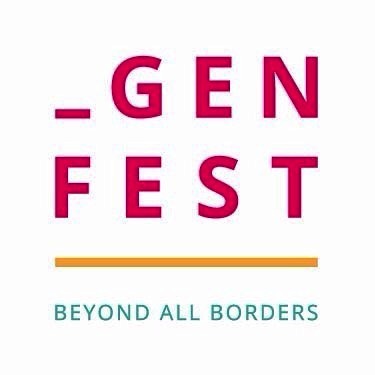
1 Jan 2018 | Non categorizzato
 The title BEYOND ALL BORDERS intends to highlight the boundaries that need to be overcome at personal and social levels. It was chosen with the purpose of opening the minds and hearts of the participants in the Genfest. This eleventh edition aims to inspire participants to feel capable of building a happier and a united world. To breathe, love, work and live with concern for everyone. This is why the Genfest values artistic manifestations, music, dances, expositions, forums, etc., to enable everyone to think differently and to transform life into something more beautiful.
The title BEYOND ALL BORDERS intends to highlight the boundaries that need to be overcome at personal and social levels. It was chosen with the purpose of opening the minds and hearts of the participants in the Genfest. This eleventh edition aims to inspire participants to feel capable of building a happier and a united world. To breathe, love, work and live with concern for everyone. This is why the Genfest values artistic manifestations, music, dances, expositions, forums, etc., to enable everyone to think differently and to transform life into something more beautiful.
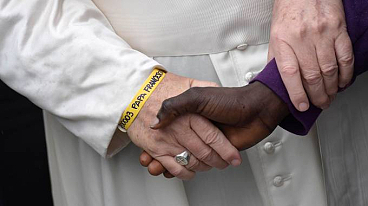
1 Jan 2018 | Non categorizzato
 “Men and women, children, young people and the elderly seek a place where they can live in peace. To find it, many of them are willing to risk their lives on a journey that in most cases is long and dangerous, to undergo suffering and hardship, to come face to face with barbed wire and walls that are raised to keep them far from their goal.” On the first day of the New Year, Pope Francis’s greetings are extended especially to the 250 million immigrants, 22 and a half million of whom are refugees. His message is filled with proposals, which are offered to the international community for its analysis and study. Why are there so many refugees and immigrants in the world? Francis recalls: “Saint John Paul II pointed to the growing number of refugees among the consequences of the interminable and horrendous series of conflicts, genocide and “ethnic cleansing” that marked the twentieth century. The new century wasn’t a real turning point. Armed conflicts and other forms of organized violence continue to provoke movements of populations within national confines and beyond. But people migrate for other reasons as well; primarily for a better life.” Those who foment fear in the face of global migrations – perhaps for political reasons rather than building peace – sow violence. “Instead,” the Pope says, “I invite you to see them as opportunities for building a future of peace.” Migrants and refugees never come empty-handed. They “come loaded with courage, abilities, energy and aspirations besides the treasures of their own cultures. In this way they enrich the life of the nations that receive them.” In his usual style, Francis doesn’t limit himself to a list of generic “guidelines,” but presents a complex strategy, comprised of four actions: receive, protect, promote and integrate. Accept primarily means “expand ways of legal entry, do not turn them back to places where persecution and violence awaits them, and balance concern for national security with the protection of basic human fundamental rights.” Regarding protection, Francis recommends that, in respect for the dignity of the person, migrants and refugees should be allowed freedom of movement, opportunities for employment and, in particular, the prevention of exploitation of women and children, “the ones who are most exposed to the risks and abuses.” Promotion stands for the promotion and support of “integral human development.” Among the many tools, he underscores “the importance of ensuring access to education for children and young people at every level of instruction. In that way they will not only cultivate and bring to fruition their own skills, but will also be better able to reach out to others and cultivate a spirit of dialogue instead of evasiveness or confrontation.” Integration is not synonymous with assimilation, the complete sacrifice of one roots and loss of identity; on the contrary, it represents “allowing the refugee and immigrant to take full share in the life of the society that receives them, in a dynamic of mutual enrichment and fruitful collaboration in the promotion of the integral human development of the local communities.” The message contains a clear call to the leaders of States of the whole world. Pope Francis looks forward in 2018, to the global double accord in favour of secure, orderly and lawful migrations that ensure the protection of refugees, inspired “by compassion, long=sightedness and courage, in order to seize every opportunity to advance the construction of peace. Only in this way will the necessary realism of international politics not become surrender to cynicism and global indifference.” Recalling the words of St John Paul II, Pope Francis intends to entrust a message of new hope to the world, even in difficult times: “If the ‘dream’ of a world at peace is shared by many, and the contribution of migrants and refugees is acknowledged, the human race can more and more become a common home.” Read message
“Men and women, children, young people and the elderly seek a place where they can live in peace. To find it, many of them are willing to risk their lives on a journey that in most cases is long and dangerous, to undergo suffering and hardship, to come face to face with barbed wire and walls that are raised to keep them far from their goal.” On the first day of the New Year, Pope Francis’s greetings are extended especially to the 250 million immigrants, 22 and a half million of whom are refugees. His message is filled with proposals, which are offered to the international community for its analysis and study. Why are there so many refugees and immigrants in the world? Francis recalls: “Saint John Paul II pointed to the growing number of refugees among the consequences of the interminable and horrendous series of conflicts, genocide and “ethnic cleansing” that marked the twentieth century. The new century wasn’t a real turning point. Armed conflicts and other forms of organized violence continue to provoke movements of populations within national confines and beyond. But people migrate for other reasons as well; primarily for a better life.” Those who foment fear in the face of global migrations – perhaps for political reasons rather than building peace – sow violence. “Instead,” the Pope says, “I invite you to see them as opportunities for building a future of peace.” Migrants and refugees never come empty-handed. They “come loaded with courage, abilities, energy and aspirations besides the treasures of their own cultures. In this way they enrich the life of the nations that receive them.” In his usual style, Francis doesn’t limit himself to a list of generic “guidelines,” but presents a complex strategy, comprised of four actions: receive, protect, promote and integrate. Accept primarily means “expand ways of legal entry, do not turn them back to places where persecution and violence awaits them, and balance concern for national security with the protection of basic human fundamental rights.” Regarding protection, Francis recommends that, in respect for the dignity of the person, migrants and refugees should be allowed freedom of movement, opportunities for employment and, in particular, the prevention of exploitation of women and children, “the ones who are most exposed to the risks and abuses.” Promotion stands for the promotion and support of “integral human development.” Among the many tools, he underscores “the importance of ensuring access to education for children and young people at every level of instruction. In that way they will not only cultivate and bring to fruition their own skills, but will also be better able to reach out to others and cultivate a spirit of dialogue instead of evasiveness or confrontation.” Integration is not synonymous with assimilation, the complete sacrifice of one roots and loss of identity; on the contrary, it represents “allowing the refugee and immigrant to take full share in the life of the society that receives them, in a dynamic of mutual enrichment and fruitful collaboration in the promotion of the integral human development of the local communities.” The message contains a clear call to the leaders of States of the whole world. Pope Francis looks forward in 2018, to the global double accord in favour of secure, orderly and lawful migrations that ensure the protection of refugees, inspired “by compassion, long=sightedness and courage, in order to seize every opportunity to advance the construction of peace. Only in this way will the necessary realism of international politics not become surrender to cynicism and global indifference.” Recalling the words of St John Paul II, Pope Francis intends to entrust a message of new hope to the world, even in difficult times: “If the ‘dream’ of a world at peace is shared by many, and the contribution of migrants and refugees is acknowledged, the human race can more and more become a common home.” Read message

30 Dec 2017 | Non categorizzato
 It seems to me that in order to give back to the family its true countenance, in order to restore its splendour, instead of focusing on discussions and directives (…) it’s worth pondering on that luminous and universal example that Eternal Wisdom devised: the family of Nazareth. All present and future families the world over can look to it as a model. And not just families: the individual components of this model can inspire us to know what behaviours and attitudes we should adopt, the relationships and virtues we should cultivate. Every man on earth who is husband and father can always find in Joseph, the Spouse of Mary, the considered father of Jesus, a light, an encouragement, a source of inspiration. In him, one can emulate the same faithfulness in all trials, heroic chastity, strength, silent activity, respect, veneration, protection for the mother of his children, participation in family concerns … And every woman, who is wife and mother, can discover in Mary her own potential, equality with man and her own identity. She can see fulfilled in the Bride of Joseph the desire to also be a protagonist; she can understand how to go beyond the family circle to spread, for the good of many, the riches that are her own: self-sacrifice, the inner strength that gives her confidence, the religious life that distinguishes her from others, the innate need to rise above her situation and to elevate others, radiating light, purity and beauty. Similarly the children will find in Jesus, the son of Mary and Joseph, who together compose a marvellous unity, the two troubling challenges: the need to establish themselves as a generation which can launch a new chapter in history, and the desire to find refuge in their loved ones through love and in obedience. Yes, may the Holy Family, the jewel of humanity it is associated with, which reflects the life of the Trinity, where love generates one God, be before us today, may it stay with us all (…) for the good of the family in the world, of the family in the Church and for the glory of God. From: Chiara Lubich – Messagge to FamilyFest 1981
It seems to me that in order to give back to the family its true countenance, in order to restore its splendour, instead of focusing on discussions and directives (…) it’s worth pondering on that luminous and universal example that Eternal Wisdom devised: the family of Nazareth. All present and future families the world over can look to it as a model. And not just families: the individual components of this model can inspire us to know what behaviours and attitudes we should adopt, the relationships and virtues we should cultivate. Every man on earth who is husband and father can always find in Joseph, the Spouse of Mary, the considered father of Jesus, a light, an encouragement, a source of inspiration. In him, one can emulate the same faithfulness in all trials, heroic chastity, strength, silent activity, respect, veneration, protection for the mother of his children, participation in family concerns … And every woman, who is wife and mother, can discover in Mary her own potential, equality with man and her own identity. She can see fulfilled in the Bride of Joseph the desire to also be a protagonist; she can understand how to go beyond the family circle to spread, for the good of many, the riches that are her own: self-sacrifice, the inner strength that gives her confidence, the religious life that distinguishes her from others, the innate need to rise above her situation and to elevate others, radiating light, purity and beauty. Similarly the children will find in Jesus, the son of Mary and Joseph, who together compose a marvellous unity, the two troubling challenges: the need to establish themselves as a generation which can launch a new chapter in history, and the desire to find refuge in their loved ones through love and in obedience. Yes, may the Holy Family, the jewel of humanity it is associated with, which reflects the life of the Trinity, where love generates one God, be before us today, may it stay with us all (…) for the good of the family in the world, of the family in the Church and for the glory of God. From: Chiara Lubich – Messagge to FamilyFest 1981
29 Dec 2017 | Focolare Worldwide
“If it hadn’t been for a group of friends – teachers at a school for street children – I would never have known about this side of my city: the poor. And yet, Saigon – or as they now call it – Ho Chi Minh City, also has it: poverty, disadvantage and suffering. On Christmas and all the big holidays some people like to go out for walks, perhaps around some of the famous breweries, to look for some poor, or better, very poor families who live in stinking rat-infested slums. I thought I had seen all the poverty in Thailand among the Karen refugees and migrants from the mountains in the North, as well as along the dirty canals of Bangkok. But what I saw today in Saigon, in the ‘Milan of Vietnam,’ I had never even imagined. Small rooms with twelve people living inside them, along with three dogs perhaps. I become so nauseous in such places that I could hardly force myself to stay there. But then, the faces of the children lit up, the intense gazes of the mothers looked at us and seemed to say ‘thank you’ when we placed in front of them a sack with 5kg of rice in it. That gaze was all the thanks we needed, along with a will to live and the joy to dry ourselves off after such a drenching rain. And then there are Nativity Scenes in Saigon and Christmas stars over the homes of many families. Some alleyways are lit up, which gives a bit of warmth to the city which is by no means cold, impersonal and indifferent – nor even atheist. You notice the stars and Nativity Scenes, because they’re everywhere and appear on many street corners: they take you by surprise. The ones I found most striking were the ones in the public markets, at night, almost covered under the day’s trash; or else, the ones that were lost along the outskirts of the market, but illuminated by two huge Manger Scenes set up right on the road. Then, on the tops of the houses, at night, there are the fluorescent stars that blink off and on. Returning home tonight, after the visit to the poor, I looked at this scene that had filled me with such a feeling of gratitude: even though far from home, I wasn’t at all missing the real sense of Christmas. Last year Pope Francis said that ‘Christmas is the feast day of weakness, because it celebrates a child, the symbol of fragility, smallness, humility and love.’ Today I understood those words a little more. This night that I now leave behind because it’s already morning, was illumined by the love that I saw among the people that went to help, to lift up, to show their closeness with those who suffer. Once again, the cultural darkness in which we live is illuminated by these living Nativity Scenes, by people who have made that Boy the reason for their lives. And I realized that the real message of Christmas hasn’t died. It’s message of love, tenderness and understanding is alive and I saw it. It was all there in that gesture of taking a small disabled three-year-old and hugging him as close as possible. And that little boy let himself be raised up by that face that unknown face. All the technology of present and future robots, the commercial frontier that everyone is talking about in Asia, will never be able do this miracle: love. Because love is free. Love is never a duty, and nobody can program it or order it. It’s a gift that comes from inside. I saw faces brighten and believe that life, tomorrow morning, will go forward and be more beautiful than yesterday. I don’t miss my Europe this Christmas. Because wherever there is love, there is also my home. Saigon is also my home.”
28 Dec 2017 | Non categorizzato, Word of
The word of life for this month comes from a verse in the Song of Moses, part of the Old Testament in which the Israelites exalt God’s intervention in their history. The song proclaims God’s decisive action for the salvation of this people, on the long journey from their liberation from slavery in Egypt to their arrival in the Promised Land. Although the Israelites encountered difficulties and sufferings on the way, this all happened under the steadfast guidance of God and through the collaboration of men like Moses and Joshua, who put themselves at the service of God’s plan of salvation. “Your right hand, O Lord, glorious in power.” When we think of power, we can easily associate it with the power of might that is often the cause of oppression and conflict among people and nations. Instead, God’s word reveals to us that true power is love, as was manifested in Jesus. He went through all human experience, until death, to open for us the path to freedom and to our encounter with the Father. Thanks to him, God’s powerful love for humankind was revealed. “Your right hand, O Lord, glorious in power.” If we look at ourselves, we have to admit frankly that we are limited. Human fragility, in all its aspects — physical, moral, psychological and social — is a reality we cannot deny. However, it is actually there, in our limitations, that we can experience God’s love. In fact, he wants happiness for all people, who are his children. He is always ready to help those who put themselves humbly in his hands for the sake of the common good, peace and fraternity. This text is a wise choice for this month’s celebration of the Week of Prayer for Christian Unity, considering how much suffering we have inflicted on one another down through the centuries, creating divisions and sowing suspicion, dividing communities and families. “Your right hand, O Lord, glorious in power.” Through prayer, we need to ask the grace of unity, as a gift from God. At the same time, we can build bridges by offering ourselves as instruments of God’s love. During an event held at the World Council of Churches in Geneva in 2002, Chiara Lubich was invited to share her thoughts and experience. “Dialogue is carried out first by putting ourselves on the same level as our partner, whoever he or she may be,” she said. “Then we listen to our dialogue partner, being completely empty of ourselves … This enables us to receive the other person within ourselves and to understand him or her … Because they have been listened to with love, they are ready to listen to what we have to say.” This month, let us take advantage of our day-to-day contacts, to deepen or reestablish relationships of esteem and friendship with individuals, families or groups who belong to other Christian churches. Moreover, why not extend our prayer and action to the divisions within our own ecclesial community, or to those in politics, in civil society or in families? We too can witness with joy to “your right hand, O Lord, glorious in power.” Letizia Magri
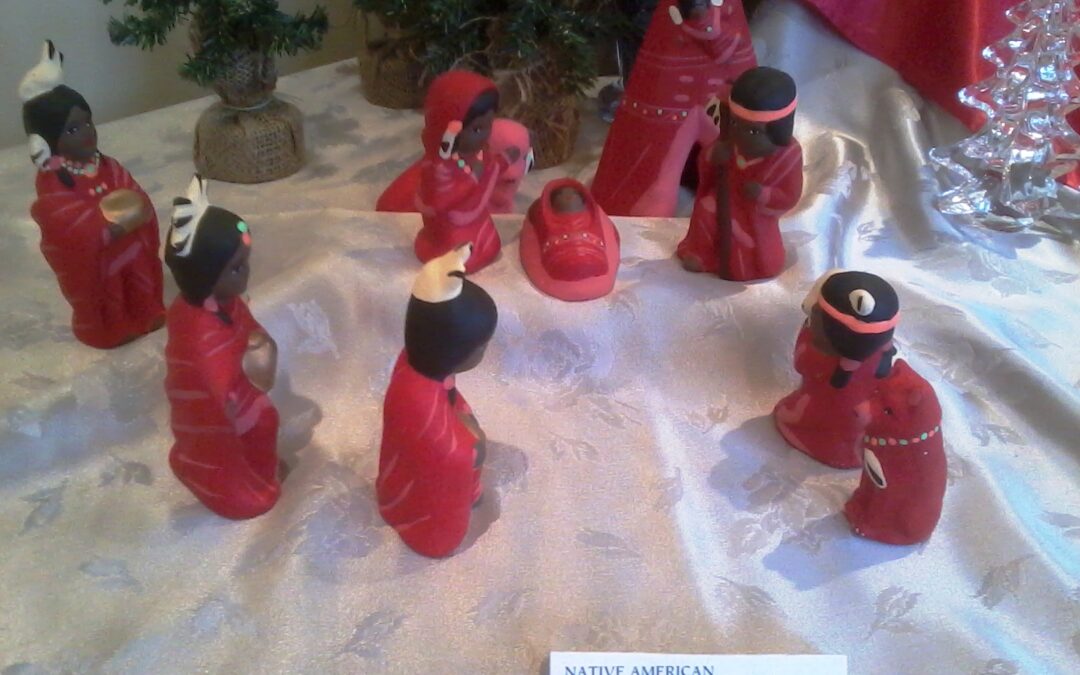
28 Dec 2017 | Non categorizzato
In the summer of 1962, Chiara Lubich had the first insight of what the “towns” or the “permanent Mariapolis” would be today. “It was in Einsedeln (Switzerland) that I saw, upon viewing from the top of a hill, the basilica and its surroundings, that in the Movement there would be a city one day, which would not be formed by an abbey or hotels, but by houses, work places, and schools like a common city,” Chiara wrote in her diary (March 1967).
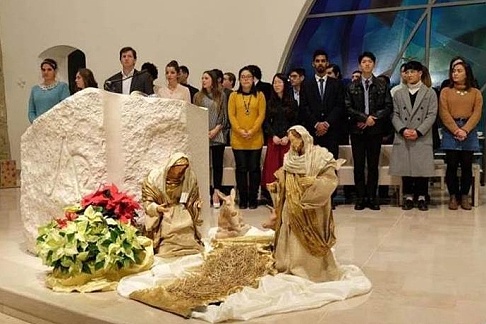
Christmas in Loppiano
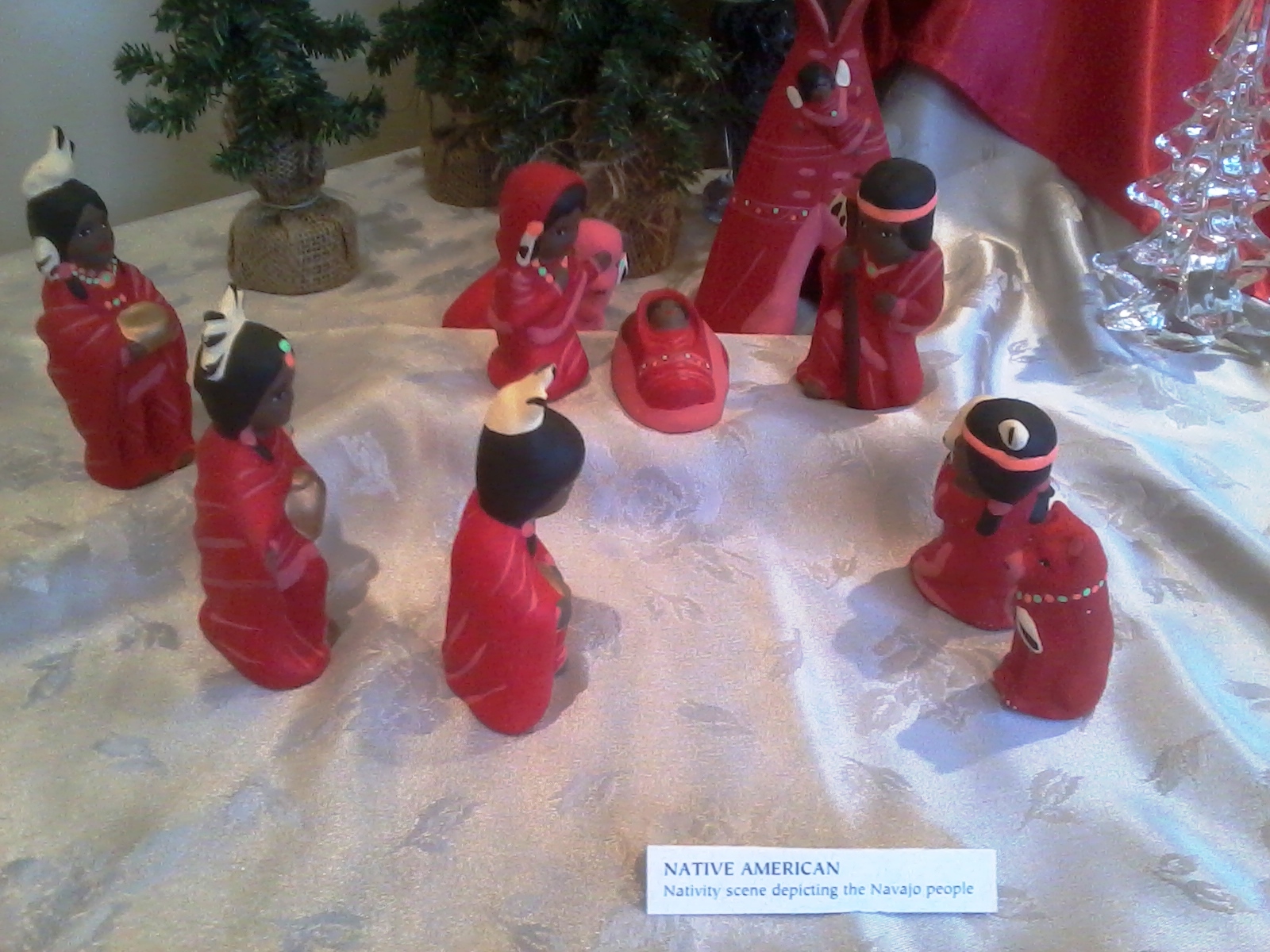
Crib display at Mariapolis Luminosa
27 Dec 2017 | Non categorizzato
26 Dec 2017 | Non categorizzato
“Christian doesn’t have any religious meaning in my family, even though we always eat together on the evening of December 24th. But this year everything will be different for me. I celebrated my first real Christmas! “Giselle, I’ll introduce you to some girls who live the Gospel in Santiago,” a friend told me last month. Through them – the Gen – I got to know Jesus and that encounter changed my life. I even received a Christmas Crib as a gift and it became a part of my house for the first time. I knew I still would be able to celebrate Christmas as I would have liked, because most of my parents still think like before. But, this year, I wanted to do something different. I spent Christmas Eve preparing supper like every year, but unlike other years I went to Mass with some friends after supper. In spite of all the cooking and preparing, nobody showed up for supper. At first I felt really bad and even thought they had perhaps done it on purpose to make fun of me. But then a thought came to me: What is important for me don’t necessarily have to be important to others; on the contrary, it was obvious that it wasn’t! How much I would liked to share with my relatives the joy of Jesus’s birth! Before supper, I silently recited Grace before meals. It was my first Christmas supper. Then I went to Mass. I thought perhaps they weren’t ready yet, and perhaps they never would be. But I wanted to do all I could so that they might also receive the gift I received, which changed my life: getting to know Jesus. It’s what I want the most for the people I love. One time at home, when everybody had already gone to bed, I wrapped some small presents, just little things, to surprise my relatives. I placed them under the tree with a note that said: “Happy Christmas! Follow the arrow and find your present.” My father woke up at five thirty, my father was the first to wake up and notice the note. So he woke up my mother. Around nine they woke me up, and my very strong brother carried me in his arms to the living room. I couldn’t wait any longer from the joy to wrap a present for me too! I was very touched. It was beautiful to see what Love does, even in those who don’t how to call it by name. Christmas still doesn’t have any meaning for my family, but they felt all the love I left for them under the tree. And there’s no one who can resist against Love.”
25 Dec 2017 | Non categorizzato
It was in the plans of Providence that the Word become flesh, that a word, the Word, be written on earth in flesh and blood; and this Word needed a background. Out of love for us, the heavenly harmonies longed to transfer their peerless concert within our tents; and so they needed a silence. The Protagonist of all humanity, who gave meaning to centuries past, and enlightened and drew after him the centuries to come, had to appear on this world’s stage, but he needed a white background to make him alone stand out. The greatest design that Love-God could invent, had to be drawn, majestic and divine and all the colours of virtue had to be found gathered in a heart ready to serve him. This wondrous shade that contains the sun, losing and finding itself therein; this white background almost an immense abyss that contains the Word which is Christ immersing itself in him, light in the Light; this lofty silence that is silent no more, for within it sing the Word’s divine harmonies and in him becomes the note of notes, almost setting the tone for heaven’s endless song; this majestic scene, as fair as nature, summarising the beauty lavished by the Creator throughout the universe, this little universe for the Son of God, which is seen no more because it yields its interests and its parts to the One who was to come, and has come, for what he had to do, and did; this rainbow of virtue that says “peace” to the whole world because Peace it has given the world; this creature, first thought of in the mysterious depths of the Trinity, and given to us, was Mary. Cf Chiara Lubich Mary, The Transparency of God, New City London 2003 p11-13
23 Dec 2017 | Non categorizzato
A child who gets lost winds up in a place that’s not home. Yes, at Christmas time God got lost – not only like a boy child, but as a child – in a place where he was no longer at home. He didn’t remain within the enclosed happiness of Heaven, or within the confines of our devotional space. He got lost for the little ones and the poor, for those who are sick and in mourning, for sinners, for those we consider far from God, those we think have nothing to do with God. God got lost right where the prodigal son got lost – far from his father’s home – so he could return to the Father in him and with him. God got lost as a child not by mistake, but by the most divine gesture God could make. God is the God of all, or else he isn’t God. God is the God of the little ones and the ones far off, or else he isn’t God. “Let yourself be found where you, God, were lost as a child. Yes, let us become a child in whom you lose yourself for others, for everybody!” Klaus Hemmerle. La luce dentro le cose (Rome: Città Nuova, 1998) 395.
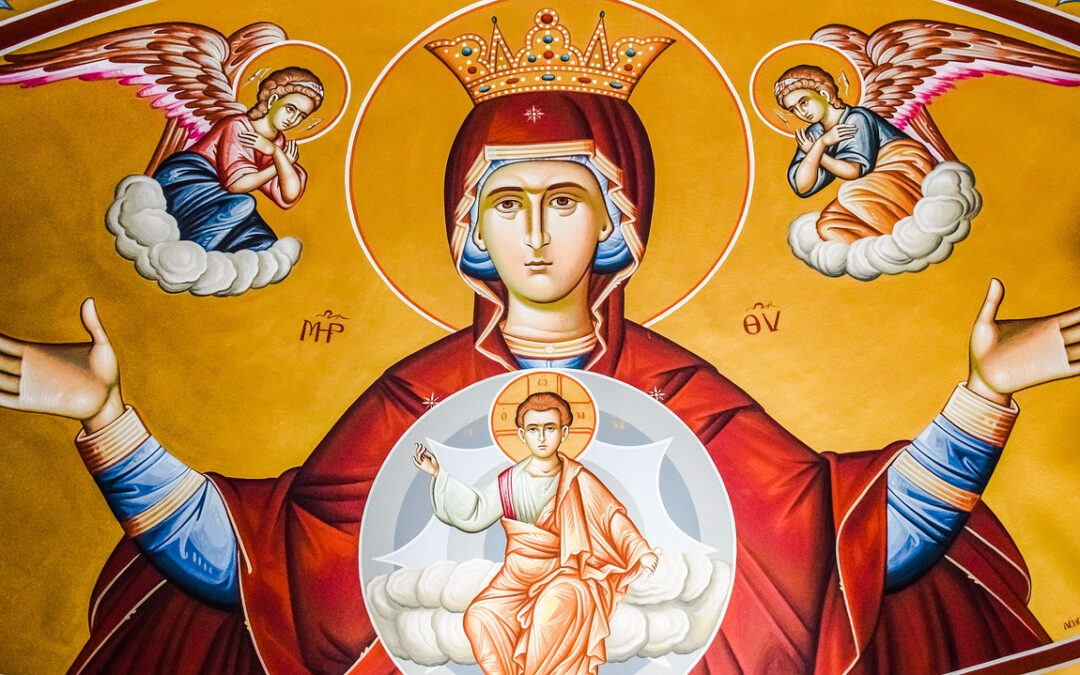
22 Dec 2017 | Non categorizzato
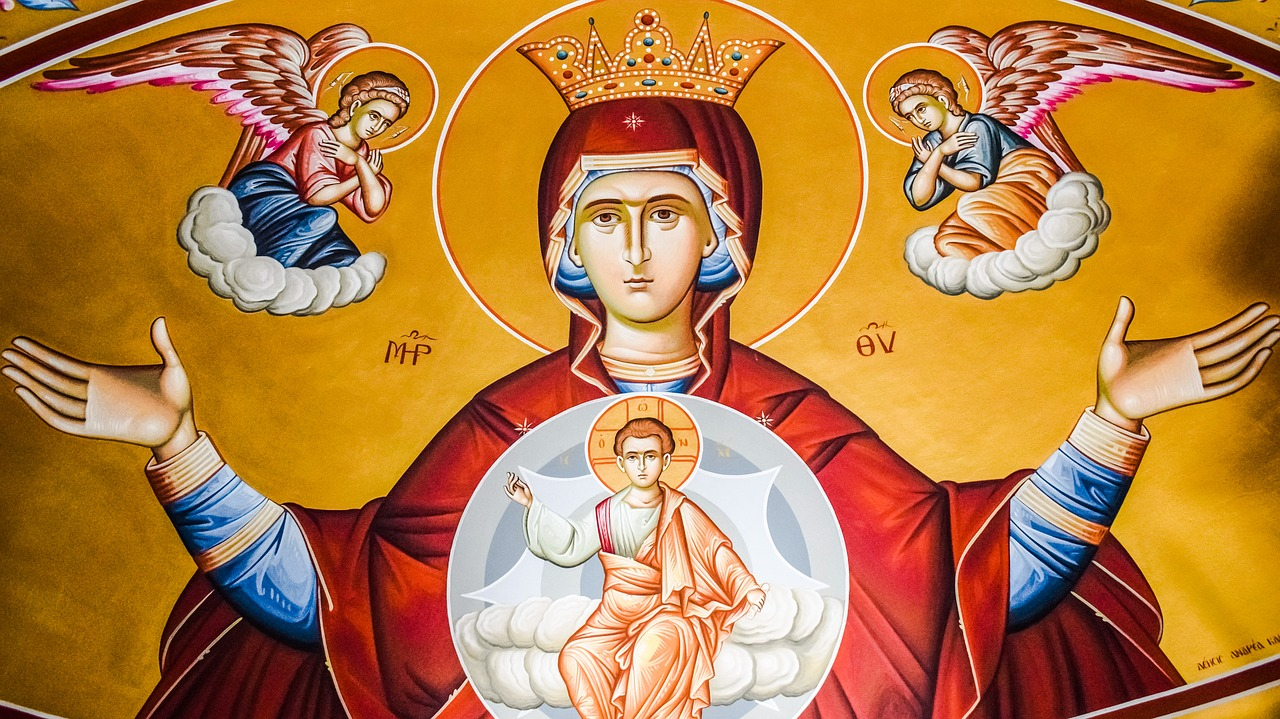 |
| “Rejoice, highly favoured one! The Lord is with you” (Lk 1:28) Humankind is galvanised by joyful news: God has become a child in Mary’s womb. God has become man and chosen to stay with us, forever! He comes into history and gives us his Mother, Mary, as a star to guide our path. It is a mystery of infinite love! May the joy of that night fill our hearts and make us bearers of this great message of love to humanity. Merry Christmas! |
20 Dec 2017 | Focolare Worldwide
Towards Christmas “I knew that the company I was working for would soon close shop and I would soon be jobless. Despite this, as Christmas neared, my colleagues and I thought of setting aside a part of our salary for the poorer people. So we went to visit a family that lived in a shanty, deprived of all necessities. Besides the envelope with the money we also brought toys for the children. We departed happily: it seemed to us that it was best preparation for the birth of the Lord. But before the day ended, some good news arrived: we were ensured that we would work for another five months.” (J.L.V. – Mexico) Hunger «One day at school, I saw a little girl who was all alone in a corner. I immediately went and asked her, “Why are you crying?” She told me that she had stomach ache because she had not had breakfast and had nothing for lunch. I thought: “It is Jesus who is hungry” and gave her my sandwich. After a while that girl said to me: “Now my stomach is no longer aching.” I was so happy. (S.S – Philippines) I forgive! «I was playing with a friend of mine when a boy arrived and with no reason hit me on the head, and I had to go to the hospital to be treated. On returning home I had only one thought: revenge. The day after, that boy’s father came to ask forgiveness. And he added: “I give you my permission to do to my son what he did to you. Perhaps he will understand how badly he behaved!” At that point I remembered Jesus’s invitation to love one’s enemies and I answered him that I forgave him. Surprised, the father called his son, and so we made up and now live in peace.” (Dionisio – Angola) Stolen drillers While I was working in the office together with my colleague, Benda, who is Muslim, we heard a crash from outside. We went to look: someone had broken the glass of our van and had stolen three drillers. It was the first time a thing like that happened and we were inconsolable. Then the thought of forgiving the author of that act came to my mind, and who probably was pushed by necessity. Recalling a phrase of the Koran Benda added: “When a person forgives, what he was robbed of will be returned by someone else.” That evening, at home, while I was recounting the episode, one of my relatives offered me three drills which he wasn’t using anymore. The next day, he brought them, and one of them was similar to the more expensive drill that had been stolen. (A.G. – Italy)
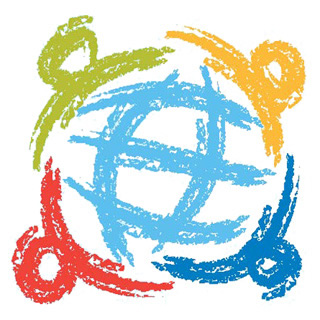
20 Dec 2017 | Non categorizzato
 Instituted by the United Nations in 2005, and proclaimed on 20 December 2002, the world Solidarity Fund was created with the aim of promoting human and social development in the developing countries. Solidarity Day calls attention to respect for diversity and the importance of solidarity between people. If united and solid, humankind can more effectively oppose social injustice. Solidarity conceived as an understanding of the fundamental and universal values of human existence has to become the basis of the search for global solutions, and may carry out a decisive role in solving the world’s problems. Solidarity is indicated as the protagonist in the Millennium Declaration signed in September 2000 by all the member states of the UN, to counter economic, social, cultural and humanitarian injustice. The declaration elects such values as the pillar of international relationships in the 21st century.
Instituted by the United Nations in 2005, and proclaimed on 20 December 2002, the world Solidarity Fund was created with the aim of promoting human and social development in the developing countries. Solidarity Day calls attention to respect for diversity and the importance of solidarity between people. If united and solid, humankind can more effectively oppose social injustice. Solidarity conceived as an understanding of the fundamental and universal values of human existence has to become the basis of the search for global solutions, and may carry out a decisive role in solving the world’s problems. Solidarity is indicated as the protagonist in the Millennium Declaration signed in September 2000 by all the member states of the UN, to counter economic, social, cultural and humanitarian injustice. The declaration elects such values as the pillar of international relationships in the 21st century.
19 Dec 2017 | Non categorizzato
It no longer seems paradoxical to have to reinsert Jesus into Christmas. During this season, especially in affluent countries, consumerism and a certain sentimentalism blur or even exclude the centrality of Jesus. It wasn’t very different two thousand years ago: On their way to Bethlehem, they couldn’t find a place to stay. Mary and Joseph had to make do with a makeshift shelter where the Child could be born. All over the world the Gen4 are saying:“They’ve evicted Jesus.” “At least in our homes, let’s celebrate as loud as we can the One who is born!” Chiara Lubich invited them to “let Jesus be born in their midst, through love.” This led to the idea in 1996 of making small statues of the Baby Jesus and giving them away to people rushing by on the streets, perhaps mindless of the fact that Christmas was primarily a celebration of Jesus. “We tell the people: ‘Do you want to take Him home to your house?’ Some say no, some move on without even stopping. But others stop and we give them these small statues, or the mangers we made. In the squares of big cities, in the commercial centres, in the homes for the elderly – our booths draw people’s attention . . . or the parties we organize for children. It’s like a wave of happiness that overcomes everybody and places, Jesus, the One we’re really celebrating, at the centre of Christmas.” Before trying to give Jesus to other people, the children try to know him better. A two-day meeting for Gen4 was held recently in the Focolare town, in Tagaytay, Philippines. At the end everyone wrote a letter to Jesus. Sam wrote: “Jesus is my hero. Whenever I’m afraid, he protects me. When I’m good to other people, I’m like him.” Kenneth: “I pray to you that my family will not separate.” Gioia writes about having learned how to love everyone, “even my enemies, to be the first to love, sharing the joys and sorrows of others.” April: “Thank you for giving me parents and a good sister.” In many parts of the world they are challenging the cold, the problems and indifference with a disarming smile, candour and warmth that is typical of their age. The Gen4 present an unedited view onto Christmas, returning the attention to its real meaning. In Central America Christmas the Gen4 from El Salvador the Dominican Republic celebrated with the Posadas that recall the difficulty Mary and Joseph had in finding a place to stay. Eight-year-old Walter Francisco is an active member of the Gen4: “Offering our Jesus to all the people who came by us, was really very nice!” Adriana and Juan Pablo are nine and six year old brothers. “First we went to a home for orphan children and share a meal with them. Then we went to give away our Baby Jesus, and the money that some people gave to us we gave to the poor.” «Li abbiamo portati anche ai bambini che puliscono i vetri delle macchine ai semafori». The local Focolare community of Santa Tecla held a food and toy drive for the occasion. More than forty children worked on making 270 statues of the Niñito, which they made with much love and care and offered to shoppers on the street, in several parishes and in a kindergarten: “Jesus can be born again today in everyone’s hearts,” they told us. The money donated, was sent to the children of Puerto Rico.
18 Dec 2017 | Non categorizzato
18 Dec 2017 | Non categorizzato
In the year 2000 the General Assembly of the United Nations declared December 18th International Migrants Day. Ten years before, on the same day, it had approved an international convention on the protection of the rights of migrant workers, following a serious road accident in which twenty eight migrant workers had lost their lives beneath the tunnel of Monte Bianco while they were travelling to France in search of work, hidden in a truck. Migrants Day deals with a topic that is not new to the story of the human race, but in recent years it has taken on a global relevance, especially in the West. Last 30th September, addressing an Association that brings together Italian Communes, Pope Bergoglio remarked: “We need a politics that doesn’t leave the people who arrive in our region to be left on the margins,” but for this to happen “there have to be spaces for personal encounter and mutual understanding.”
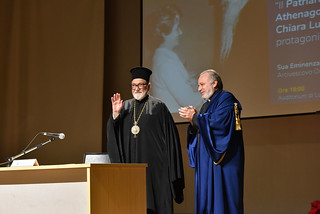
18 Dec 2017 | Non categorizzato
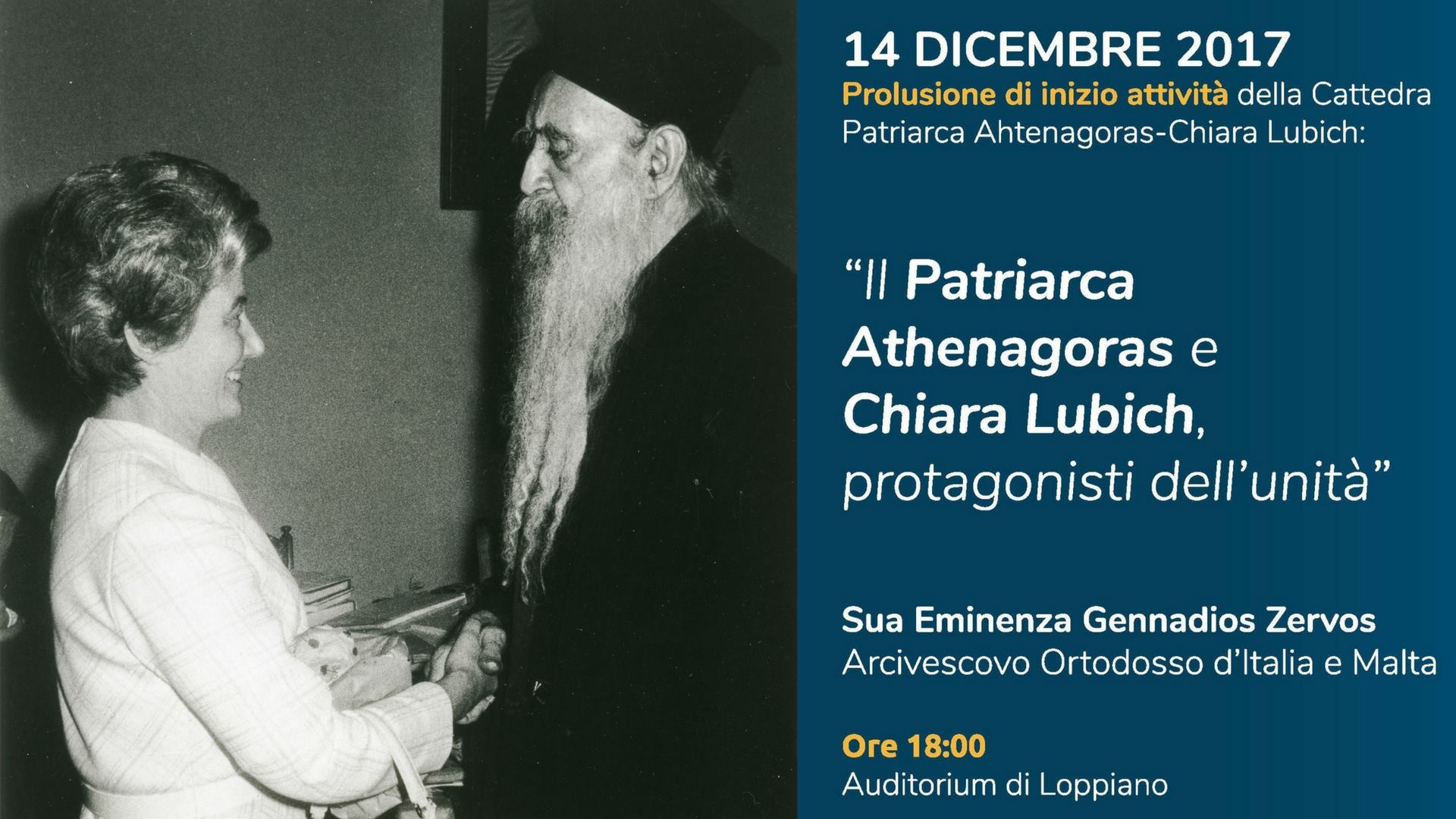 It is quite unique on the academic, international and cultural landscape and against the backdrop of a crisis of the political, social and religious equilibrium in the Near and Middle East, and between the shores of the Mediterranean: the institution of an ecumenical Chair named for Patriarch Athenagoras and for Chiara Lubich that stands as a sign of that Europe which still wants to breathe with “both lung It was inaugurated last December 14th within the context of the international town of Loppiano, not far from Florence and its call to universalism. The nearby city of central Italy boasts of a long tradition of reconciliation between the East and the West that goes back to the middle of the fifteenth century. Instituted jointly by the Catholic Church, represented by Archbishop of Florence, Cardinal Betori, and by the Orthodox Church, represented by Orthodox Archbishop of Italy and Malta, Gennadios Zervos, the Chair will examine the cultural significance and social implications of the ecumenical journey towards the full unity of the Christian Churches of the East and of the West in highly qualified environment like Sophia University Institute (IUS) where reflection and the dialogue of life are strictly united and experienced.
It is quite unique on the academic, international and cultural landscape and against the backdrop of a crisis of the political, social and religious equilibrium in the Near and Middle East, and between the shores of the Mediterranean: the institution of an ecumenical Chair named for Patriarch Athenagoras and for Chiara Lubich that stands as a sign of that Europe which still wants to breathe with “both lung It was inaugurated last December 14th within the context of the international town of Loppiano, not far from Florence and its call to universalism. The nearby city of central Italy boasts of a long tradition of reconciliation between the East and the West that goes back to the middle of the fifteenth century. Instituted jointly by the Catholic Church, represented by Archbishop of Florence, Cardinal Betori, and by the Orthodox Church, represented by Orthodox Archbishop of Italy and Malta, Gennadios Zervos, the Chair will examine the cultural significance and social implications of the ecumenical journey towards the full unity of the Christian Churches of the East and of the West in highly qualified environment like Sophia University Institute (IUS) where reflection and the dialogue of life are strictly united and experienced. 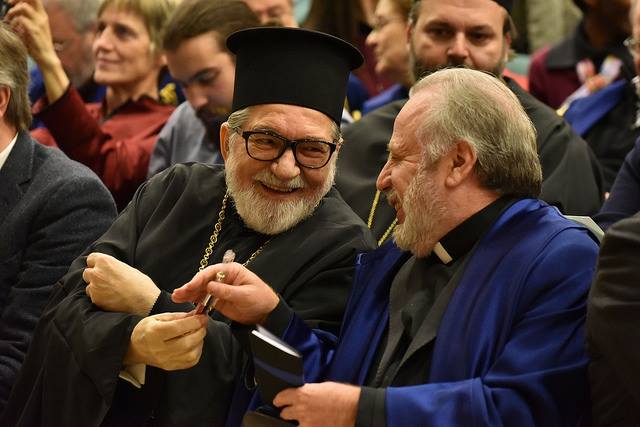 The idea of an ecumenical Chair came up in 2015, when IUS with the approval and applause of Pope Francis, had awarded the first honorary doctorate in the Culture of Unity to the Ecumenical Patriarch of Constantinople Bartholomew I. “On that occasion,” IUS explains, “the desire came out of instituting an Ecumenical Chair named after Patriarch Athenagoras and after Chiara Lubich, which would revisit and actualize that spiritual heritage.” The Chair, of which IUS president, Piero Coda and Metropolitan of Selyvria, Hi Eminence Maximos Vgenopoulos, are co-holders, was inaugurated in the persence of the Metropolitan of Italy and Malta, Gennadios Zervos. “Patriarch Athenagoras and Chiara Lubich are two worthy and blessed personalities that God had illumined,” said the Metropolitan, “to destroy the religious emnities and divisions. With their encounter, they restored the friendship and launched the ‘Dialogue of Charity’.” He went on to say, “I believe that Chiara, with her spirituality, had prepared the two main and most valuable Bridges: the first is Paul VI, the second Athenagoras.”
The idea of an ecumenical Chair came up in 2015, when IUS with the approval and applause of Pope Francis, had awarded the first honorary doctorate in the Culture of Unity to the Ecumenical Patriarch of Constantinople Bartholomew I. “On that occasion,” IUS explains, “the desire came out of instituting an Ecumenical Chair named after Patriarch Athenagoras and after Chiara Lubich, which would revisit and actualize that spiritual heritage.” The Chair, of which IUS president, Piero Coda and Metropolitan of Selyvria, Hi Eminence Maximos Vgenopoulos, are co-holders, was inaugurated in the persence of the Metropolitan of Italy and Malta, Gennadios Zervos. “Patriarch Athenagoras and Chiara Lubich are two worthy and blessed personalities that God had illumined,” said the Metropolitan, “to destroy the religious emnities and divisions. With their encounter, they restored the friendship and launched the ‘Dialogue of Charity’.” He went on to say, “I believe that Chiara, with her spirituality, had prepared the two main and most valuable Bridges: the first is Paul VI, the second Athenagoras.” 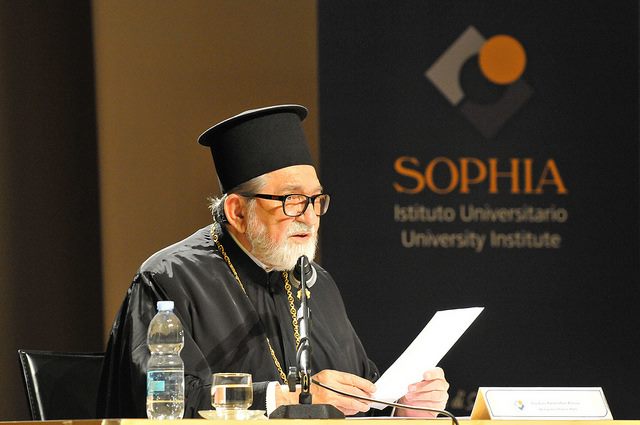 Pope Frances sent a message for the occasion: “I rejoice for this praiseworthy initiative, aimed at memorializing the encounter between the Ecumenical Patriarch and the foundress of the Focolare Movement, which fifty years ago marked the beginning of a prolific journey of mutual collaboration and understanding, which boasts of many fruits today, among them, fraternal friendship.” “Such an academic project,” said Focolare president, Maria Voce, “represents an important moment in the ecumenical relations that are in place between the Sister Churches of East and West, and opens fascinating prospectives for the field of study, centered on respectful dialogue, that promises to be even more enriching as a mutual gift on the level of theology and for an anthropology of communion.”
Pope Frances sent a message for the occasion: “I rejoice for this praiseworthy initiative, aimed at memorializing the encounter between the Ecumenical Patriarch and the foundress of the Focolare Movement, which fifty years ago marked the beginning of a prolific journey of mutual collaboration and understanding, which boasts of many fruits today, among them, fraternal friendship.” “Such an academic project,” said Focolare president, Maria Voce, “represents an important moment in the ecumenical relations that are in place between the Sister Churches of East and West, and opens fascinating prospectives for the field of study, centered on respectful dialogue, that promises to be even more enriching as a mutual gift on the level of theology and for an anthropology of communion.”  The long story of friendship and cooperation with the Ecumenical Patriarchate of Constantinople reaches back to June 1967 when Chiara Lubich first met Patriarch Athenagoras. “It is a great thing to know each other,” the Patriarch had confided to her. “For many centuries we lived isolated, without having brothers, without having sisters – like orphans! The first ten centuries of Christianity were for the dogmas and for organizing the Church. In the ten centuries that followed we had the schisms – the divisions. The third era – this one – is the era of love.” Conferences, classes and a Summer School for young Catholics, Orthodox, Jews and Muslims are scheduled for this academic year. Next March a series of lessons will be given on The Ecclesiology of the Orthodox Church and the Path of Ecumenical Dialogue with the Catholic Church,” for students who would like to contribute to the promotion of the full unity, in service to the encounter between peoples and cultures. Foto Flickr
The long story of friendship and cooperation with the Ecumenical Patriarchate of Constantinople reaches back to June 1967 when Chiara Lubich first met Patriarch Athenagoras. “It is a great thing to know each other,” the Patriarch had confided to her. “For many centuries we lived isolated, without having brothers, without having sisters – like orphans! The first ten centuries of Christianity were for the dogmas and for organizing the Church. In the ten centuries that followed we had the schisms – the divisions. The third era – this one – is the era of love.” Conferences, classes and a Summer School for young Catholics, Orthodox, Jews and Muslims are scheduled for this academic year. Next March a series of lessons will be given on The Ecclesiology of the Orthodox Church and the Path of Ecumenical Dialogue with the Catholic Church,” for students who would like to contribute to the promotion of the full unity, in service to the encounter between peoples and cultures. Foto Flickr
17 Dec 2017 | Non categorizzato
On Sunday, December 17th, Pope Francis will turn 81. He is in good health and working with great intensity. As everyone knows, he recently returned from a very demanding trip to Myanmar and Bangladesh and is preparing for his 22cnd trip to Chile and Peru in January. Last year, on his 80th birthday, he confided: “For several days a word has been coming to my mind that can sound bad: old age. It frightens. At least it gives a little scare. But when you see it as a phase of life that is meant to give joy, wisdom, hope – then you can start to live again.” With great gratitude for the gift his life has been, all focused on loving God and people, with a special preference for the most weak and marginalized, we wish him our most heartfelt happy birthday wishes. We assure him of our daily prayers as we ask the Holy Spirit to give hims strength and light to carry foward his task with peace for the joy of all. https://youtu.be/WMVIMp7Eg8I
16 Dec 2017 | Non categorizzato
Today the warmth of Christmas makes us all feel more like a family, more one and more like true brothers and sisters who share everything, both joys and sorrows. Above all, we want to share the pain of those who, through various circumstances, are spending this Christmas in direct contact with suffering. … If we look at suffering from a human standpoint, we are tempted to find causes for it either within or outside of us, for example in other people’s wrongdoing, in nature or other things…. We say that accident is John’s fault; that illness is my fault; that painful situation/trial came about because of Jane…. All this can be true, but if we think only in these terms, we forget the most important thing. We lose sight of the fact that God love’s underpins all that happens to us. God wills or permits everything for a higher purpose, which is our own good. So then, what can we say to people struggling with suffering? What Christmas wishes can we offer them? How can we relate to them? First, let’s approach them with the greatest respect. Even though they may not think so, at this very moment God is at their side. Then let’s share their crosses as far as we can. Let’s assure them that we are always with them and praying for them, so that they may be able to take what distresses and causes them pain directly from the hands of God. … Let’s help them bear in mind the value of suffering and remind them of the marvellous Christian principle in our spirituality that helps us see a countenance of Jesus crucified and forsaken in suffering and, by loving him, transform it into joy. Knowing that those who walk in God’s ways cannot escape suffering, our Christmas wishes might be that everyone may know how to welcome all the small or great sufferings they encounter with great love and present them as a gift for the Child Jesus born today, just as the three kings offered their gifts. It will be the best incense, the best gold, and the best myrrh that we could place in the nativity scene. Chiara Lubich, 25 December 1986
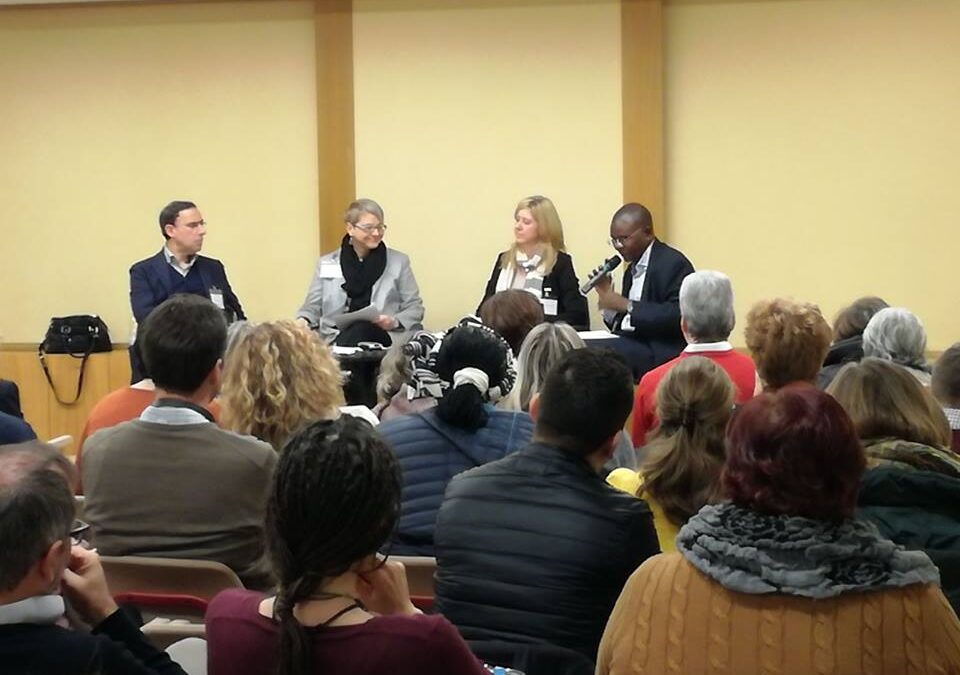
15 Dec 2017 | Focolare Worldwide
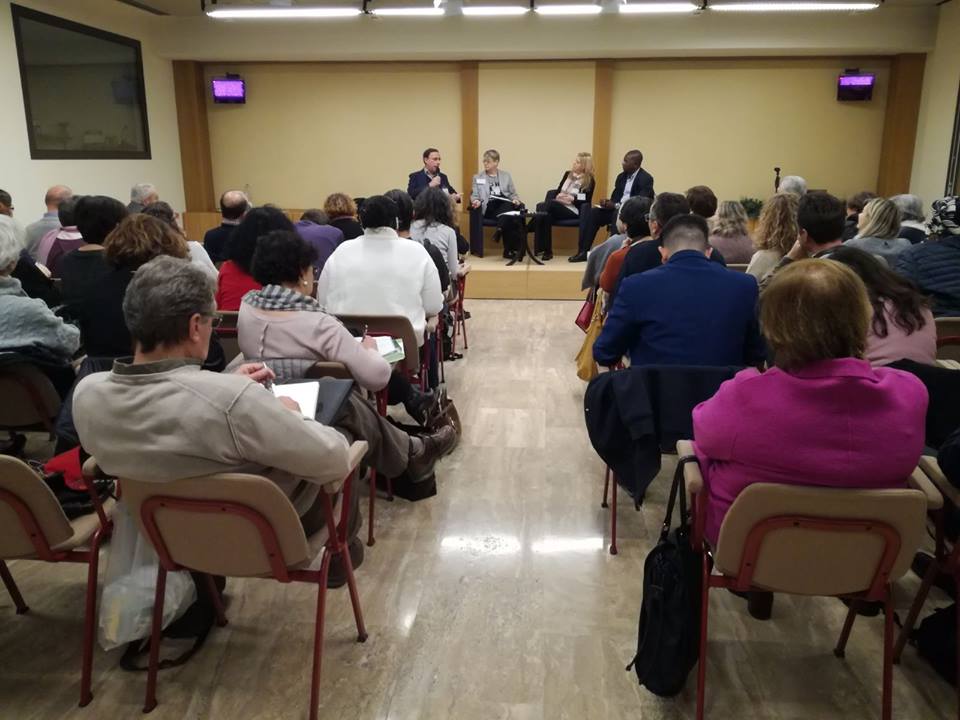 “For as much as Africa is rich, the others seem to benefit more from its riches. In granting contracts to multinationals for the extraction of minerals, for example, there is a play of interests, in which ’compensations’ and ‘compromises,’ ‘agreements’ and ‘thanks’ have as a consequence the exploitation of the producing country, without a real improvement in raising the population’s living conditions.” Raphael Takougang, a Cameroon lawyer of Communion and Law, harshly portrays a picture of the reality of life in Africa today: “Corruption in Africa is not only the work of single citizens, but is above all a consolidated method with which the economic powers “create” and support tyrants as long as these protect their interests, with the silent complicity of the international community.” And it is always the poor who pay for this. Takougang does not limit himself to mere denunciations, but rather, despite everything, shows his optimism ‘because there is a new generation of political leaders in Africa rising up, and has realised that mainly the citizens will have to control the actions of those governing them… to ensure the defense of the African people’s fundamental rights to life, education, health, and spiritual and material wellbeing.” Patience Lobé, an engineer – world head who together with the volunteers are the driving force of New Humanity – during her entire mandates as an officer of the Ministry of Public Works in Cameroon had been seriously threatened: «For the African concept of solidarity anyone who is in need has to be satisfied. For this reason people continually came to my office, to ask for work, or to request a subsidy. During my permanence as head of the office, not one day passed in which I was not subject to temptations or threats. Corruption is a widespread, contaminative virus, difficult to eliminate. Like all viruses, a vaccine is needed in order to eradicate it. The vaccine may be represented by a real change in mentality: education in a culture other than consumerism which considers the owning of goods and possession as the only road to happiness.”
“For as much as Africa is rich, the others seem to benefit more from its riches. In granting contracts to multinationals for the extraction of minerals, for example, there is a play of interests, in which ’compensations’ and ‘compromises,’ ‘agreements’ and ‘thanks’ have as a consequence the exploitation of the producing country, without a real improvement in raising the population’s living conditions.” Raphael Takougang, a Cameroon lawyer of Communion and Law, harshly portrays a picture of the reality of life in Africa today: “Corruption in Africa is not only the work of single citizens, but is above all a consolidated method with which the economic powers “create” and support tyrants as long as these protect their interests, with the silent complicity of the international community.” And it is always the poor who pay for this. Takougang does not limit himself to mere denunciations, but rather, despite everything, shows his optimism ‘because there is a new generation of political leaders in Africa rising up, and has realised that mainly the citizens will have to control the actions of those governing them… to ensure the defense of the African people’s fundamental rights to life, education, health, and spiritual and material wellbeing.” Patience Lobé, an engineer – world head who together with the volunteers are the driving force of New Humanity – during her entire mandates as an officer of the Ministry of Public Works in Cameroon had been seriously threatened: «For the African concept of solidarity anyone who is in need has to be satisfied. For this reason people continually came to my office, to ask for work, or to request a subsidy. During my permanence as head of the office, not one day passed in which I was not subject to temptations or threats. Corruption is a widespread, contaminative virus, difficult to eliminate. Like all viruses, a vaccine is needed in order to eradicate it. The vaccine may be represented by a real change in mentality: education in a culture other than consumerism which considers the owning of goods and possession as the only road to happiness.” 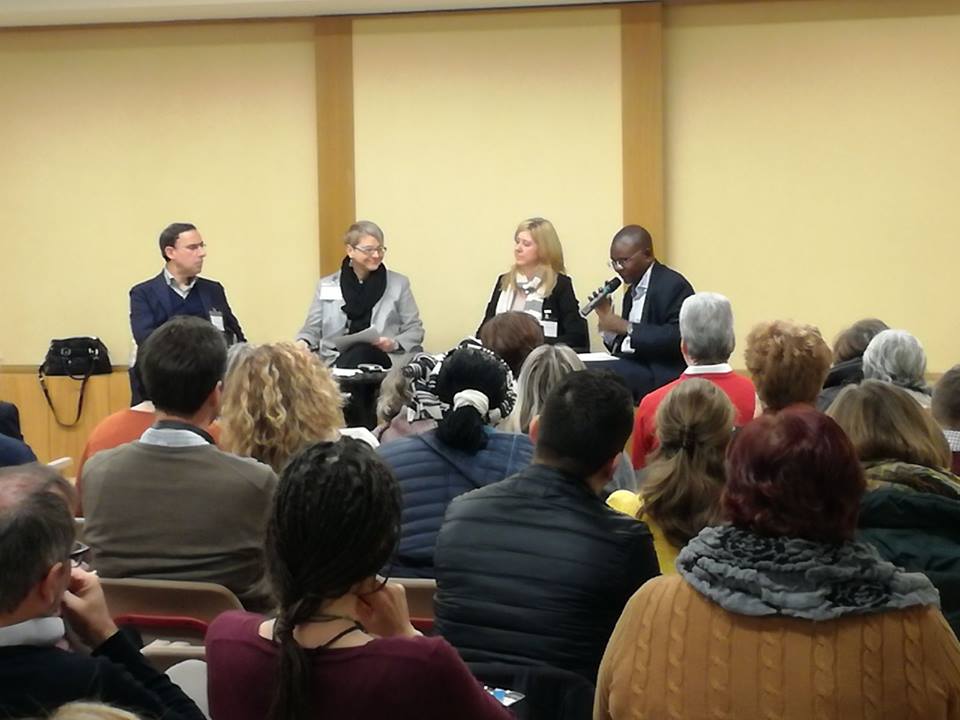 In the same way, it isn’t easy to launch good procedures and practices in the field of the battle against illegal management of public funds. Françoise, French officer in the Ministry of Finance, recounts: “Due to the variety of situations, public services and issues which I have to deal with, it is not always easy to maintain one’s discernment, define the law, sustain good management practices or simply coherence with the principles of honesty (also intellectual), rectitude, cooperation and solidarity with colleagues. But the work experience over the years has confirmed that every time I was faithful to these values, I discovered new horizons, new ways of acting, the situations got solved and unity between institutions and people was possible.” Paolo, director at the Municipality of a big Italian city added: “We mustn’t forget that as public administration employees our primary task is to dedicate ourselves to the good of the community under all aspects, taking on the weight of the related responsibility. Every action must conform to the principles and values without which we couldn’t live together, enhancing human wellbeing and progress of all the citizens.” It is the battle against corruption, therefore, but not only that. The diffusion of good practices, respect for the rights of citizens and their needs, and also reception, and the capacity to create a link with other institutions: these are the great challenges for those working in the Public Administration. The participants of the congress are all convinced of this, and have made it their commitment to continue cultivating these principles daily. The seeds of a culture of lawfulness will silently bring about results in their countries.
In the same way, it isn’t easy to launch good procedures and practices in the field of the battle against illegal management of public funds. Françoise, French officer in the Ministry of Finance, recounts: “Due to the variety of situations, public services and issues which I have to deal with, it is not always easy to maintain one’s discernment, define the law, sustain good management practices or simply coherence with the principles of honesty (also intellectual), rectitude, cooperation and solidarity with colleagues. But the work experience over the years has confirmed that every time I was faithful to these values, I discovered new horizons, new ways of acting, the situations got solved and unity between institutions and people was possible.” Paolo, director at the Municipality of a big Italian city added: “We mustn’t forget that as public administration employees our primary task is to dedicate ourselves to the good of the community under all aspects, taking on the weight of the related responsibility. Every action must conform to the principles and values without which we couldn’t live together, enhancing human wellbeing and progress of all the citizens.” It is the battle against corruption, therefore, but not only that. The diffusion of good practices, respect for the rights of citizens and their needs, and also reception, and the capacity to create a link with other institutions: these are the great challenges for those working in the Public Administration. The participants of the congress are all convinced of this, and have made it their commitment to continue cultivating these principles daily. The seeds of a culture of lawfulness will silently bring about results in their countries.

14 Dec 2017 | Focolare Worldwide
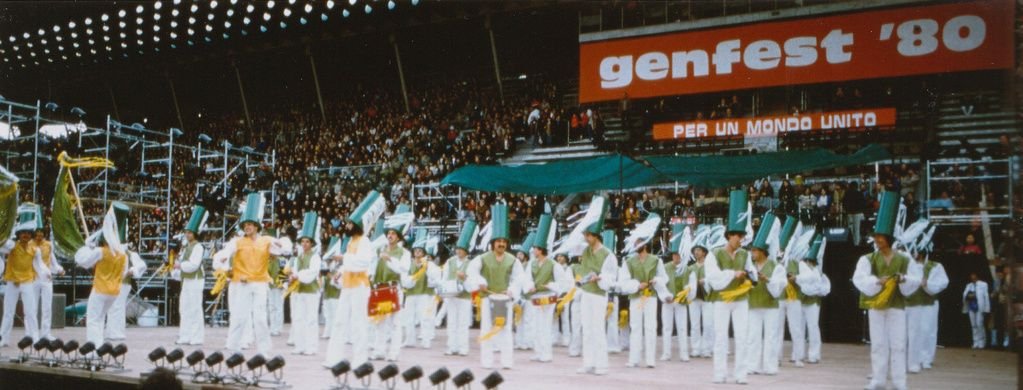 I was born in Bergamo,(Italy), the first of four children in a beautiful family with solid Christian roots. At seventeen I was in high school and involved in the parish. I loved school, helping others and going on trips to the mountains. I had a lot of friends and a rich faith experience. As they used to say back then, I was “good kid,” but … I always felt something was missing. I wanted something beautiful, great and true. Italy was going through hard times with assassination attempts by the Red Brigades and a job crisis. My father who was in metalworking, was laid off and later lost his job. The injustice of it all bothered me, as did the social conflict, but I also could feel being made to renew society. I spent hours talking with friends, debating, but it only left me empty inside.
I was born in Bergamo,(Italy), the first of four children in a beautiful family with solid Christian roots. At seventeen I was in high school and involved in the parish. I loved school, helping others and going on trips to the mountains. I had a lot of friends and a rich faith experience. As they used to say back then, I was “good kid,” but … I always felt something was missing. I wanted something beautiful, great and true. Italy was going through hard times with assassination attempts by the Red Brigades and a job crisis. My father who was in metalworking, was laid off and later lost his job. The injustice of it all bothered me, as did the social conflict, but I also could feel being made to renew society. I spent hours talking with friends, debating, but it only left me empty inside. 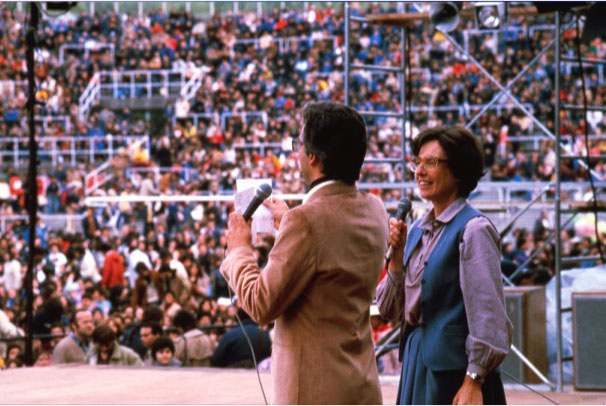 One day, Anita, a girl from the parish, invited me and my sister to the Genfest that was going to be held in Rome. She told me we’d meet thousands of young people from other countries and also the Pope. There was something special about Anita, a special joy and sincerity that shone in her eyes and, like others at the parish – the priest, two catechists and a seminarian – she seemed to have a secret: they were always open to everyone, willing and really able to listen. With a good dose of unawareness my sister and I took off on a bus with a hundred young people from the parish and headed for the Genfest in Rome. We arrived late at the Flaminio Stadium because of an accident and wound up sitting in the last rows on the highest seats where there was no roof – and we were very far from the stage that had a sign that read: For A United World. It was pouring rain, and I was drenched. I began to ask myself why I had ever agreed to such an excursion. But just then some young people from Switzerland who were sitting just below us, offered us some plastic sheeting to cover ourselves with; they offered us some food and binoculars, so we could follow the show more easily. We spoke in different languages, but understood one another right away. I experienced the liberty of love freely given, and a great sense of welcome and acceptance. Despite all the rain, colorful dances took turns on stage. It seemed like I had stepped into another dimension. Forty-thousand young people filled with enthusiasm were flowing in from every corner of the world – all of them giving witness to the Gospel they were really living.
One day, Anita, a girl from the parish, invited me and my sister to the Genfest that was going to be held in Rome. She told me we’d meet thousands of young people from other countries and also the Pope. There was something special about Anita, a special joy and sincerity that shone in her eyes and, like others at the parish – the priest, two catechists and a seminarian – she seemed to have a secret: they were always open to everyone, willing and really able to listen. With a good dose of unawareness my sister and I took off on a bus with a hundred young people from the parish and headed for the Genfest in Rome. We arrived late at the Flaminio Stadium because of an accident and wound up sitting in the last rows on the highest seats where there was no roof – and we were very far from the stage that had a sign that read: For A United World. It was pouring rain, and I was drenched. I began to ask myself why I had ever agreed to such an excursion. But just then some young people from Switzerland who were sitting just below us, offered us some plastic sheeting to cover ourselves with; they offered us some food and binoculars, so we could follow the show more easily. We spoke in different languages, but understood one another right away. I experienced the liberty of love freely given, and a great sense of welcome and acceptance. Despite all the rain, colorful dances took turns on stage. It seemed like I had stepped into another dimension. Forty-thousand young people filled with enthusiasm were flowing in from every corner of the world – all of them giving witness to the Gospel they were really living. 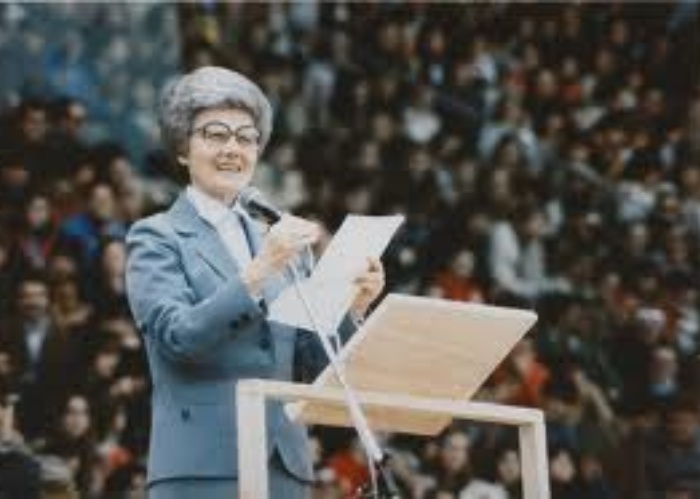 Then a small woman with white hair got on stage. It was Chiara Lubich. I looked at her through binoculars. As soon as she began to speak a deep silence fell over the crowd. I was enraptured more by the sound of her voice than by what she said, by the conviction that emanated from her words, by their power that stood in contrast to her fragile appearance. She spoke of a “moment of God,” and, even though she presented several lists of divisions, breakups and the overall disunity of the human race – she was proclaiming a great ideal: a united world, Jesus’s own ideal. She invited us to bring the divine into the life of society, into the world – through love. Her talk only lasted a few minutes while I found myself being crushed by a feeling I had never had before, which – afterwards – no sorrowful nor difficult event could ever dent in: a united world is possible and I have the amazing possibility of building it with my own life! I had found it! I wanted to live like Chiara, like those young people I was among that afternoon, to have their faith, their push, their joy.
Then a small woman with white hair got on stage. It was Chiara Lubich. I looked at her through binoculars. As soon as she began to speak a deep silence fell over the crowd. I was enraptured more by the sound of her voice than by what she said, by the conviction that emanated from her words, by their power that stood in contrast to her fragile appearance. She spoke of a “moment of God,” and, even though she presented several lists of divisions, breakups and the overall disunity of the human race – she was proclaiming a great ideal: a united world, Jesus’s own ideal. She invited us to bring the divine into the life of society, into the world – through love. Her talk only lasted a few minutes while I found myself being crushed by a feeling I had never had before, which – afterwards – no sorrowful nor difficult event could ever dent in: a united world is possible and I have the amazing possibility of building it with my own life! I had found it! I wanted to live like Chiara, like those young people I was among that afternoon, to have their faith, their push, their joy. 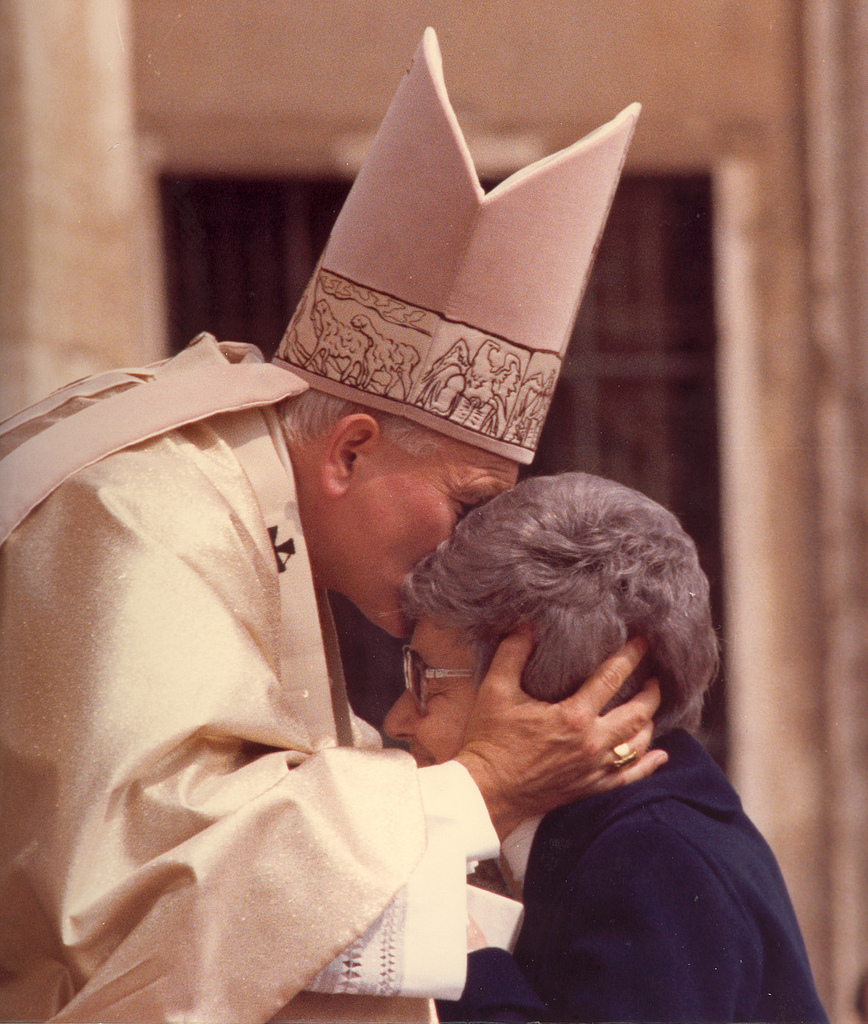 The next day there was a rousing encounter with John Paul II at Saint Peter’s Square. During the return trip home, me – timid as I am – I bombarded the Gen with questions: I wanted to know everything about them! I began to visit them in my city, and the Gen talked to me about their secret: love for Jesus Forsaken in all the large and small sufferings in us and around us. I somehow realized that this was a radical experience of God I was dealing with here, one without half-measures. Jesus Forsaken was calling me to give Him everything, to follow Him. I was filled with an enormous fear: for me it me it was ALL or NOTHING. Strong suffering and pain were never lacking in the months following the Genfest. But the life I had begun with the Gen, the possibility of giving a meaning to pain, the unity among us that was made of concrete love and sharing, helped me to carry on, in spite of every obstacle – in an amazing adventure that widened my heart. I was experiencing that with God among us, all is possible and that the possibility of the unity of the human family was really doable.
The next day there was a rousing encounter with John Paul II at Saint Peter’s Square. During the return trip home, me – timid as I am – I bombarded the Gen with questions: I wanted to know everything about them! I began to visit them in my city, and the Gen talked to me about their secret: love for Jesus Forsaken in all the large and small sufferings in us and around us. I somehow realized that this was a radical experience of God I was dealing with here, one without half-measures. Jesus Forsaken was calling me to give Him everything, to follow Him. I was filled with an enormous fear: for me it me it was ALL or NOTHING. Strong suffering and pain were never lacking in the months following the Genfest. But the life I had begun with the Gen, the possibility of giving a meaning to pain, the unity among us that was made of concrete love and sharing, helped me to carry on, in spite of every obstacle – in an amazing adventure that widened my heart. I was experiencing that with God among us, all is possible and that the possibility of the unity of the human family was really doable.
Patrizia Bertoncello
13 Dec 2017 | Non categorizzato
This is a preparation to marriage course to be held at the International Centre of Castel Gandolfo which will host youths of different countries who wish to dialogue on the values that are basic to the life of a couple. The following themes will be proposed in an interactive and dynamic way:
- choosing the person
- passing from “I” to “We”
- communication as a couple
- conflicts and forgiveness
- bodily language
- fertility and responsible procreation
- many other themes
In the development of the programme by the New Families experts, 4 couples from the Philippines, Portugal, Brazil and Italy also gave their precious contribution. Depliant For info and enrolments: famiglienuove@focolare.org Tel +39.06.97608300 – +39.06.9411614
13 Dec 2017 | Non categorizzato
The Jewish feast of the Hanukkah, known also as the “Festival of lights,” starts every year on the 25th day of the Jewish month of Kislev and extends to the month of Tevet. This year it will start on the evening of 13 December and will last up to 20 December. The feast recalls the revolt of the Maccabei in the 2nd century BC, who rose in defense of monotheism, and their own land and customs, against the Greeks who wanted to strip the Jews of their identity. After the Greek occupation, upon returning to the Temple of Jerusalem for its rededication, they found only an ampule of oil that was sufficient for just one day. Miraculously, that small amount of oil gave light for eight days. Every year during this period, every night in their homes, all Jewish families light up a candle of the menorah (the nine-arm candelabra) for eight nights, as the number of days in which the oil ampule remained alight in the Temple. The candelabra is placed close to the window, so that it can be seen also from outside, as a warning to always respect life and its ideals.

13 Dec 2017 | Focolare Worldwide
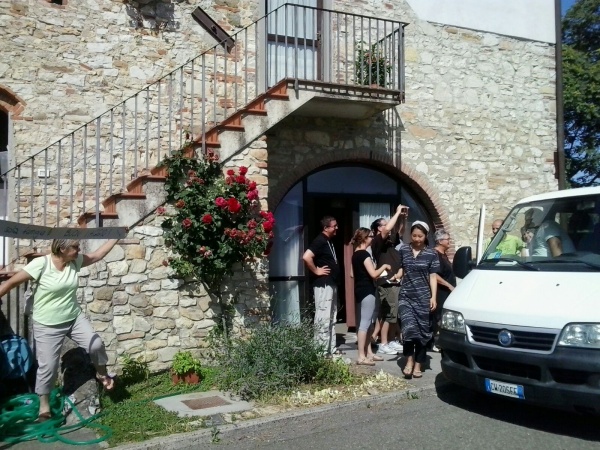 Every beginning of the year, nothing is the same as it was at Loreto School. It’s been that way ever since 1982 when the school was found, because of the different places the families come from each year. Their reasons for going to Loppiano are also different. They rhythm of the course and the work are also adapted to their languages and cultures. Celebrations are enriched by their sounds and colours. The course focuses on topics related to the family within the context of the spirituality of unity and coincide with the children’s scholastic year in the local public schools. Eight families that are currently attending the school come from Japan, Korea, Mexico, Brazil, Colombia, Italy, Argentina and Vietnam. They have one thing in common: the desire to grow in Gospel mutual love. This is the only law that reigns in the Focolare town where the families have come to have a full immersion in the spirituality of unity. “Why did we come here?”, Indian Henke and Emilio di Pelotas try to explain. “To seek the essential in life. We didn’t want to get stuck in the vicious circle of profit, so we inserted our business in the Economy of Communion project (EoC). We sold the car, gave away half of our clothing to the poor along with a few electrical gadgets for the house. It was a drastic move and, as a consequence, we felt the irresistible urge to be formed as a family together with our children in the spirituality of unity.”
Every beginning of the year, nothing is the same as it was at Loreto School. It’s been that way ever since 1982 when the school was found, because of the different places the families come from each year. Their reasons for going to Loppiano are also different. They rhythm of the course and the work are also adapted to their languages and cultures. Celebrations are enriched by their sounds and colours. The course focuses on topics related to the family within the context of the spirituality of unity and coincide with the children’s scholastic year in the local public schools. Eight families that are currently attending the school come from Japan, Korea, Mexico, Brazil, Colombia, Italy, Argentina and Vietnam. They have one thing in common: the desire to grow in Gospel mutual love. This is the only law that reigns in the Focolare town where the families have come to have a full immersion in the spirituality of unity. “Why did we come here?”, Indian Henke and Emilio di Pelotas try to explain. “To seek the essential in life. We didn’t want to get stuck in the vicious circle of profit, so we inserted our business in the Economy of Communion project (EoC). We sold the car, gave away half of our clothing to the poor along with a few electrical gadgets for the house. It was a drastic move and, as a consequence, we felt the irresistible urge to be formed as a family together with our children in the spirituality of unity.” 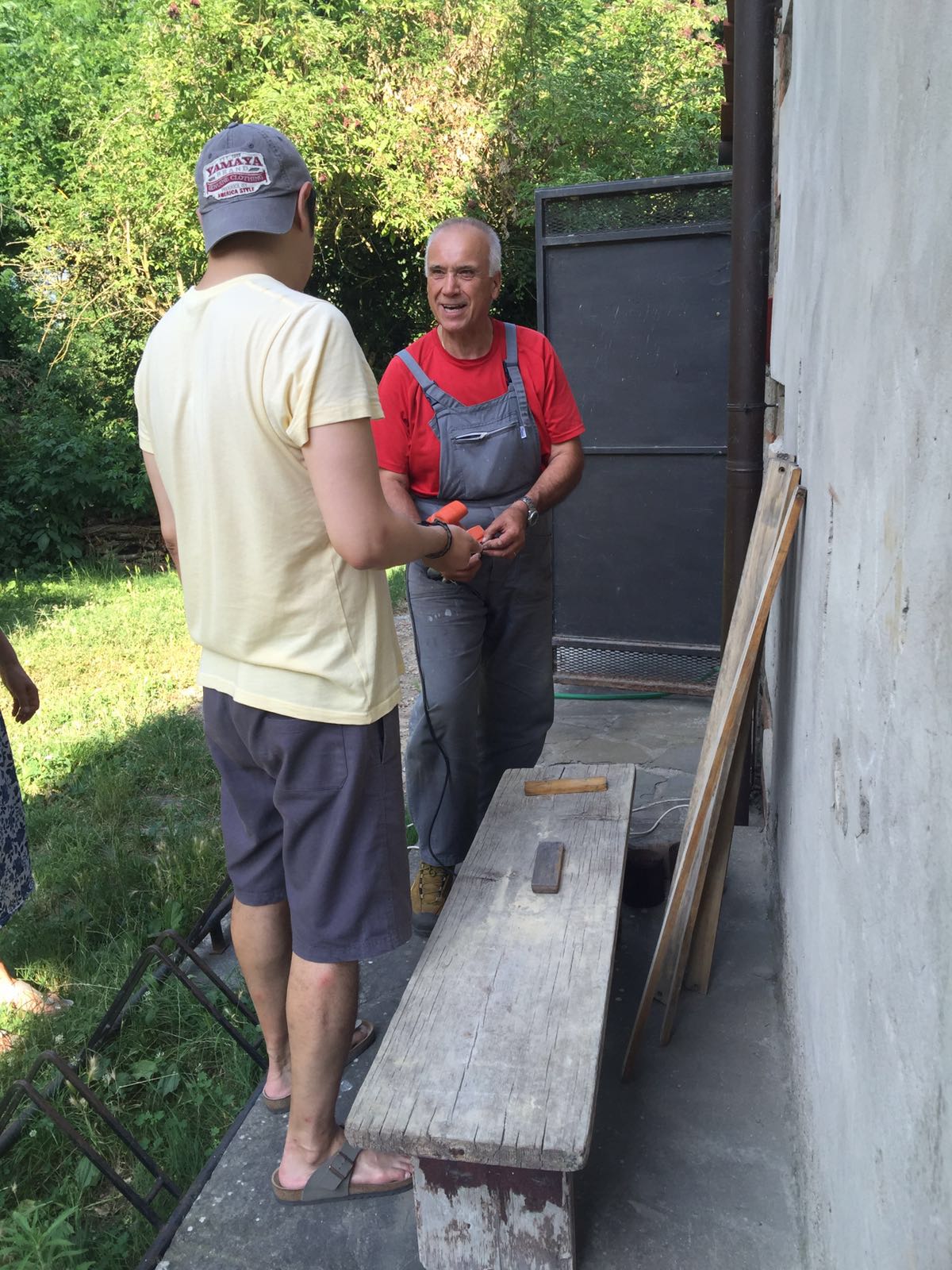 “In order to come here,” says Bao Chau, Vitenamese and father of two boys, “we had to wait four years because of family reasons. We were about to withdraw our enrolment when the obstacles were overcome and we strongly felt that God was waiting for us in Loppiano. We’ve been here since 2016, but because of the language we weren’t able to understand everything that was discussed in the course, so we decided to stay on for another year. I asked me employer; I asked my brothers to help me with the home loan and I asked the school director. Two months later, all the answers came back affirmative.” “We’re glad to stay on,” his wife Bao Vy adds, “to enter more deeply into the life of the Gospel and, when we return home, to share it with other families in Vietnam, so that we can continue to grow together in love.” “We come from Korea, and this is our daughter, 13 year old Maria Grazia. Irema and Michele are the owners of an institute that Michele founded fifteen years ago, to answer to the widespread need for better university preparation. “From the first ten students,” they recount, “in three years there a thousand units. We were overtaken by the work and our plan of building a harmonious and united family began to feel the effects.” After a deep communion among them, in the first days of June the decision was made to look for another kind of work. Then Michele had an idea: “If we sell the Institute we can go to Loppiano for a year!” It was an idea that Irema had right after their wedding, but back then it wasn’t possible. “We had to get sold before vacations. We prayed a lot and, on the last Saturday of June, the Institute was sold. God really wanted us to be here!”
“In order to come here,” says Bao Chau, Vitenamese and father of two boys, “we had to wait four years because of family reasons. We were about to withdraw our enrolment when the obstacles were overcome and we strongly felt that God was waiting for us in Loppiano. We’ve been here since 2016, but because of the language we weren’t able to understand everything that was discussed in the course, so we decided to stay on for another year. I asked me employer; I asked my brothers to help me with the home loan and I asked the school director. Two months later, all the answers came back affirmative.” “We’re glad to stay on,” his wife Bao Vy adds, “to enter more deeply into the life of the Gospel and, when we return home, to share it with other families in Vietnam, so that we can continue to grow together in love.” “We come from Korea, and this is our daughter, 13 year old Maria Grazia. Irema and Michele are the owners of an institute that Michele founded fifteen years ago, to answer to the widespread need for better university preparation. “From the first ten students,” they recount, “in three years there a thousand units. We were overtaken by the work and our plan of building a harmonious and united family began to feel the effects.” After a deep communion among them, in the first days of June the decision was made to look for another kind of work. Then Michele had an idea: “If we sell the Institute we can go to Loppiano for a year!” It was an idea that Irema had right after their wedding, but back then it wasn’t possible. “We had to get sold before vacations. We prayed a lot and, on the last Saturday of June, the Institute was sold. God really wanted us to be here!” 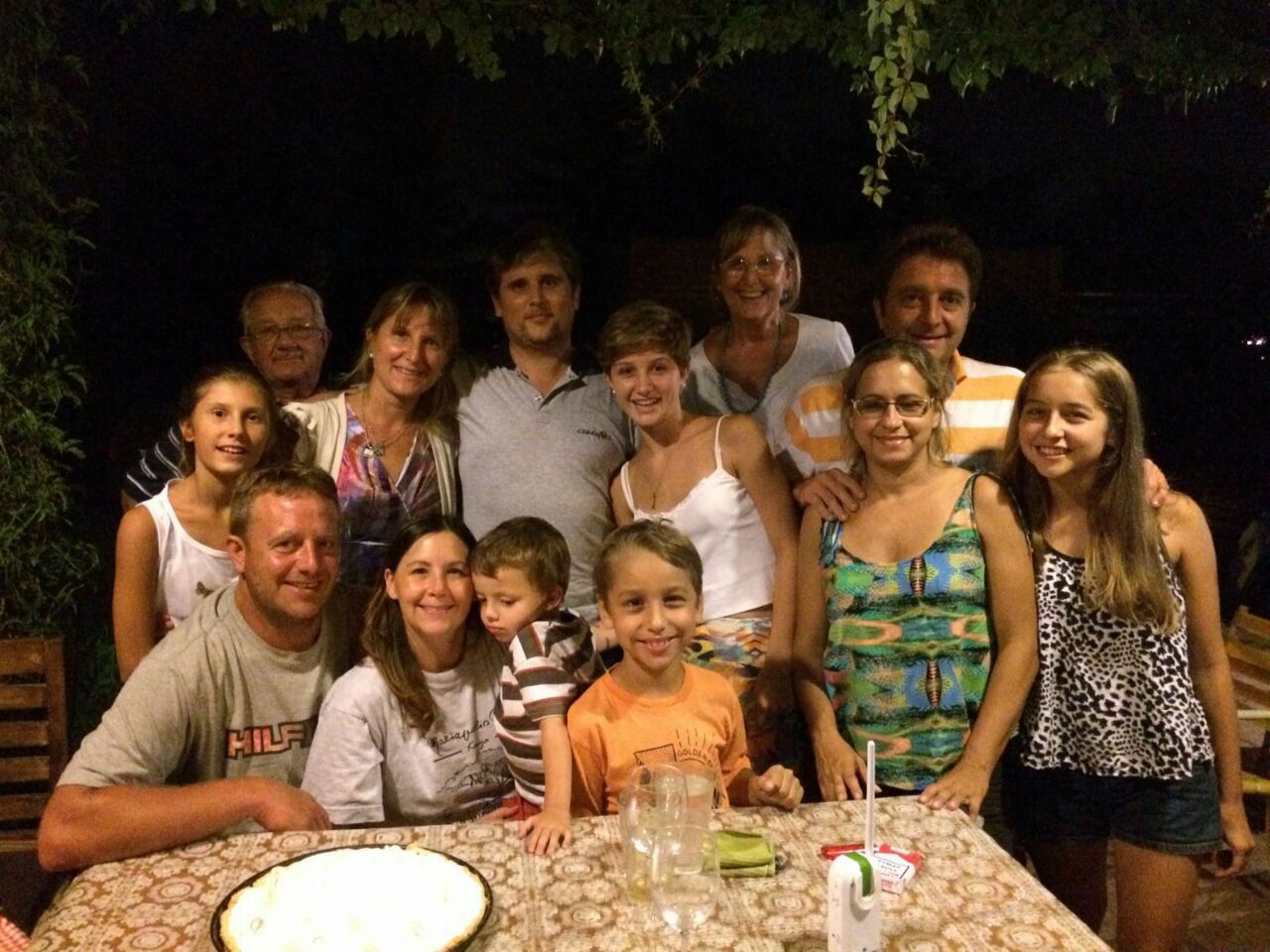 Francesca, 34 years old from Italy, and Roberto, 37 years old from Argentina are also a part of the mosaic. After several experiences in other countries,” they recount, “we are now residents of Italy, in Loreto. In our journey as a family, which has been brief but intense, we were never spared from problems: the different family contexts, several external affairs that were foreign to us and our way of doing things that blocked us a bit, but love and the will to build a healthy open family are strong. So we nurtured the decision to come to Loreto School with three year old Isabel, to learn how to prioritize and grow as parents and people. By living and sharing and being confronted by others, who knows? Maybe one day we will be able to testify to the Gospel out in the world.” Watch Video
Francesca, 34 years old from Italy, and Roberto, 37 years old from Argentina are also a part of the mosaic. After several experiences in other countries,” they recount, “we are now residents of Italy, in Loreto. In our journey as a family, which has been brief but intense, we were never spared from problems: the different family contexts, several external affairs that were foreign to us and our way of doing things that blocked us a bit, but love and the will to build a healthy open family are strong. So we nurtured the decision to come to Loreto School with three year old Isabel, to learn how to prioritize and grow as parents and people. By living and sharing and being confronted by others, who knows? Maybe one day we will be able to testify to the Gospel out in the world.” Watch Video
12 Dec 2017 | Non categorizzato
https://vimeo.com/246979396
A child recounts: “I only knew about Santa Claus, but nobody has ever told me the real story of Christmas, the birth of Jesus!» Another child said, «Oh yes, people have forgotten, but we can remind them about it! Still another added
«All the other kids in the world have already started!”
These are the gen4 boys and girls “who love everybody the way Jesus does and want to show everyone that He is the greatest gift of all!” They learnt this from
Chiara Lubich, founder of the Focolare Movement, who had urged them to “
Let Jesus be born in your midst with your love, so that it will always be Christmas! […] We can offer Jesus in our midst to the whole world, and bring this love and joy to the streets, schools, and to the big and small… everywhere!”
Years ago at Christmas, while walking through the streets of Zurich, Switzerland, Chiara had seen the shop windows adorned with lights and toys, and snow on the trees, Santa Claus… and had asked herself:
But where is Jesus? He was not there. And so she wrote: «This wealthy world has taken Christmas for itself, but has dislodged Jesus.»
“What does it mean to ”dislodge?”» A child asked. It means that Jesus has no place to go to, like when he was born and there was no room for him anywhere.» It was then that Chiara told us “So we must welcome him, and celebrate his coming! We, gen4 around the world, wish to do this and invite everyone to do the same.”
Then came the idea of making a statue of Baby Jesus and nativity scenes to offer to those who do not know or do not remember that at Christmas, Jesus is more important than buying gifts.
“We want to remember that Christmas is the feast of Jesus. And we tell people: do you want to bring him home with you? Some answer no, some keep walking on and do not even stop, but others stop and so we give these little statues of Jesus, or the nativity scenes we have made. We do this in the main squares of the big cities and in the shopping centers; we even give it to our mayors and go to the homes for the aged. We attract attention with our stands and concerts, and organise Christmas parties for many children. It is like a wave of happiness that overwhelms us all with happiness and brings the “celebrated Guest” back as the focus of Christmas.”
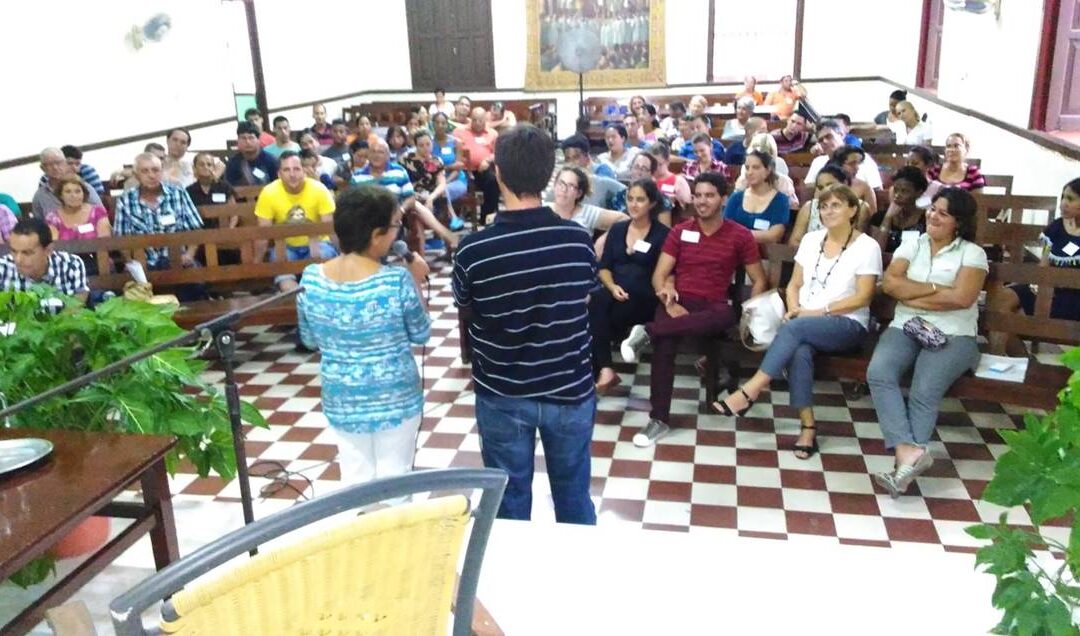
12 Dec 2017 | Focolare Worldwide
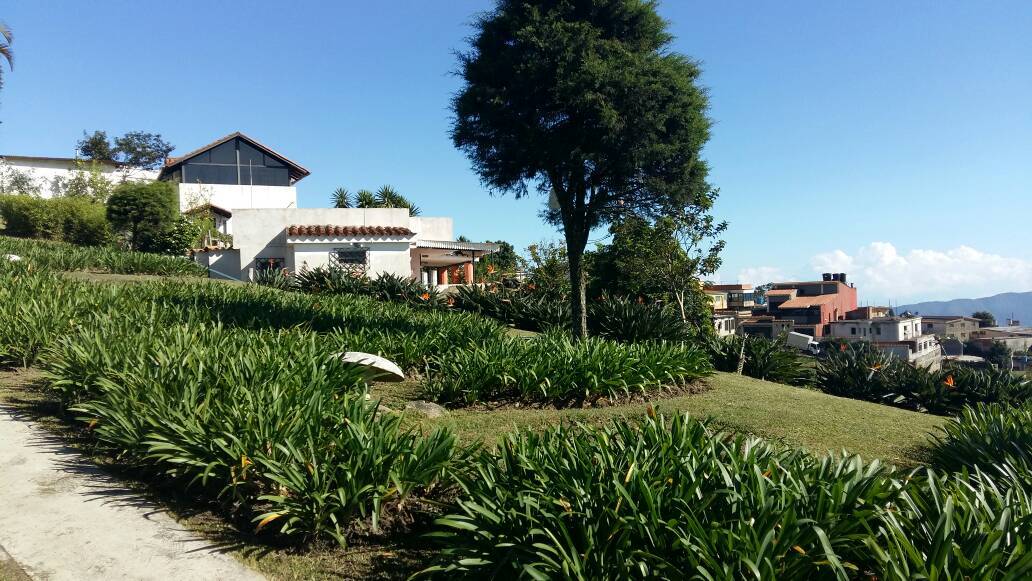 Ongoing emergencies, but also much solidarity and desire to get things going again. It is a difficult socio-political scene in Venezuela: soaring inflation, the persistent increase in the number of people living in extreme poverty, the lack of basic human necessities, and violent clashes. In Cuba and Puerto Rico, recontstruction has been hard because of the exodus of thousands of people, and the lack of electricity and drinking water. Yet, in the midst of it all, the vitality of the Caribbean people and the will to begin again has never faded. María Augusta and José Juan, from the Focolare community in the Carribean region report: “The general situation in Venezuela is quite painful, because of the lack of food and medicines, and also because of the growing uncertainty and helplessness and the continuing exodus of the people who are leaving the country. The list of our friends who have already left and of others who are attempting to leave, is long. In spite of this we have to “stay” at the foot of the cross, in the midst of much suffering, in the hope of a resurrection. But we can already see the Resurrection happening in many people, in their depth and in the Christian solidarity that animates them.”
Ongoing emergencies, but also much solidarity and desire to get things going again. It is a difficult socio-political scene in Venezuela: soaring inflation, the persistent increase in the number of people living in extreme poverty, the lack of basic human necessities, and violent clashes. In Cuba and Puerto Rico, recontstruction has been hard because of the exodus of thousands of people, and the lack of electricity and drinking water. Yet, in the midst of it all, the vitality of the Caribbean people and the will to begin again has never faded. María Augusta and José Juan, from the Focolare community in the Carribean region report: “The general situation in Venezuela is quite painful, because of the lack of food and medicines, and also because of the growing uncertainty and helplessness and the continuing exodus of the people who are leaving the country. The list of our friends who have already left and of others who are attempting to leave, is long. In spite of this we have to “stay” at the foot of the cross, in the midst of much suffering, in the hope of a resurrection. But we can already see the Resurrection happening in many people, in their depth and in the Christian solidarity that animates them.”  Ofelia from the Venezuelan community recounts: “It’s not easy to find answers to the problems we’re facing, like the lack of food, clothing and medicines. But we have Jesus’s words alive in our hearts: ‘Give and there will be gifts for you’, which we can live one day at a time. If someone doesn’t have food to eat, we can share a package of rice or medicine and all the things that we receive in thousands of ways. Each of us thinks of the other, life circulates and the community grows. In the midst of the violence and uncertainty, the presence of Jesus among us is like a flame that attracts and gives hope.” María Augusta e José Juan are always the ones to report on Cuba: “Last weekend a Mariapolis was held in Santiago with around 200 people, a sign of hope that continues to rise in the midst of the many difficulties that everyone has to face.” And from the community in Puerto Rico: “As you know, they have been living through truly tragic months due to the devastating effects of the hurricaine which destroyed the island. Very touching testimonies of Gospel love continue to arrive.” Here are a few: “Fifty six days without water, and electricity for only 30 minutes a day. It’s not easy to work in the office with the intense heat, but we do it! The flashlight provides a bit of light, the water bottles can be left in the afternoon sun, so that one has a bit of warm water to bathe with. For the heat, a hand fan or spray bottle of water and alcohol can provide some refreshment…” “Some young people from the Movement and the Inmaculado Corazón de María Parish in Patillas, along with some students from Saint Ignatius College have distributed rations to the needy – 237 sacks of food in all.” “My experience at Palma Sola was quite hard because of the destruction and lack of everything. Offering my service, with my entire family, was the most beautiful thing I’ve ever done in my life.” “We always have something to give, evaluating what we really need and offering the rest to the people who are more in need.” “We went to the Recio community in the Guardarraya di Patillas barrio. It was hard to get there because of the condition of the roads after the hurricaine. Beginning from the outskirts where there was total devastation, we found elderly people with tired and discouraged expressions, people with asthma problems, ulcers on their legs, diabetics (and the problem of finding a way to conserve the insulin without electricity), people suffering from high blood pressure… One boy had a skin allergy. We made an attempt to use the old community aquaduct to make up for the lack of water.” “In Gurabo we were able to know our neighbours better by helping them in their need.” “Carrying on and getting on our feet again doesn’t only depend on the government, nor the military, nor help from abroad. It also depends on us, on me, on you. Together, we’ll get it done!”
Ofelia from the Venezuelan community recounts: “It’s not easy to find answers to the problems we’re facing, like the lack of food, clothing and medicines. But we have Jesus’s words alive in our hearts: ‘Give and there will be gifts for you’, which we can live one day at a time. If someone doesn’t have food to eat, we can share a package of rice or medicine and all the things that we receive in thousands of ways. Each of us thinks of the other, life circulates and the community grows. In the midst of the violence and uncertainty, the presence of Jesus among us is like a flame that attracts and gives hope.” María Augusta e José Juan are always the ones to report on Cuba: “Last weekend a Mariapolis was held in Santiago with around 200 people, a sign of hope that continues to rise in the midst of the many difficulties that everyone has to face.” And from the community in Puerto Rico: “As you know, they have been living through truly tragic months due to the devastating effects of the hurricaine which destroyed the island. Very touching testimonies of Gospel love continue to arrive.” Here are a few: “Fifty six days without water, and electricity for only 30 minutes a day. It’s not easy to work in the office with the intense heat, but we do it! The flashlight provides a bit of light, the water bottles can be left in the afternoon sun, so that one has a bit of warm water to bathe with. For the heat, a hand fan or spray bottle of water and alcohol can provide some refreshment…” “Some young people from the Movement and the Inmaculado Corazón de María Parish in Patillas, along with some students from Saint Ignatius College have distributed rations to the needy – 237 sacks of food in all.” “My experience at Palma Sola was quite hard because of the destruction and lack of everything. Offering my service, with my entire family, was the most beautiful thing I’ve ever done in my life.” “We always have something to give, evaluating what we really need and offering the rest to the people who are more in need.” “We went to the Recio community in the Guardarraya di Patillas barrio. It was hard to get there because of the condition of the roads after the hurricaine. Beginning from the outskirts where there was total devastation, we found elderly people with tired and discouraged expressions, people with asthma problems, ulcers on their legs, diabetics (and the problem of finding a way to conserve the insulin without electricity), people suffering from high blood pressure… One boy had a skin allergy. We made an attempt to use the old community aquaduct to make up for the lack of water.” “In Gurabo we were able to know our neighbours better by helping them in their need.” “Carrying on and getting on our feet again doesn’t only depend on the government, nor the military, nor help from abroad. It also depends on us, on me, on you. Together, we’ll get it done!”
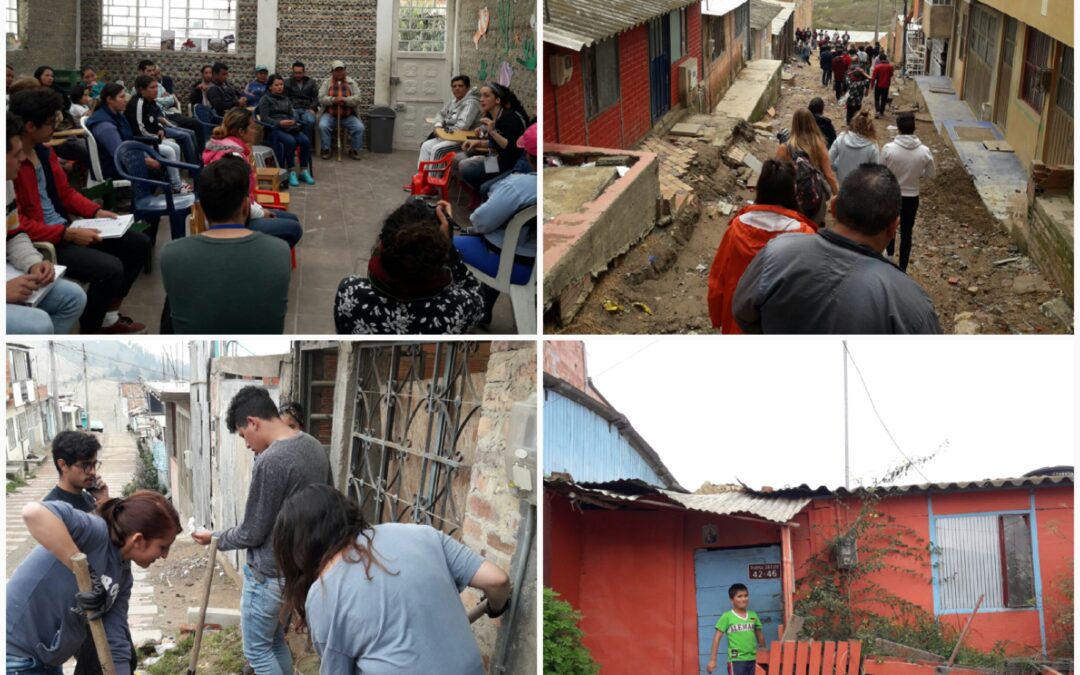
11 Dec 2017 | Non categorizzato
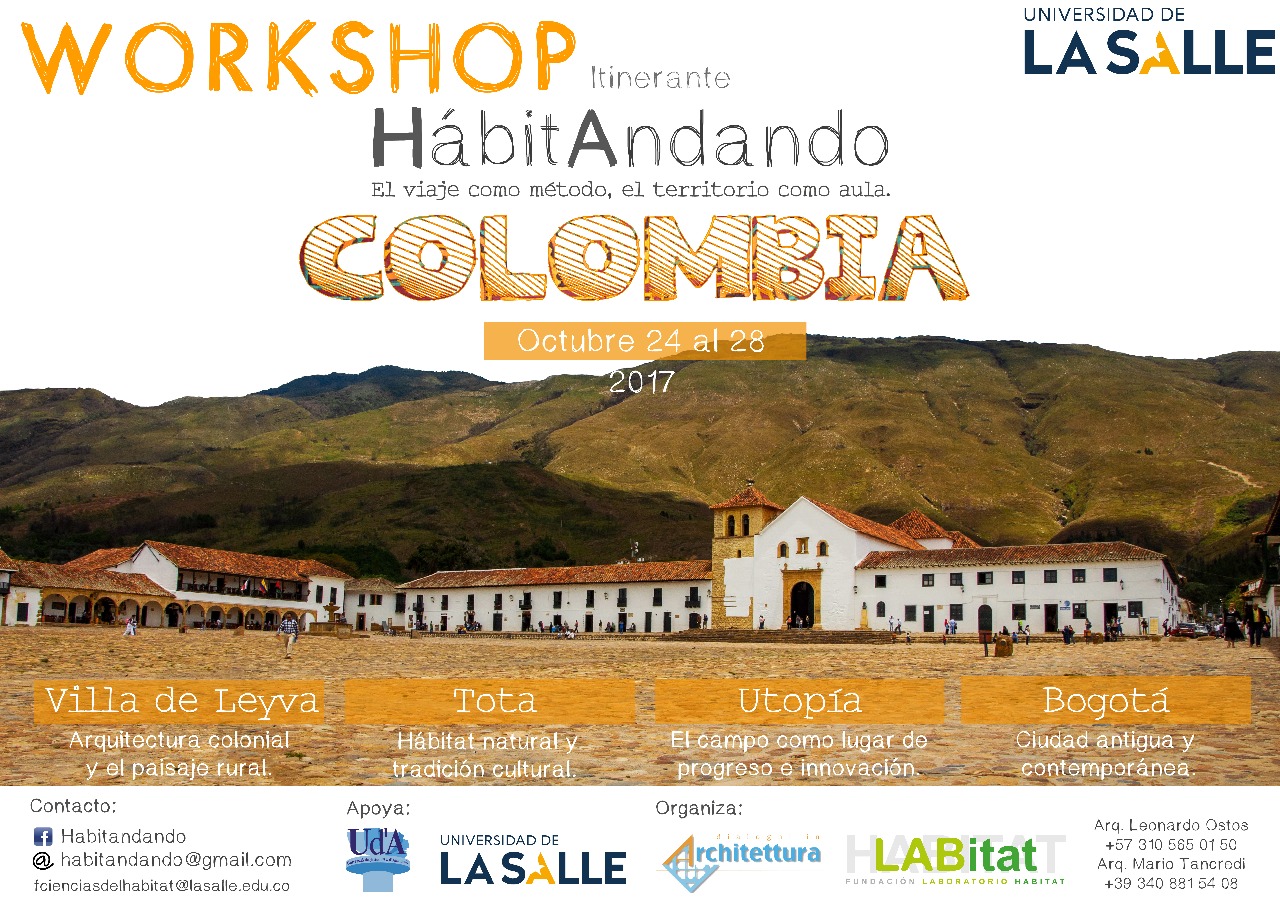 The trip, which is organized by the international Dialogue in Architecture network and the La Salle University of Bogota, isn’t tourism, but an experience of living together, getting to know places, cultures, businesses and associations. The departure was from Bogota, south of the city. The puzzled looks on the faces of the Italians showed that they had to “shift their gaze” in order to place themselves with their heart and mind in this land of many contrast and with a different relationship to the environment. We passed over the eastern Cordillera and reach Villanueva, a colonial town in the mountains where time seemed to have stood still. We helped out in an earthquake evacuation drill as we gathered in square with the locals, which allowed us to share in this communitarian moment with them. The journey continued along a long downhill road that twisted through tunnels and led to the discovery of the intense green of the mountains and fabulous landscape views. We reached the port of Llano, Villavicencio. The temperature was hot, just like the warmth of the people we me. A majestic tree shaded us from the sun. We got back on the road and passed through el llano, a vast expanse of land. Here we visited the l’Università Unitrópico, which has begun an interdisciplinary course on social architecture.
The trip, which is organized by the international Dialogue in Architecture network and the La Salle University of Bogota, isn’t tourism, but an experience of living together, getting to know places, cultures, businesses and associations. The departure was from Bogota, south of the city. The puzzled looks on the faces of the Italians showed that they had to “shift their gaze” in order to place themselves with their heart and mind in this land of many contrast and with a different relationship to the environment. We passed over the eastern Cordillera and reach Villanueva, a colonial town in the mountains where time seemed to have stood still. We helped out in an earthquake evacuation drill as we gathered in square with the locals, which allowed us to share in this communitarian moment with them. The journey continued along a long downhill road that twisted through tunnels and led to the discovery of the intense green of the mountains and fabulous landscape views. We reached the port of Llano, Villavicencio. The temperature was hot, just like the warmth of the people we me. A majestic tree shaded us from the sun. We got back on the road and passed through el llano, a vast expanse of land. Here we visited the l’Università Unitrópico, which has begun an interdisciplinary course on social architecture. 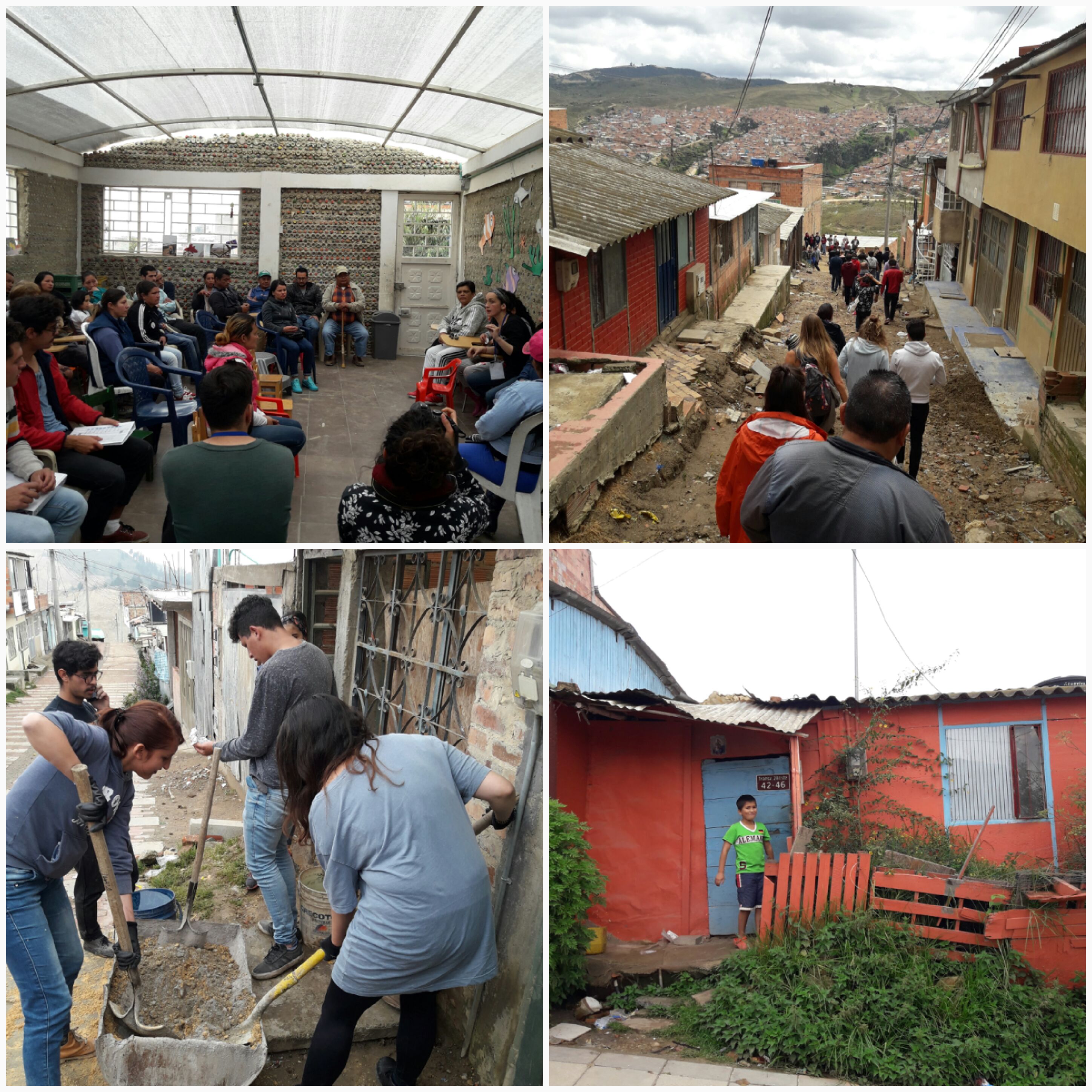 As in all Latin American countries, the architecture in Colombia is an expression of local society and emerges from the relationships with the communities. La Salle’s University’s Utopia Campus can be found in the region of Yopal, a place for young people who come from the rural regions and are often the victims of guerrilla violence. The course provides them with a work-study program that allows them to earn a diploma in Agrarian Sciences, and the possibility to get a job. It’s a concrete peace education experiment that seems to be working. We were halfway through our trip and after a delicious local style breakfast, we headed towards the colonial villages of Mongu and Tunja, Colombia’s original capital. In the grand colonial plazas, like Villa de Lyva, we came face to face with the indigenous populations who convey their strong identity which today is well integrated with their local colonial architecture. We returned to Bogotá in the North. The impact is almost stronger than in the south. We drove through the wealthiest zone that has its houses all surrounded by security walls. The experience continued with the workshop organized by the Urban Observatory of La Salle University on the Altos de Cazucá where we stayed for a week, getting to know families, enjoying their food and sleeping in their homes. It had a strong impact on us. We were in the company of university students from Germany, Bogotá and Yopal. There the poverty level is quite high, but the solidarity and kinds of relationships that exist showed us the real identity of this place. The work experience was quite new to us! We had to finish the exterior work on several houses: gardens, paint work, equipping a library and designing murals that depict the life of the community. An entire family was represented by birds, among them a son who was murdered by local delinquents, a sorrow we shared with them. One of the young people from the neighbourhood said to us: “We’ve worked together and made our neighbourhood beautiful now. We’ll carry on, finishing the roads.” Their gazes penetrated our hearts, and we felt great enthusiasm and hope. The intercultural exchange was real, a true enrichment when doing architecture together. Offering one’s talents as an architect can help to reconstruct the social fabric by providing spaces that help to preserve and grow the identity of a place together with its community.
As in all Latin American countries, the architecture in Colombia is an expression of local society and emerges from the relationships with the communities. La Salle’s University’s Utopia Campus can be found in the region of Yopal, a place for young people who come from the rural regions and are often the victims of guerrilla violence. The course provides them with a work-study program that allows them to earn a diploma in Agrarian Sciences, and the possibility to get a job. It’s a concrete peace education experiment that seems to be working. We were halfway through our trip and after a delicious local style breakfast, we headed towards the colonial villages of Mongu and Tunja, Colombia’s original capital. In the grand colonial plazas, like Villa de Lyva, we came face to face with the indigenous populations who convey their strong identity which today is well integrated with their local colonial architecture. We returned to Bogotá in the North. The impact is almost stronger than in the south. We drove through the wealthiest zone that has its houses all surrounded by security walls. The experience continued with the workshop organized by the Urban Observatory of La Salle University on the Altos de Cazucá where we stayed for a week, getting to know families, enjoying their food and sleeping in their homes. It had a strong impact on us. We were in the company of university students from Germany, Bogotá and Yopal. There the poverty level is quite high, but the solidarity and kinds of relationships that exist showed us the real identity of this place. The work experience was quite new to us! We had to finish the exterior work on several houses: gardens, paint work, equipping a library and designing murals that depict the life of the community. An entire family was represented by birds, among them a son who was murdered by local delinquents, a sorrow we shared with them. One of the young people from the neighbourhood said to us: “We’ve worked together and made our neighbourhood beautiful now. We’ll carry on, finishing the roads.” Their gazes penetrated our hearts, and we felt great enthusiasm and hope. The intercultural exchange was real, a true enrichment when doing architecture together. Offering one’s talents as an architect can help to reconstruct the social fabric by providing spaces that help to preserve and grow the identity of a place together with its community.
10 Dec 2017 | Non categorizzato
December 11, 1948 was universally proclaimed Human Rights Day. Since then, on the same day every year this Declaration is commemorated, as adopted by the Human Rights Commission of the U.N. headed in those times by Eleanor Roosevelt, wife of the United States President, Franklin D. Roosevelt, to call attention to the importance and defense of the dignity of the human person. The document is a sort of censorship between the era prior to 1948, in which the indignation for the iniquities of the world was entrusted to some sporadic event, and the following era in which for the first time, the need to counter inequality in all the States of the world was firmly recognised. The recognition of the validity of such a Charter and the literal application of the 30 articles, would obliterate the following from our corrupt society: slavery, torture, racism, violence of all sorts, abuse of minors, man’s exploitation of man, and also impoverishment, abuse and pollution of environmental resources.
9 Dec 2017 | Non categorizzato
In the modern world, obedience is no longer appreciated for what it truly is. The appeal for liberty, equality and fraternity proclaimed during the French Revolution is reflected daily in our newspapers, our homes and streets and even in our parishes, convents and monasteries. … It follows that we often find in our subconscious a veiled sense of distrust concerning this precious virtue, almost as if it were in opposition to the discovery that the Gospel makes us all brothers and sisters in Christ. … Obedience does not imply abdicating our own personality or an inhuman humiliation. Quite the opposite, it helps us be truly ourselves and develop our personality, because it puts us in a social context that is essential, from both a human and a divine point of view, to the true manifestation of our skills. When the will of those who are my legitimate superiors in civil or ecclesiastical governance tells me what to do or what to avoid, even if it contrasts with my projects and ideas, it always raises me up to a broader and more general level, the level of the common good. The sense of hindrance and resistance that I feel, due to this contrast, is the contribution I must make to being raised up. It is then that I become more fully human. The more I find myself united with others, the more I discover we are brothers and sisters. This fraternity is the outcome of fellowship. Far from being in contrast to fraternity, obedience becomes an indispensable means for creating it. … Often, when speaking of this virtue, people talk only of its ascetic side, the progress made by someone who renounces their own will, the freedom from their passions that they acquire, and so on. This is of course true, but obedience gives us something better still. It makes us mystical sharers in Christ’s humanity and allows us to experience the mind of Christ in our lives (cf. Phil 2:5) Mary is the perfect model of this inner obedience. We see this in her reply to the Angel Gabriel, “Here am I, the servant of the Lord”, and when she travelled to Bethlehem following the edict put out by the Roman Emperor. We see it in her “haste” to go and help Elizabeth after she had the inspiration to do so, and when she asked Jesus for a miracle during the wedding feast at Cana. We see it on Calvary, when she gave up the Son of God to stay with John, and later when she prayed with the apostles while awaiting the coming of the Holy Spirit. Her life was in continual obedience to God alone, by obeying people and circumstances. By letting Mary live again in us, we will share in her inner depths and her willingness. An example of this was Andrea Ferrari, a focolarino who was dying [after a road accident]. Someone spoke to him about accepting God’s will and he answered with a wittiness that revealed his deep union with God, “We have learned to recognise God’s will always, even in front of a red traffic light”. Translated from: Pasquale Foresi – Parole di Vita [Words of Life] – Città Nuova 1963 – pp 197-8-9-200
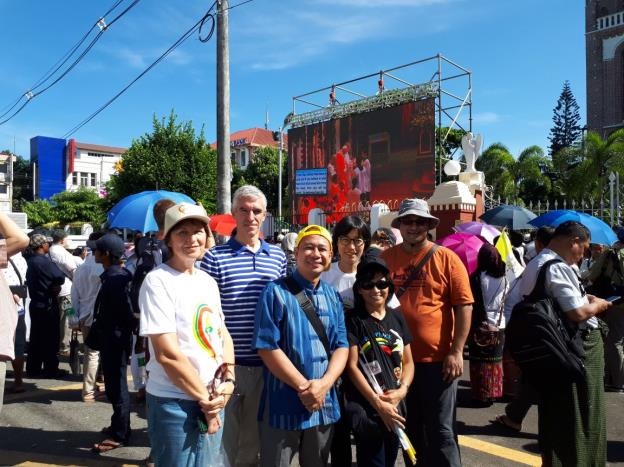
8 Dec 2017 | Focolare Worldwide
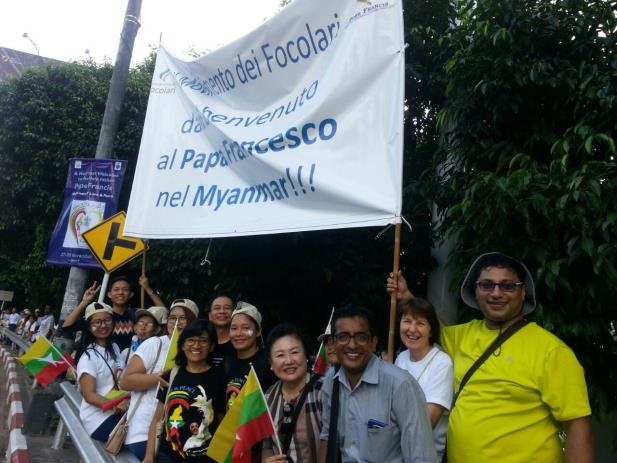 Peace, respect for the dignity of every people, and dialogue were some of the lofty goals left by Pope Francis to the populations he visited during his recent trip in Asia. Testimonies from the Focolare community have begun to arrive from Myanmar in recent days where, together with others, they were involved in taking care of different aspects of the trip – things like translations, maintaining order, health care, and the orchestra. Here are a few of the reports: “Pope Francis’s coming was a dream come true for us. It took a while for the amazement to become conscious awareness of what was really happening.” “The tears streamed down the cheeks of the elderly. But also the youth, for whom it was more difficult to grasp what was taking place, were overjoyed.” The small minority of Catholics in the country felt encouraged: “We were a little flock and isolated. Finally we saw our shepherd up close. These people are no longer on the margins, but under the world spotlight. Finally something happened to be proud of. The Pope is in Myanmar.” “We don’t have to be afraid of anything anymore.”
Peace, respect for the dignity of every people, and dialogue were some of the lofty goals left by Pope Francis to the populations he visited during his recent trip in Asia. Testimonies from the Focolare community have begun to arrive from Myanmar in recent days where, together with others, they were involved in taking care of different aspects of the trip – things like translations, maintaining order, health care, and the orchestra. Here are a few of the reports: “Pope Francis’s coming was a dream come true for us. It took a while for the amazement to become conscious awareness of what was really happening.” “The tears streamed down the cheeks of the elderly. But also the youth, for whom it was more difficult to grasp what was taking place, were overjoyed.” The small minority of Catholics in the country felt encouraged: “We were a little flock and isolated. Finally we saw our shepherd up close. These people are no longer on the margins, but under the world spotlight. Finally something happened to be proud of. The Pope is in Myanmar.” “We don’t have to be afraid of anything anymore.” 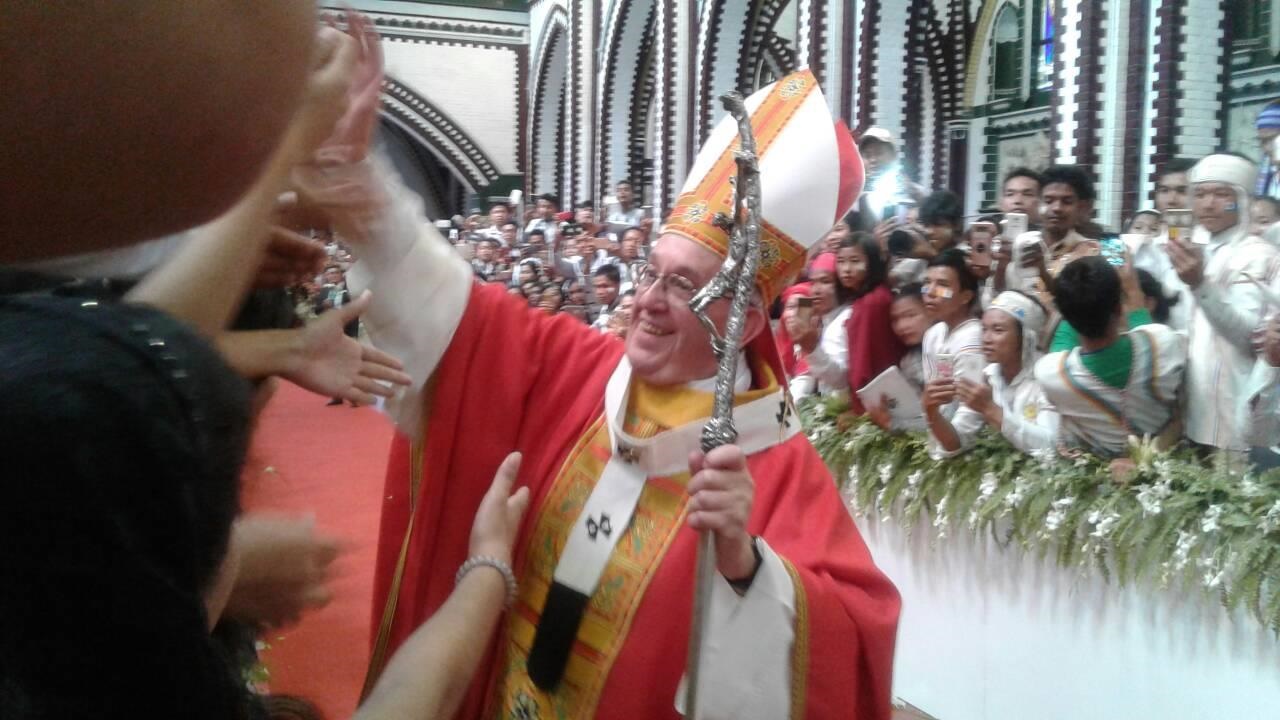 Gennie works with Internally Displaced Persons (IDP), civilians who are forced to escape persecutions and, unlike refugees, haven’t crossed international borders. In the majority of cases, while waiting for a new life, they’re deprived of help and protection. After Pope Francis’s visit, she writes: “Today this hope is renewed. “My own personal hope is in Love, and from now on it will be more and more alive in me.” “On November 28 we left with a group of a hundred people from the farthest villages of the country. We travelled in at least five buses. “The trip was organized by our parish. Seeing the Pope was like a dream for us. We left at nine o’clock in the morning and travelled for ten hours. We were full of enthusiasm, we prayed and sang. We took a short-cut, but it took all of us around twenty hours to get there because we didn’t want to let our friends fall behind and be on their own. But nobody complained about that.”
Gennie works with Internally Displaced Persons (IDP), civilians who are forced to escape persecutions and, unlike refugees, haven’t crossed international borders. In the majority of cases, while waiting for a new life, they’re deprived of help and protection. After Pope Francis’s visit, she writes: “Today this hope is renewed. “My own personal hope is in Love, and from now on it will be more and more alive in me.” “On November 28 we left with a group of a hundred people from the farthest villages of the country. We travelled in at least five buses. “The trip was organized by our parish. Seeing the Pope was like a dream for us. We left at nine o’clock in the morning and travelled for ten hours. We were full of enthusiasm, we prayed and sang. We took a short-cut, but it took all of us around twenty hours to get there because we didn’t want to let our friends fall behind and be on their own. But nobody complained about that.” 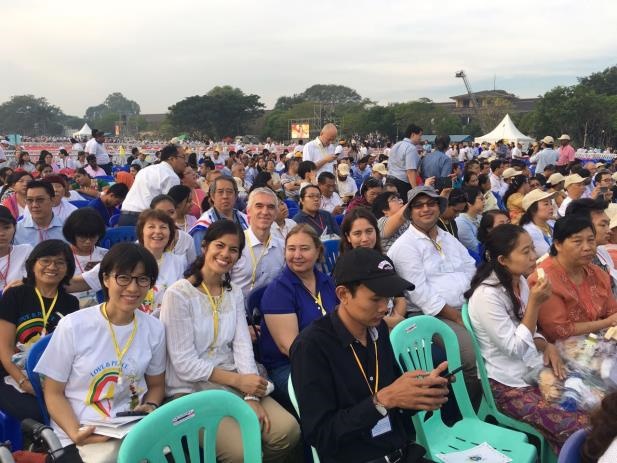 The group reached Kyaikkasan Ground of Yangon at around 5:30 in the morning as Mass was about to begin. It was attended not only by the small Catholic minority, but also by Muslims, Buddhists and faithful of different religions. “Our group couldn’t get in, but we found a spot near one of the entrances. Through the Pope we were able to feel the Church’s love for the smallest flock. You could sense a very strong love also among the whole population, not only among the Christians. Our taxi driver told us that he had been driving people for free to the stadium since early morning, and that the public trains were doing the same.” One Buddhist youth, who had just attended the Mass, wrote: “Here too I felt I was in a family. I notice a deep peace in my heart.”
The group reached Kyaikkasan Ground of Yangon at around 5:30 in the morning as Mass was about to begin. It was attended not only by the small Catholic minority, but also by Muslims, Buddhists and faithful of different religions. “Our group couldn’t get in, but we found a spot near one of the entrances. Through the Pope we were able to feel the Church’s love for the smallest flock. You could sense a very strong love also among the whole population, not only among the Christians. Our taxi driver told us that he had been driving people for free to the stadium since early morning, and that the public trains were doing the same.” One Buddhist youth, who had just attended the Mass, wrote: “Here too I felt I was in a family. I notice a deep peace in my heart.”  Gennie continues: “The new criteria that should be observed from now on are totally topsy turvey and new: the VIPs are all there in the Magnificat . . . He has raised up the lowly . . . filled the hungry with good things.” “We have to thank everyone for this experience – the Yangonians, who were always so patient with the crowd; the people who prepared the event, but especially Pope Francis who made the decision to come to such a far-away land. It’s a new daybreak for Myanmar.” Valentina is a medical doctor. She and other doctors lent their services to help with the health care. “It was an occasion that put us together, without borders. We Catholic and non-Catholic doctors worked straight through and were very tired, but we received a sort of grace, that of being able to love without stopping.” Jerome worked as a translator: “For me it was especially beautiful to see the youth waiting from early in the morning at the Cathedral of St Mary in Yangon. At the end of the Mass the Pope turned to us with lots of encouragement for us to work or peace. I now feel called to greater generosity, to be joyful and brave as he asked us to be.”
Gennie continues: “The new criteria that should be observed from now on are totally topsy turvey and new: the VIPs are all there in the Magnificat . . . He has raised up the lowly . . . filled the hungry with good things.” “We have to thank everyone for this experience – the Yangonians, who were always so patient with the crowd; the people who prepared the event, but especially Pope Francis who made the decision to come to such a far-away land. It’s a new daybreak for Myanmar.” Valentina is a medical doctor. She and other doctors lent their services to help with the health care. “It was an occasion that put us together, without borders. We Catholic and non-Catholic doctors worked straight through and were very tired, but we received a sort of grace, that of being able to love without stopping.” Jerome worked as a translator: “For me it was especially beautiful to see the youth waiting from early in the morning at the Cathedral of St Mary in Yangon. At the end of the Mass the Pope turned to us with lots of encouragement for us to work or peace. I now feel called to greater generosity, to be joyful and brave as he asked us to be.”
8 Dec 2017 | Non categorizzato
Today, December 8th, is celebrated one of the most heartfelt and popular feasts dedicated by the Catholic Church to the Virgin Mary: the Feast of the Immaculate Conception. It falls on the the day when, in 1854, Pope Pius IX, through the papal bull entitled “Ineffabilis Deus” (Ineffable God), sanctioned that the Virgin Mary, by means of “a singular grace and privilege”, had been preserved from that common heritage of the human race, which is original sin, from the first moment of her conception. This formulation follows a long series of theological disputes about the birth of the mother of Jesus. In the East, from as far back as the sixth century AD, there was a celebration of the conception of Mary, which was widespread in the West from the 10th century onwards. The solemnity of the Immaculate Conception of the Virgin Mary is inserted within the context of Advent and Christmas, thus the expectation of the birth of Christ is awaited through the remembrance of the Mother.
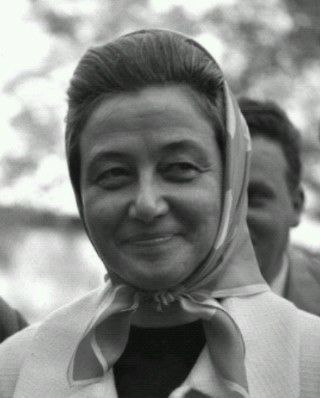
7 Dec 2017 | Non categorizzato
 “I believe that God can and wants to make good to be born from everything, even from the worst malice.” These were the words of Dietrich Bonhoeffer at the end of 1943 when the world was in the throes of a global war. That was the historical context in which the Focolare Movement was born. The first stone was set in Trent, Italy, on December 7, 1943 when a young woman in her twenties consecrated her life to God: Silvia Lubich who went by her Third Order Franciscan name of Chiara (Claire). And the weather seemed to make the contrast even more severe, according to the account that Lubich gives of her walk at dawn towards the Capuchin College for a private ceremony, during which she would consecrate herself to God forever. “There was a storm raging, so I had to make my way pushing the umbrella in front of me. Even that wasn’t without meaning. It seemed to say that the action I was about to take would be met with obstacles. The water and wind blowing against me seemed like the symbol of an adversary. When I reached the college, the whole scene changed: A huge door opened in front of me on its own. There was a sense of relief and welcome, almost like God’s arms opening to me, as He was waiting for me.” That change of scene was reflected in her life. The completeness and sacredness of that action that took place in total seclusion and poverty – only three red carnations to celebrate with – were more sonorous in Chiara soul than all the atrocities of the War that stood as the backdrop, almost the “picture frame” of that scene. For her, the real scene was the one that God whom she had discovered to be Love was building around her. “There was an ideal, only one, that would never fall short, not even if we died. It was God-Love. And we were totally stuck on him with all the strength of our being. We didn’t stick to Him because we had nothing else left, but because a Force in us was rendering us happy at having discovered Him in our life as the only All, the only Eternal, the only one worthy of being loved, because love never passes away, the only one, therefore, who would fully satisfy our heart’s needs. For years we had been receiving Holy Communion every day and believed, since we belonged to all the Catholic associations, that we were good Catholics. Only insofar as the Lord God took everything away from us to give us only Him, did we understand the First Command of God for the first time in our life: “Love me with all your heart, all your mind…..” It was only then that we truly felt should love Him like that, so totally, heart, mind and strength, in order not to deceive ourselves.” Lucia Abignente, “Qui c’è il dito di Dio”, (Rome: Città Nuova, 2017), 25-26.
“I believe that God can and wants to make good to be born from everything, even from the worst malice.” These were the words of Dietrich Bonhoeffer at the end of 1943 when the world was in the throes of a global war. That was the historical context in which the Focolare Movement was born. The first stone was set in Trent, Italy, on December 7, 1943 when a young woman in her twenties consecrated her life to God: Silvia Lubich who went by her Third Order Franciscan name of Chiara (Claire). And the weather seemed to make the contrast even more severe, according to the account that Lubich gives of her walk at dawn towards the Capuchin College for a private ceremony, during which she would consecrate herself to God forever. “There was a storm raging, so I had to make my way pushing the umbrella in front of me. Even that wasn’t without meaning. It seemed to say that the action I was about to take would be met with obstacles. The water and wind blowing against me seemed like the symbol of an adversary. When I reached the college, the whole scene changed: A huge door opened in front of me on its own. There was a sense of relief and welcome, almost like God’s arms opening to me, as He was waiting for me.” That change of scene was reflected in her life. The completeness and sacredness of that action that took place in total seclusion and poverty – only three red carnations to celebrate with – were more sonorous in Chiara soul than all the atrocities of the War that stood as the backdrop, almost the “picture frame” of that scene. For her, the real scene was the one that God whom she had discovered to be Love was building around her. “There was an ideal, only one, that would never fall short, not even if we died. It was God-Love. And we were totally stuck on him with all the strength of our being. We didn’t stick to Him because we had nothing else left, but because a Force in us was rendering us happy at having discovered Him in our life as the only All, the only Eternal, the only one worthy of being loved, because love never passes away, the only one, therefore, who would fully satisfy our heart’s needs. For years we had been receiving Holy Communion every day and believed, since we belonged to all the Catholic associations, that we were good Catholics. Only insofar as the Lord God took everything away from us to give us only Him, did we understand the First Command of God for the first time in our life: “Love me with all your heart, all your mind…..” It was only then that we truly felt should love Him like that, so totally, heart, mind and strength, in order not to deceive ourselves.” Lucia Abignente, “Qui c’è il dito di Dio”, (Rome: Città Nuova, 2017), 25-26.
6 Dec 2017 | Non categorizzato
The summer school will take place at Igarassu – Pernambuco, Brazil and is promoted by the Social-One international research network, a team of sociologists and social services experts which is inherently inspired by Chiara Lubich’s charisma of unity. Our scientific reflection has always been enriched by occasions of meeting and dialogue among researcher, scholars and social service professionals. The summer school, organized in partnership with the Department of Sociology of the Universidade Federal de Pernambuco and the Centro Universitário Tabosa de Almeida ASCES – UNITA, represents a special occasion of deep confrontation and scientific exchange. Aim of the summer school is to fathom the perspectives of analysis and actions aroused by the category of agapic love in the framework of the social sciences and humanities, believing that the concept could provide new interpretations and perspectives of interventions for the promotion of a society based on equity, inclusiveness and dialogue. In order to support the participation of young scholars, 18 scholarships are available for covering travel, accommodation and participation expenses. pdf School Programme pdf Call for scholarships pdf Presentation, application form and call for abstract Email contact: info@social-one.org
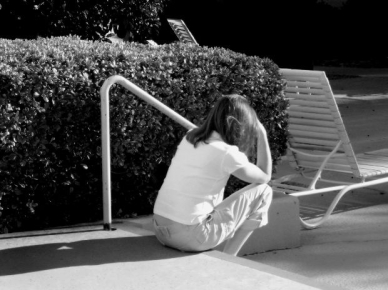
6 Dec 2017 | Non categorizzato
 Not a rival, but a daughter For quite some time, my relationship with my husband became difficult due to my mother-in-law. She could not detach herself from her son and considered me as the person who had robbed her of his affection. I was considering leaving my husband, the house and the children, when the Word of Life for that month arrived. That comment was regularly sent by my friends, but I never read it, even though I considered myself a Christian. But at the time I was devastated and God felt so far away. This time, however, I read it, and from the very first line I felt it spoke to my heart. In tears, I begged for God’s help. Days later, my husband and I participated in a meeting for families, as a last resort. In that atmosphere of openness, we found the strength to repeat our ”Yes”. It was the turning point of my life. Always with the help of the other couples, I managed to conquer my mother-in-law’s affection. With time she started to consider me no longer as a rival but as a daughter. When she fell ill, I assisted her with love and devotion, preparing her for her encounter with the Father. (Lucero – Columbia) Providence On the morning of 24 December I had gone to the market to buy food for Christmas Eve dinner. But I still had not thought of the drinks. On arriving home I received a letter from some acquaintances, asking for a loan. It corresponded to the sum of the drinks. I consulted Giselle and we replied: ”We are sending you the sum as a gift, don’t worry about repaying us!” Even if only with fresh water we passed a wonderful evening with songs and music. Days later, unexpectedly, we received a bigger sum than what we had given. (G.P. – Kenya) At the station I was about to go to my daughter who lives in another city, but on arriving in the station I realised that because I had stopped to welcome a person, the possiblity to have a discount for the elderly had expired. However, upon thinking that it was more worthwhile to have made an act of love than having a discounted ticket, I managed to stay serene. But then, while I was at the teller’s the clerk told me that for that day, and not only that???, they had programmed a sole discounted price for all destinations. The discount was more than double the price of what my pass would have allowed. (G.M. – Italy) The risk Sometimes one of our sons would invite a friend to sleep over at our place, one who was a bit unreliable. In the face of this situation, my husband and I decided to get to know him more. We discovered that he had left his family, and was suffering from a depression. Besides drinking, he also consumed drugs which he had also offered to our son. Despite our fear of this risk, we tried to love him the way the Gospel teaches us to do. One day he confided that he had stopped taking drugs and now wanted to live like us. ”Your life has a meaning,” he said. With time, besides helping him to go to rehab, we contacted his parents who started to take care of him. (C.A. – Brazil)
Not a rival, but a daughter For quite some time, my relationship with my husband became difficult due to my mother-in-law. She could not detach herself from her son and considered me as the person who had robbed her of his affection. I was considering leaving my husband, the house and the children, when the Word of Life for that month arrived. That comment was regularly sent by my friends, but I never read it, even though I considered myself a Christian. But at the time I was devastated and God felt so far away. This time, however, I read it, and from the very first line I felt it spoke to my heart. In tears, I begged for God’s help. Days later, my husband and I participated in a meeting for families, as a last resort. In that atmosphere of openness, we found the strength to repeat our ”Yes”. It was the turning point of my life. Always with the help of the other couples, I managed to conquer my mother-in-law’s affection. With time she started to consider me no longer as a rival but as a daughter. When she fell ill, I assisted her with love and devotion, preparing her for her encounter with the Father. (Lucero – Columbia) Providence On the morning of 24 December I had gone to the market to buy food for Christmas Eve dinner. But I still had not thought of the drinks. On arriving home I received a letter from some acquaintances, asking for a loan. It corresponded to the sum of the drinks. I consulted Giselle and we replied: ”We are sending you the sum as a gift, don’t worry about repaying us!” Even if only with fresh water we passed a wonderful evening with songs and music. Days later, unexpectedly, we received a bigger sum than what we had given. (G.P. – Kenya) At the station I was about to go to my daughter who lives in another city, but on arriving in the station I realised that because I had stopped to welcome a person, the possiblity to have a discount for the elderly had expired. However, upon thinking that it was more worthwhile to have made an act of love than having a discounted ticket, I managed to stay serene. But then, while I was at the teller’s the clerk told me that for that day, and not only that???, they had programmed a sole discounted price for all destinations. The discount was more than double the price of what my pass would have allowed. (G.M. – Italy) The risk Sometimes one of our sons would invite a friend to sleep over at our place, one who was a bit unreliable. In the face of this situation, my husband and I decided to get to know him more. We discovered that he had left his family, and was suffering from a depression. Besides drinking, he also consumed drugs which he had also offered to our son. Despite our fear of this risk, we tried to love him the way the Gospel teaches us to do. One day he confided that he had stopped taking drugs and now wanted to live like us. ”Your life has a meaning,” he said. With time, besides helping him to go to rehab, we contacted his parents who started to take care of him. (C.A. – Brazil)
5 Dec 2017 | Non categorizzato
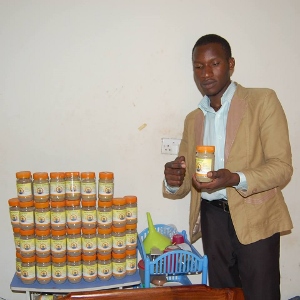
4 Dec 2017 | Focolare Worldwide
 Masaka, Kampala, Entebbe and great Lake Victoria – this is the wide territory that Henry has covered in his country, Uganda, the “pearl of Africa.” He’s gone from the village where he was born, to his economic studies at university in the capitol, to the shores of the largest lake on the continent. It is so large that it counts more than 3,000 islands. This is where the White Nile begins, which then flows into the longest river in Africa, the Nile. Everything is big in Uganda: the parks, the impenetrable forests, the nature reserves. Henry dreams big too. “At Masaka, where I went to university, I noticed how people didn’t have time to cook anymore,” he says. To resolve the problem, Henry started a business to produce meat and fish products. At just 24, together with two others his age, he started the Sseruh Food Processing Company Ltd. in Entebbe. On the other side of the world, in Argentina, another entrepreneur, Gonzalo Perrin, had already started a company some years ago: Pasticcino, which produces cookies for a number of cafeteria chains and coffee roasters. Urged on by the spirit of the Economy of Communion, Perrin moved to the Soladaridad industrial park at Mariapolis Lia, a little city of the Focolare. There he promotes a culture marked by the values of reciprocity, care for the disadvantaged and the environment.
Masaka, Kampala, Entebbe and great Lake Victoria – this is the wide territory that Henry has covered in his country, Uganda, the “pearl of Africa.” He’s gone from the village where he was born, to his economic studies at university in the capitol, to the shores of the largest lake on the continent. It is so large that it counts more than 3,000 islands. This is where the White Nile begins, which then flows into the longest river in Africa, the Nile. Everything is big in Uganda: the parks, the impenetrable forests, the nature reserves. Henry dreams big too. “At Masaka, where I went to university, I noticed how people didn’t have time to cook anymore,” he says. To resolve the problem, Henry started a business to produce meat and fish products. At just 24, together with two others his age, he started the Sseruh Food Processing Company Ltd. in Entebbe. On the other side of the world, in Argentina, another entrepreneur, Gonzalo Perrin, had already started a company some years ago: Pasticcino, which produces cookies for a number of cafeteria chains and coffee roasters. Urged on by the spirit of the Economy of Communion, Perrin moved to the Soladaridad industrial park at Mariapolis Lia, a little city of the Focolare. There he promotes a culture marked by the values of reciprocity, care for the disadvantaged and the environment.
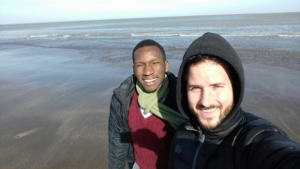
Henry Sserugo and Gonzalo Perrin

Henry shows the fish products of the Sseruh Food Processing Company Ltd
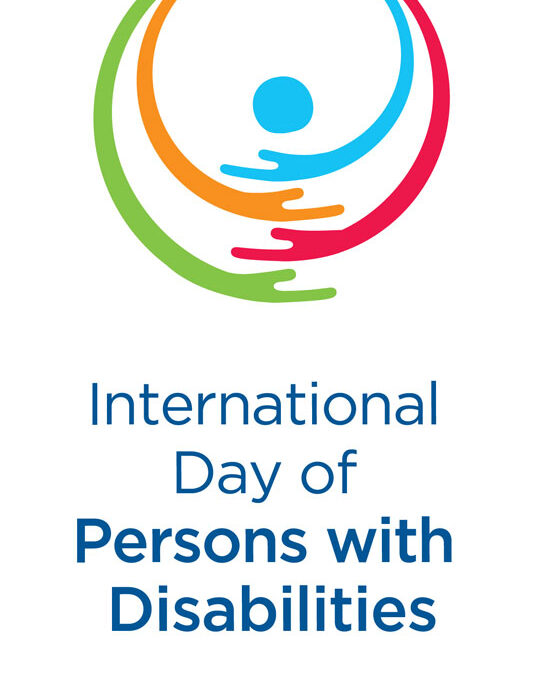
3 Dec 2017 | Non categorizzato
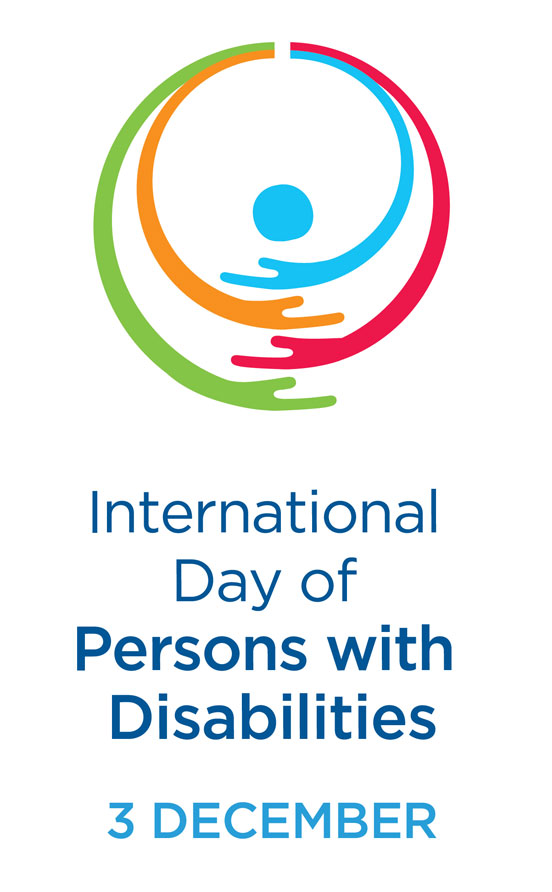 Established in 1981, the International Day of Persons with Disabilities is celebrated every year on 3 December, with the aim of encouraging and promoting a more widespread and in-depth knowledge on issues concerning differently-abled people, supporting full integration in all areas of life and removing all forms of discrimination and violence. Since July 1993, December 3 has also become the European Day for Persons with Disabilities, on the initiative of the European Commission and in agreement with the United Nations. To celebrate this Day, many countries will organise events in different areas of social life: in the field of education and work, urban planning and the development of new technologies geared towards differently-abled persons, as well as tourism accessible to the elderly.
Established in 1981, the International Day of Persons with Disabilities is celebrated every year on 3 December, with the aim of encouraging and promoting a more widespread and in-depth knowledge on issues concerning differently-abled people, supporting full integration in all areas of life and removing all forms of discrimination and violence. Since July 1993, December 3 has also become the European Day for Persons with Disabilities, on the initiative of the European Commission and in agreement with the United Nations. To celebrate this Day, many countries will organise events in different areas of social life: in the field of education and work, urban planning and the development of new technologies geared towards differently-abled persons, as well as tourism accessible to the elderly.
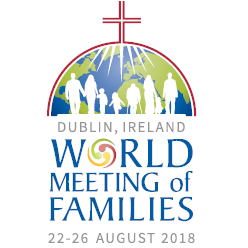
2 Dec 2017 | Non categorizzato
 Dublin, the capital of Ireland, will host the 9th World Meeting of Families, an initiative inaugurated by St. John Paul II in 1994, and since then held every three years in different international seats. The theme chosen for Dublin is “The Gospel of the Family: joy for the world.” Further to the two recent Synods on the family (2014-15) and the apostolic exhortation, Amoris Laetitia (2016) of Pope Francis, families and those who engage in “family” issues are looking forward to this event which will give prominence to the Christian family and its specific gift of being “joy for the world” and light in the challenges contemporary life poses. The event is being promoted by the new Pontifical Council for the Laity, Family and Life. Alberto and Anna Friso of the Focolare who work with this organization will also attend. But it is the host diocese that is preparing for the meeting with great passion, and has already set in motion a mighty organisational machine for the outlining of the programme, logistics, preparatory catechesis, and reception of participants. Also the Irish ”new families” are full of enthusiasm, and have relayed their willingness to collaborate in all ways with the organizational team created for this purpose by the diocese. During those days they will be happy to welcome to their country, the greatest number of ”new families” possible from all over the world, to live unforgettable moments of in-depth studies, communion and celebrations. Official website Program For info and registrations
Dublin, the capital of Ireland, will host the 9th World Meeting of Families, an initiative inaugurated by St. John Paul II in 1994, and since then held every three years in different international seats. The theme chosen for Dublin is “The Gospel of the Family: joy for the world.” Further to the two recent Synods on the family (2014-15) and the apostolic exhortation, Amoris Laetitia (2016) of Pope Francis, families and those who engage in “family” issues are looking forward to this event which will give prominence to the Christian family and its specific gift of being “joy for the world” and light in the challenges contemporary life poses. The event is being promoted by the new Pontifical Council for the Laity, Family and Life. Alberto and Anna Friso of the Focolare who work with this organization will also attend. But it is the host diocese that is preparing for the meeting with great passion, and has already set in motion a mighty organisational machine for the outlining of the programme, logistics, preparatory catechesis, and reception of participants. Also the Irish ”new families” are full of enthusiasm, and have relayed their willingness to collaborate in all ways with the organizational team created for this purpose by the diocese. During those days they will be happy to welcome to their country, the greatest number of ”new families” possible from all over the world, to live unforgettable moments of in-depth studies, communion and celebrations. Official website Program For info and registrations
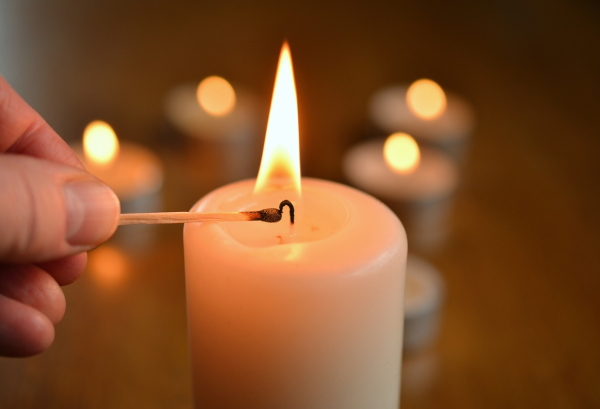
2 Dec 2017 | Non categorizzato
 Since Christmas is considered by most as one of the grand feasts, more sumptuous than sacred, it would be important to reflect on some of the theme aspects of this event, due to which the history of the world was cut into two sections, pre- and post-. Given the infinite importance of such an event, one would expect it to dawn amid grandeur, triumph, sounds and shots, with manifestations of power and the flow of millions of curious people. There is an abysmal contrast between the birth of a powerful figure, as the ancient world dreamt of and the obscure birth of Jesus, ignored by many; it is a contrast which in itself characterises the infinite originality of a Christ-king born of a poor woman in a stable. He really does not seem to be God and neither the most showy of men, but the last among them, immediately set at the most fearful level of degradation. He appears on the lowest rung of the social ladder, in order to immediately see from below all the human beings, and to be able to see with the eyes of the miserable. The start of his revolution does not foresee arrogance, but humility, to draw the sons of God to heaven, starting from those who ate and slept on the ground: the slaves, the jobless, the foreigners, and the scum. Liberty and love were born with that infant: his liberty is liberty of love. This is the immense discovery. Universal love that he taught aims to disperse a system of coexistence made up mostly of political power, abuse of authority, idle usury, despise for work, degradation of woman, and corrosive envy. Logically, for the people embedded in such system that announcement is a folly: good for the prison and the gallows. Blessed are the poor and those who make themselves poor to help the miserable… Just imagine the fury of those who consider money as the utmost good… “It was said to the elders: do not kill. But I say to you; whoever rages against his brother will be judged…” The maxim seemed, and still seems detrimental to the honour of the warfarers and the warfaring industries, while not hating one’s brother means putting an end to brawls, factions and violence. The maxim would picture society as a peaceful coexistence where, instead of shouting and shooting, the people would laugh and eat. Life, in peace, would allow us to make every day, Christmas. And this is the revolution of Christ: to make us be reborn continually against the curse of death. And so the utmost commandment is to love man, which is like loving God. Love the other to the point of giving one’s life for him. This in brief is the meaning of Christmas: a review of the past, and the end of wars, torbid passions, and avarice; the start of universal love which admits no divisions of race, castes, classes, politics…. With his life and death Jesus preached and taught life. And so Christmas can be celebrated also with cake, if it helps to create love, but is celebrated above all with reconciliation, that puts an end to the diseases of the spirit and gives health. It is celebrated in gratitude to Jesus and Mary, who suffered to teach us and help us put an end to our suffering. Igino Giordani, Christmas as a revolution, New City, Rome 1974, n.24, p.18
Since Christmas is considered by most as one of the grand feasts, more sumptuous than sacred, it would be important to reflect on some of the theme aspects of this event, due to which the history of the world was cut into two sections, pre- and post-. Given the infinite importance of such an event, one would expect it to dawn amid grandeur, triumph, sounds and shots, with manifestations of power and the flow of millions of curious people. There is an abysmal contrast between the birth of a powerful figure, as the ancient world dreamt of and the obscure birth of Jesus, ignored by many; it is a contrast which in itself characterises the infinite originality of a Christ-king born of a poor woman in a stable. He really does not seem to be God and neither the most showy of men, but the last among them, immediately set at the most fearful level of degradation. He appears on the lowest rung of the social ladder, in order to immediately see from below all the human beings, and to be able to see with the eyes of the miserable. The start of his revolution does not foresee arrogance, but humility, to draw the sons of God to heaven, starting from those who ate and slept on the ground: the slaves, the jobless, the foreigners, and the scum. Liberty and love were born with that infant: his liberty is liberty of love. This is the immense discovery. Universal love that he taught aims to disperse a system of coexistence made up mostly of political power, abuse of authority, idle usury, despise for work, degradation of woman, and corrosive envy. Logically, for the people embedded in such system that announcement is a folly: good for the prison and the gallows. Blessed are the poor and those who make themselves poor to help the miserable… Just imagine the fury of those who consider money as the utmost good… “It was said to the elders: do not kill. But I say to you; whoever rages against his brother will be judged…” The maxim seemed, and still seems detrimental to the honour of the warfarers and the warfaring industries, while not hating one’s brother means putting an end to brawls, factions and violence. The maxim would picture society as a peaceful coexistence where, instead of shouting and shooting, the people would laugh and eat. Life, in peace, would allow us to make every day, Christmas. And this is the revolution of Christ: to make us be reborn continually against the curse of death. And so the utmost commandment is to love man, which is like loving God. Love the other to the point of giving one’s life for him. This in brief is the meaning of Christmas: a review of the past, and the end of wars, torbid passions, and avarice; the start of universal love which admits no divisions of race, castes, classes, politics…. With his life and death Jesus preached and taught life. And so Christmas can be celebrated also with cake, if it helps to create love, but is celebrated above all with reconciliation, that puts an end to the diseases of the spirit and gives health. It is celebrated in gratitude to Jesus and Mary, who suffered to teach us and help us put an end to our suffering. Igino Giordani, Christmas as a revolution, New City, Rome 1974, n.24, p.18

 Ongoing emergencies, but also much solidarity and desire to get things going again. It is a difficult socio-political scene in Venezuela: soaring inflation, the persistent increase in the number of people living in extreme poverty, the lack of basic human necessities, and violent clashes. In Cuba and Puerto Rico, recontstruction has been hard because of the exodus of thousands of people, and the lack of electricity and drinking water. Yet, in the midst of it all, the vitality of the Caribbean people and the will to begin again has never faded. María Augusta and José Juan, from the Focolare community in the Carribean region report: “The general situation in Venezuela is quite painful, because of the lack of food and medicines, and also because of the growing uncertainty and helplessness and the continuing exodus of the people who are leaving the country. The list of our friends who have already left and of others who are attempting to leave, is long. In spite of this we have to “stay” at the foot of the cross, in the midst of much suffering, in the hope of a resurrection. But we can already see the Resurrection happening in many people, in their depth and in the Christian solidarity that animates them.”
Ongoing emergencies, but also much solidarity and desire to get things going again. It is a difficult socio-political scene in Venezuela: soaring inflation, the persistent increase in the number of people living in extreme poverty, the lack of basic human necessities, and violent clashes. In Cuba and Puerto Rico, recontstruction has been hard because of the exodus of thousands of people, and the lack of electricity and drinking water. Yet, in the midst of it all, the vitality of the Caribbean people and the will to begin again has never faded. María Augusta and José Juan, from the Focolare community in the Carribean region report: “The general situation in Venezuela is quite painful, because of the lack of food and medicines, and also because of the growing uncertainty and helplessness and the continuing exodus of the people who are leaving the country. The list of our friends who have already left and of others who are attempting to leave, is long. In spite of this we have to “stay” at the foot of the cross, in the midst of much suffering, in the hope of a resurrection. But we can already see the Resurrection happening in many people, in their depth and in the Christian solidarity that animates them.”  Ofelia from the Venezuelan community recounts: “It’s not easy to find answers to the problems we’re facing, like the lack of food, clothing and medicines. But we have Jesus’s words alive in our hearts: ‘Give and there will be gifts for you’, which we can live one day at a time. If someone doesn’t have food to eat, we can share a package of rice or medicine and all the things that we receive in thousands of ways. Each of us thinks of the other, life circulates and the community grows. In the midst of the violence and uncertainty, the presence of Jesus among us is like a flame that attracts and gives hope.” María Augusta e José Juan are always the ones to report on Cuba: “Last weekend a Mariapolis was held in Santiago with around 200 people, a sign of hope that continues to rise in the midst of the many difficulties that everyone has to face.” And from the community in Puerto Rico: “As you know, they have been living through truly tragic months due to the devastating effects of the hurricaine which destroyed the island. Very touching testimonies of Gospel love continue to arrive.” Here are a few: “Fifty six days without water, and electricity for only 30 minutes a day. It’s not easy to work in the office with the intense heat, but we do it! The flashlight provides a bit of light, the water bottles can be left in the afternoon sun, so that one has a bit of warm water to bathe with. For the heat, a hand fan or spray bottle of water and alcohol can provide some refreshment…” “Some young people from the Movement and the Inmaculado Corazón de María Parish in Patillas, along with some students from Saint Ignatius College have distributed rations to the needy – 237 sacks of food in all.” “My experience at Palma Sola was quite hard because of the destruction and lack of everything. Offering my service, with my entire family, was the most beautiful thing I’ve ever done in my life.” “We always have something to give, evaluating what we really need and offering the rest to the people who are more in need.” “We went to the Recio community in the Guardarraya di Patillas barrio. It was hard to get there because of the condition of the roads after the hurricaine. Beginning from the outskirts where there was total devastation, we found elderly people with tired and discouraged expressions, people with asthma problems, ulcers on their legs, diabetics (and the problem of finding a way to conserve the insulin without electricity), people suffering from high blood pressure… One boy had a skin allergy. We made an attempt to use the old community aquaduct to make up for the lack of water.” “In Gurabo we were able to know our neighbours better by helping them in their need.” “Carrying on and getting on our feet again doesn’t only depend on the government, nor the military, nor help from abroad. It also depends on us, on me, on you. Together, we’ll get it done!”
Ofelia from the Venezuelan community recounts: “It’s not easy to find answers to the problems we’re facing, like the lack of food, clothing and medicines. But we have Jesus’s words alive in our hearts: ‘Give and there will be gifts for you’, which we can live one day at a time. If someone doesn’t have food to eat, we can share a package of rice or medicine and all the things that we receive in thousands of ways. Each of us thinks of the other, life circulates and the community grows. In the midst of the violence and uncertainty, the presence of Jesus among us is like a flame that attracts and gives hope.” María Augusta e José Juan are always the ones to report on Cuba: “Last weekend a Mariapolis was held in Santiago with around 200 people, a sign of hope that continues to rise in the midst of the many difficulties that everyone has to face.” And from the community in Puerto Rico: “As you know, they have been living through truly tragic months due to the devastating effects of the hurricaine which destroyed the island. Very touching testimonies of Gospel love continue to arrive.” Here are a few: “Fifty six days without water, and electricity for only 30 minutes a day. It’s not easy to work in the office with the intense heat, but we do it! The flashlight provides a bit of light, the water bottles can be left in the afternoon sun, so that one has a bit of warm water to bathe with. For the heat, a hand fan or spray bottle of water and alcohol can provide some refreshment…” “Some young people from the Movement and the Inmaculado Corazón de María Parish in Patillas, along with some students from Saint Ignatius College have distributed rations to the needy – 237 sacks of food in all.” “My experience at Palma Sola was quite hard because of the destruction and lack of everything. Offering my service, with my entire family, was the most beautiful thing I’ve ever done in my life.” “We always have something to give, evaluating what we really need and offering the rest to the people who are more in need.” “We went to the Recio community in the Guardarraya di Patillas barrio. It was hard to get there because of the condition of the roads after the hurricaine. Beginning from the outskirts where there was total devastation, we found elderly people with tired and discouraged expressions, people with asthma problems, ulcers on their legs, diabetics (and the problem of finding a way to conserve the insulin without electricity), people suffering from high blood pressure… One boy had a skin allergy. We made an attempt to use the old community aquaduct to make up for the lack of water.” “In Gurabo we were able to know our neighbours better by helping them in their need.” “Carrying on and getting on our feet again doesn’t only depend on the government, nor the military, nor help from abroad. It also depends on us, on me, on you. Together, we’ll get it done!”
 The trip, which is organized by the international Dialogue in Architecture network and the La Salle University of Bogota, isn’t tourism, but an experience of living together, getting to know places, cultures, businesses and associations. The departure was from Bogota, south of the city. The puzzled looks on the faces of the Italians showed that they had to “shift their gaze” in order to place themselves with their heart and mind in this land of many contrast and with a different relationship to the environment. We passed over the eastern Cordillera and reach Villanueva, a colonial town in the mountains where time seemed to have stood still. We helped out in an earthquake evacuation drill as we gathered in square with the locals, which allowed us to share in this communitarian moment with them. The journey continued along a long downhill road that twisted through tunnels and led to the discovery of the intense green of the mountains and fabulous landscape views. We reached the port of Llano, Villavicencio. The temperature was hot, just like the warmth of the people we me. A majestic tree shaded us from the sun. We got back on the road and passed through el llano, a vast expanse of land. Here we visited the l’Università Unitrópico, which has begun an interdisciplinary course on social architecture.
The trip, which is organized by the international Dialogue in Architecture network and the La Salle University of Bogota, isn’t tourism, but an experience of living together, getting to know places, cultures, businesses and associations. The departure was from Bogota, south of the city. The puzzled looks on the faces of the Italians showed that they had to “shift their gaze” in order to place themselves with their heart and mind in this land of many contrast and with a different relationship to the environment. We passed over the eastern Cordillera and reach Villanueva, a colonial town in the mountains where time seemed to have stood still. We helped out in an earthquake evacuation drill as we gathered in square with the locals, which allowed us to share in this communitarian moment with them. The journey continued along a long downhill road that twisted through tunnels and led to the discovery of the intense green of the mountains and fabulous landscape views. We reached the port of Llano, Villavicencio. The temperature was hot, just like the warmth of the people we me. A majestic tree shaded us from the sun. We got back on the road and passed through el llano, a vast expanse of land. Here we visited the l’Università Unitrópico, which has begun an interdisciplinary course on social architecture.  As in all Latin American countries, the architecture in Colombia is an expression of local society and emerges from the relationships with the communities. La Salle’s University’s Utopia Campus can be found in the region of Yopal, a place for young people who come from the rural regions and are often the victims of guerrilla violence. The course provides them with a work-study program that allows them to earn a diploma in Agrarian Sciences, and the possibility to get a job. It’s a concrete peace education experiment that seems to be working. We were halfway through our trip and after a delicious local style breakfast, we headed towards the colonial villages of Mongu and Tunja, Colombia’s original capital. In the grand colonial plazas, like Villa de Lyva, we came face to face with the indigenous populations who convey their strong identity which today is well integrated with their local colonial architecture. We returned to Bogotá in the North. The impact is almost stronger than in the south. We drove through the wealthiest zone that has its houses all surrounded by security walls. The experience continued with the workshop organized by the Urban Observatory of La Salle University on the Altos de Cazucá where we stayed for a week, getting to know families, enjoying their food and sleeping in their homes. It had a strong impact on us. We were in the company of university students from Germany, Bogotá and Yopal. There the poverty level is quite high, but the solidarity and kinds of relationships that exist showed us the real identity of this place. The work experience was quite new to us! We had to finish the exterior work on several houses: gardens, paint work, equipping a library and designing murals that depict the life of the community. An entire family was represented by birds, among them a son who was murdered by local delinquents, a sorrow we shared with them. One of the young people from the neighbourhood said to us: “We’ve worked together and made our neighbourhood beautiful now. We’ll carry on, finishing the roads.” Their gazes penetrated our hearts, and we felt great enthusiasm and hope. The intercultural exchange was real, a true enrichment when doing architecture together. Offering one’s talents as an architect can help to reconstruct the social fabric by providing spaces that help to preserve and grow the identity of a place together with its community.
As in all Latin American countries, the architecture in Colombia is an expression of local society and emerges from the relationships with the communities. La Salle’s University’s Utopia Campus can be found in the region of Yopal, a place for young people who come from the rural regions and are often the victims of guerrilla violence. The course provides them with a work-study program that allows them to earn a diploma in Agrarian Sciences, and the possibility to get a job. It’s a concrete peace education experiment that seems to be working. We were halfway through our trip and after a delicious local style breakfast, we headed towards the colonial villages of Mongu and Tunja, Colombia’s original capital. In the grand colonial plazas, like Villa de Lyva, we came face to face with the indigenous populations who convey their strong identity which today is well integrated with their local colonial architecture. We returned to Bogotá in the North. The impact is almost stronger than in the south. We drove through the wealthiest zone that has its houses all surrounded by security walls. The experience continued with the workshop organized by the Urban Observatory of La Salle University on the Altos de Cazucá where we stayed for a week, getting to know families, enjoying their food and sleeping in their homes. It had a strong impact on us. We were in the company of university students from Germany, Bogotá and Yopal. There the poverty level is quite high, but the solidarity and kinds of relationships that exist showed us the real identity of this place. The work experience was quite new to us! We had to finish the exterior work on several houses: gardens, paint work, equipping a library and designing murals that depict the life of the community. An entire family was represented by birds, among them a son who was murdered by local delinquents, a sorrow we shared with them. One of the young people from the neighbourhood said to us: “We’ve worked together and made our neighbourhood beautiful now. We’ll carry on, finishing the roads.” Their gazes penetrated our hearts, and we felt great enthusiasm and hope. The intercultural exchange was real, a true enrichment when doing architecture together. Offering one’s talents as an architect can help to reconstruct the social fabric by providing spaces that help to preserve and grow the identity of a place together with its community.
 Peace, respect for the dignity of every people, and dialogue were some of the lofty goals left by Pope Francis to the populations he visited during his recent trip in Asia. Testimonies from the Focolare community have begun to arrive from Myanmar in recent days where, together with others, they were involved in taking care of different aspects of the trip – things like translations, maintaining order, health care, and the orchestra. Here are a few of the reports: “Pope Francis’s coming was a dream come true for us. It took a while for the amazement to become conscious awareness of what was really happening.” “The tears streamed down the cheeks of the elderly. But also the youth, for whom it was more difficult to grasp what was taking place, were overjoyed.” The small minority of Catholics in the country felt encouraged: “We were a little flock and isolated. Finally we saw our shepherd up close. These people are no longer on the margins, but under the world spotlight. Finally something happened to be proud of. The Pope is in Myanmar.” “We don’t have to be afraid of anything anymore.”
Peace, respect for the dignity of every people, and dialogue were some of the lofty goals left by Pope Francis to the populations he visited during his recent trip in Asia. Testimonies from the Focolare community have begun to arrive from Myanmar in recent days where, together with others, they were involved in taking care of different aspects of the trip – things like translations, maintaining order, health care, and the orchestra. Here are a few of the reports: “Pope Francis’s coming was a dream come true for us. It took a while for the amazement to become conscious awareness of what was really happening.” “The tears streamed down the cheeks of the elderly. But also the youth, for whom it was more difficult to grasp what was taking place, were overjoyed.” The small minority of Catholics in the country felt encouraged: “We were a little flock and isolated. Finally we saw our shepherd up close. These people are no longer on the margins, but under the world spotlight. Finally something happened to be proud of. The Pope is in Myanmar.” “We don’t have to be afraid of anything anymore.”  Gennie works with Internally Displaced Persons (IDP), civilians who are forced to escape persecutions and, unlike refugees, haven’t crossed international borders. In the majority of cases, while waiting for a new life, they’re deprived of help and protection. After Pope Francis’s visit, she writes: “Today this hope is renewed. “My own personal hope is in Love, and from now on it will be more and more alive in me.” “On November 28 we left with a group of a hundred people from the farthest villages of the country. We travelled in at least five buses. “The trip was organized by our parish. Seeing the Pope was like a dream for us. We left at nine o’clock in the morning and travelled for ten hours. We were full of enthusiasm, we prayed and sang. We took a short-cut, but it took all of us around twenty hours to get there because we didn’t want to let our friends fall behind and be on their own. But nobody complained about that.”
Gennie works with Internally Displaced Persons (IDP), civilians who are forced to escape persecutions and, unlike refugees, haven’t crossed international borders. In the majority of cases, while waiting for a new life, they’re deprived of help and protection. After Pope Francis’s visit, she writes: “Today this hope is renewed. “My own personal hope is in Love, and from now on it will be more and more alive in me.” “On November 28 we left with a group of a hundred people from the farthest villages of the country. We travelled in at least five buses. “The trip was organized by our parish. Seeing the Pope was like a dream for us. We left at nine o’clock in the morning and travelled for ten hours. We were full of enthusiasm, we prayed and sang. We took a short-cut, but it took all of us around twenty hours to get there because we didn’t want to let our friends fall behind and be on their own. But nobody complained about that.”  The group reached Kyaikkasan Ground of Yangon at around 5:30 in the morning as Mass was about to begin. It was attended not only by the small Catholic minority, but also by Muslims, Buddhists and faithful of different religions. “Our group couldn’t get in, but we found a spot near one of the entrances. Through the Pope we were able to feel the Church’s love for the smallest flock. You could sense a very strong love also among the whole population, not only among the Christians. Our taxi driver told us that he had been driving people for free to the stadium since early morning, and that the public trains were doing the same.” One Buddhist youth, who had just attended the Mass, wrote: “Here too I felt I was in a family. I notice a deep peace in my heart.”
The group reached Kyaikkasan Ground of Yangon at around 5:30 in the morning as Mass was about to begin. It was attended not only by the small Catholic minority, but also by Muslims, Buddhists and faithful of different religions. “Our group couldn’t get in, but we found a spot near one of the entrances. Through the Pope we were able to feel the Church’s love for the smallest flock. You could sense a very strong love also among the whole population, not only among the Christians. Our taxi driver told us that he had been driving people for free to the stadium since early morning, and that the public trains were doing the same.” One Buddhist youth, who had just attended the Mass, wrote: “Here too I felt I was in a family. I notice a deep peace in my heart.”  Gennie continues: “The new criteria that should be observed from now on are totally topsy turvey and new: the VIPs are all there in the Magnificat . . . He has raised up the lowly . . . filled the hungry with good things.” “We have to thank everyone for this experience – the Yangonians, who were always so patient with the crowd; the people who prepared the event, but especially Pope Francis who made the decision to come to such a far-away land. It’s a new daybreak for Myanmar.” Valentina is a medical doctor. She and other doctors lent their services to help with the health care. “It was an occasion that put us together, without borders. We Catholic and non-Catholic doctors worked straight through and were very tired, but we received a sort of grace, that of being able to love without stopping.” Jerome worked as a translator: “For me it was especially beautiful to see the youth waiting from early in the morning at the Cathedral of St Mary in Yangon. At the end of the Mass the Pope turned to us with lots of encouragement for us to work or peace. I now feel called to greater generosity, to be joyful and brave as he asked us to be.”
Gennie continues: “The new criteria that should be observed from now on are totally topsy turvey and new: the VIPs are all there in the Magnificat . . . He has raised up the lowly . . . filled the hungry with good things.” “We have to thank everyone for this experience – the Yangonians, who were always so patient with the crowd; the people who prepared the event, but especially Pope Francis who made the decision to come to such a far-away land. It’s a new daybreak for Myanmar.” Valentina is a medical doctor. She and other doctors lent their services to help with the health care. “It was an occasion that put us together, without borders. We Catholic and non-Catholic doctors worked straight through and were very tired, but we received a sort of grace, that of being able to love without stopping.” Jerome worked as a translator: “For me it was especially beautiful to see the youth waiting from early in the morning at the Cathedral of St Mary in Yangon. At the end of the Mass the Pope turned to us with lots of encouragement for us to work or peace. I now feel called to greater generosity, to be joyful and brave as he asked us to be.”
 “I believe that God can and wants to make good to be born from everything, even from the worst malice.” These were the words of Dietrich Bonhoeffer at the end of 1943 when the world was in the throes of a global war. That was the historical context in which the Focolare Movement was born. The first stone was set in Trent, Italy, on December 7, 1943 when a young woman in her twenties consecrated her life to God: Silvia Lubich who went by her Third Order Franciscan name of Chiara (Claire). And the weather seemed to make the contrast even more severe, according to the account that Lubich gives of her walk at dawn towards the Capuchin College for a private ceremony, during which she would consecrate herself to God forever. “There was a storm raging, so I had to make my way pushing the umbrella in front of me. Even that wasn’t without meaning. It seemed to say that the action I was about to take would be met with obstacles. The water and wind blowing against me seemed like the symbol of an adversary. When I reached the college, the whole scene changed: A huge door opened in front of me on its own. There was a sense of relief and welcome, almost like God’s arms opening to me, as He was waiting for me.” That change of scene was reflected in her life. The completeness and sacredness of that action that took place in total seclusion and poverty – only three red carnations to celebrate with – were more sonorous in Chiara soul than all the atrocities of the War that stood as the backdrop, almost the “picture frame” of that scene. For her, the real scene was the one that God whom she had discovered to be Love was building around her. “There was an ideal, only one, that would never fall short, not even if we died. It was God-Love. And we were totally stuck on him with all the strength of our being. We didn’t stick to Him because we had nothing else left, but because a Force in us was rendering us happy at having discovered Him in our life as the only All, the only Eternal, the only one worthy of being loved, because love never passes away, the only one, therefore, who would fully satisfy our heart’s needs. For years we had been receiving Holy Communion every day and believed, since we belonged to all the Catholic associations, that we were good Catholics. Only insofar as the Lord God took everything away from us to give us only Him, did we understand the First Command of God for the first time in our life: “Love me with all your heart, all your mind…..” It was only then that we truly felt should love Him like that, so totally, heart, mind and strength, in order not to deceive ourselves.” Lucia Abignente, “Qui c’è il dito di Dio”, (Rome: Città Nuova, 2017), 25-26.
“I believe that God can and wants to make good to be born from everything, even from the worst malice.” These were the words of Dietrich Bonhoeffer at the end of 1943 when the world was in the throes of a global war. That was the historical context in which the Focolare Movement was born. The first stone was set in Trent, Italy, on December 7, 1943 when a young woman in her twenties consecrated her life to God: Silvia Lubich who went by her Third Order Franciscan name of Chiara (Claire). And the weather seemed to make the contrast even more severe, according to the account that Lubich gives of her walk at dawn towards the Capuchin College for a private ceremony, during which she would consecrate herself to God forever. “There was a storm raging, so I had to make my way pushing the umbrella in front of me. Even that wasn’t without meaning. It seemed to say that the action I was about to take would be met with obstacles. The water and wind blowing against me seemed like the symbol of an adversary. When I reached the college, the whole scene changed: A huge door opened in front of me on its own. There was a sense of relief and welcome, almost like God’s arms opening to me, as He was waiting for me.” That change of scene was reflected in her life. The completeness and sacredness of that action that took place in total seclusion and poverty – only three red carnations to celebrate with – were more sonorous in Chiara soul than all the atrocities of the War that stood as the backdrop, almost the “picture frame” of that scene. For her, the real scene was the one that God whom she had discovered to be Love was building around her. “There was an ideal, only one, that would never fall short, not even if we died. It was God-Love. And we were totally stuck on him with all the strength of our being. We didn’t stick to Him because we had nothing else left, but because a Force in us was rendering us happy at having discovered Him in our life as the only All, the only Eternal, the only one worthy of being loved, because love never passes away, the only one, therefore, who would fully satisfy our heart’s needs. For years we had been receiving Holy Communion every day and believed, since we belonged to all the Catholic associations, that we were good Catholics. Only insofar as the Lord God took everything away from us to give us only Him, did we understand the First Command of God for the first time in our life: “Love me with all your heart, all your mind…..” It was only then that we truly felt should love Him like that, so totally, heart, mind and strength, in order not to deceive ourselves.” Lucia Abignente, “Qui c’è il dito di Dio”, (Rome: Città Nuova, 2017), 25-26. 
 Not a rival, but a daughter For quite some time, my relationship with my husband became difficult due to my mother-in-law. She could not detach herself from her son and considered me as the person who had robbed her of his affection. I was considering leaving my husband, the house and the children, when the Word of Life for that month arrived. That comment was regularly sent by my friends, but I never read it, even though I considered myself a Christian. But at the time I was devastated and God felt so far away. This time, however, I read it, and from the very first line I felt it spoke to my heart. In tears, I begged for God’s help. Days later, my husband and I participated in a meeting for families, as a last resort. In that atmosphere of openness, we found the strength to repeat our ”Yes”. It was the turning point of my life. Always with the help of the other couples, I managed to conquer my mother-in-law’s affection. With time she started to consider me no longer as a rival but as a daughter. When she fell ill, I assisted her with love and devotion, preparing her for her encounter with the Father. (Lucero – Columbia) Providence On the morning of 24 December I had gone to the market to buy food for Christmas Eve dinner. But I still had not thought of the drinks. On arriving home I received a letter from some acquaintances, asking for a loan. It corresponded to the sum of the drinks. I consulted Giselle and we replied: ”We are sending you the sum as a gift, don’t worry about repaying us!” Even if only with fresh water we passed a wonderful evening with songs and music. Days later, unexpectedly, we received a bigger sum than what we had given. (G.P. – Kenya) At the station I was about to go to my daughter who lives in another city, but on arriving in the station I realised that because I had stopped to welcome a person, the possiblity to have a discount for the elderly had expired. However, upon thinking that it was more worthwhile to have made an act of love than having a discounted ticket, I managed to stay serene. But then, while I was at the teller’s the clerk told me that for that day, and not only that???, they had programmed a sole discounted price for all destinations. The discount was more than double the price of what my pass would have allowed. (G.M. – Italy) The risk Sometimes one of our sons would invite a friend to sleep over at our place, one who was a bit unreliable. In the face of this situation, my husband and I decided to get to know him more. We discovered that he had left his family, and was suffering from a depression. Besides drinking, he also consumed drugs which he had also offered to our son. Despite our fear of this risk, we tried to love him the way the Gospel teaches us to do. One day he confided that he had stopped taking drugs and now wanted to live like us. ”Your life has a meaning,” he said. With time, besides helping him to go to rehab, we contacted his parents who started to take care of him. (C.A. – Brazil)
Not a rival, but a daughter For quite some time, my relationship with my husband became difficult due to my mother-in-law. She could not detach herself from her son and considered me as the person who had robbed her of his affection. I was considering leaving my husband, the house and the children, when the Word of Life for that month arrived. That comment was regularly sent by my friends, but I never read it, even though I considered myself a Christian. But at the time I was devastated and God felt so far away. This time, however, I read it, and from the very first line I felt it spoke to my heart. In tears, I begged for God’s help. Days later, my husband and I participated in a meeting for families, as a last resort. In that atmosphere of openness, we found the strength to repeat our ”Yes”. It was the turning point of my life. Always with the help of the other couples, I managed to conquer my mother-in-law’s affection. With time she started to consider me no longer as a rival but as a daughter. When she fell ill, I assisted her with love and devotion, preparing her for her encounter with the Father. (Lucero – Columbia) Providence On the morning of 24 December I had gone to the market to buy food for Christmas Eve dinner. But I still had not thought of the drinks. On arriving home I received a letter from some acquaintances, asking for a loan. It corresponded to the sum of the drinks. I consulted Giselle and we replied: ”We are sending you the sum as a gift, don’t worry about repaying us!” Even if only with fresh water we passed a wonderful evening with songs and music. Days later, unexpectedly, we received a bigger sum than what we had given. (G.P. – Kenya) At the station I was about to go to my daughter who lives in another city, but on arriving in the station I realised that because I had stopped to welcome a person, the possiblity to have a discount for the elderly had expired. However, upon thinking that it was more worthwhile to have made an act of love than having a discounted ticket, I managed to stay serene. But then, while I was at the teller’s the clerk told me that for that day, and not only that???, they had programmed a sole discounted price for all destinations. The discount was more than double the price of what my pass would have allowed. (G.M. – Italy) The risk Sometimes one of our sons would invite a friend to sleep over at our place, one who was a bit unreliable. In the face of this situation, my husband and I decided to get to know him more. We discovered that he had left his family, and was suffering from a depression. Besides drinking, he also consumed drugs which he had also offered to our son. Despite our fear of this risk, we tried to love him the way the Gospel teaches us to do. One day he confided that he had stopped taking drugs and now wanted to live like us. ”Your life has a meaning,” he said. With time, besides helping him to go to rehab, we contacted his parents who started to take care of him. (C.A. – Brazil)
 Masaka, Kampala, Entebbe and great Lake Victoria – this is the wide territory that Henry has covered in his country, Uganda, the “pearl of Africa.” He’s gone from the village where he was born, to his economic studies at university in the capitol, to the shores of the largest lake on the continent. It is so large that it counts more than 3,000 islands. This is where the White Nile begins, which then flows into the longest river in Africa, the Nile. Everything is big in Uganda: the parks, the impenetrable forests, the nature reserves. Henry dreams big too. “At Masaka, where I went to university, I noticed how people didn’t have time to cook anymore,” he says. To resolve the problem, Henry started a business to produce meat and fish products. At just 24, together with two others his age, he started the Sseruh Food Processing Company Ltd. in Entebbe. On the other side of the world, in Argentina, another entrepreneur, Gonzalo Perrin, had already started a company some years ago: Pasticcino, which produces cookies for a number of cafeteria chains and coffee roasters. Urged on by the spirit of the Economy of Communion, Perrin moved to the Soladaridad industrial park at Mariapolis Lia, a little city of the Focolare. There he promotes a culture marked by the values of reciprocity, care for the disadvantaged and the environment.
Masaka, Kampala, Entebbe and great Lake Victoria – this is the wide territory that Henry has covered in his country, Uganda, the “pearl of Africa.” He’s gone from the village where he was born, to his economic studies at university in the capitol, to the shores of the largest lake on the continent. It is so large that it counts more than 3,000 islands. This is where the White Nile begins, which then flows into the longest river in Africa, the Nile. Everything is big in Uganda: the parks, the impenetrable forests, the nature reserves. Henry dreams big too. “At Masaka, where I went to university, I noticed how people didn’t have time to cook anymore,” he says. To resolve the problem, Henry started a business to produce meat and fish products. At just 24, together with two others his age, he started the Sseruh Food Processing Company Ltd. in Entebbe. On the other side of the world, in Argentina, another entrepreneur, Gonzalo Perrin, had already started a company some years ago: Pasticcino, which produces cookies for a number of cafeteria chains and coffee roasters. Urged on by the spirit of the Economy of Communion, Perrin moved to the Soladaridad industrial park at Mariapolis Lia, a little city of the Focolare. There he promotes a culture marked by the values of reciprocity, care for the disadvantaged and the environment. 
 Established in 1981, the International Day of Persons with Disabilities is celebrated every year on 3 December, with the aim of encouraging and promoting a more widespread and in-depth knowledge on issues concerning differently-abled people, supporting full integration in all areas of life and removing all forms of discrimination and violence. Since July 1993, December 3 has also become the European Day for Persons with Disabilities, on the initiative of the European Commission and in agreement with the United Nations. To celebrate this Day, many countries will organise events in different areas of social life: in the field of education and work, urban planning and the development of new technologies geared towards differently-abled persons, as well as tourism accessible to the elderly.
Established in 1981, the International Day of Persons with Disabilities is celebrated every year on 3 December, with the aim of encouraging and promoting a more widespread and in-depth knowledge on issues concerning differently-abled people, supporting full integration in all areas of life and removing all forms of discrimination and violence. Since July 1993, December 3 has also become the European Day for Persons with Disabilities, on the initiative of the European Commission and in agreement with the United Nations. To celebrate this Day, many countries will organise events in different areas of social life: in the field of education and work, urban planning and the development of new technologies geared towards differently-abled persons, as well as tourism accessible to the elderly.
 Dublin, the capital of Ireland, will host the 9th World Meeting of Families, an initiative inaugurated by St. John Paul II in 1994, and since then held every three years in different international seats. The theme chosen for Dublin is “The Gospel of the Family: joy for the world.” Further to the two recent Synods on the family (2014-15) and the apostolic exhortation, Amoris Laetitia (2016) of Pope Francis, families and those who engage in “family” issues are looking forward to this event which will give prominence to the Christian family and its specific gift of being “joy for the world” and light in the challenges contemporary life poses. The event is being promoted by the new Pontifical Council for the Laity, Family and Life. Alberto and Anna Friso of the Focolare who work with this organization will also attend. But it is the host diocese that is preparing for the meeting with great passion, and has already set in motion a mighty organisational machine for the outlining of the programme, logistics, preparatory catechesis, and reception of participants. Also the Irish ”new families” are full of enthusiasm, and have relayed their willingness to collaborate in all ways with the organizational team created for this purpose by the diocese. During those days they will be happy to welcome to their country, the greatest number of ”new families” possible from all over the world, to live unforgettable moments of in-depth studies, communion and celebrations. Official website Program For info and registrations
Dublin, the capital of Ireland, will host the 9th World Meeting of Families, an initiative inaugurated by St. John Paul II in 1994, and since then held every three years in different international seats. The theme chosen for Dublin is “The Gospel of the Family: joy for the world.” Further to the two recent Synods on the family (2014-15) and the apostolic exhortation, Amoris Laetitia (2016) of Pope Francis, families and those who engage in “family” issues are looking forward to this event which will give prominence to the Christian family and its specific gift of being “joy for the world” and light in the challenges contemporary life poses. The event is being promoted by the new Pontifical Council for the Laity, Family and Life. Alberto and Anna Friso of the Focolare who work with this organization will also attend. But it is the host diocese that is preparing for the meeting with great passion, and has already set in motion a mighty organisational machine for the outlining of the programme, logistics, preparatory catechesis, and reception of participants. Also the Irish ”new families” are full of enthusiasm, and have relayed their willingness to collaborate in all ways with the organizational team created for this purpose by the diocese. During those days they will be happy to welcome to their country, the greatest number of ”new families” possible from all over the world, to live unforgettable moments of in-depth studies, communion and celebrations. Official website Program For info and registrations
 Since Christmas is considered by most as one of the grand feasts, more sumptuous than sacred, it would be important to reflect on some of the theme aspects of this event, due to which the history of the world was cut into two sections, pre- and post-. Given the infinite importance of such an event, one would expect it to dawn amid grandeur, triumph, sounds and shots, with manifestations of power and the flow of millions of curious people. There is an abysmal contrast between the birth of a powerful figure, as the ancient world dreamt of and the obscure birth of Jesus, ignored by many; it is a contrast which in itself characterises the infinite originality of a Christ-king born of a poor woman in a stable. He really does not seem to be God and neither the most showy of men, but the last among them, immediately set at the most fearful level of degradation. He appears on the lowest rung of the social ladder, in order to immediately see from below all the human beings, and to be able to see with the eyes of the miserable. The start of his revolution does not foresee arrogance, but humility, to draw the sons of God to heaven, starting from those who ate and slept on the ground: the slaves, the jobless, the foreigners, and the scum. Liberty and love were born with that infant: his liberty is liberty of love. This is the immense discovery. Universal love that he taught aims to disperse a system of coexistence made up mostly of political power, abuse of authority, idle usury, despise for work, degradation of woman, and corrosive envy. Logically, for the people embedded in such system that announcement is a folly: good for the prison and the gallows. Blessed are the poor and those who make themselves poor to help the miserable… Just imagine the fury of those who consider money as the utmost good… “It was said to the elders: do not kill. But I say to you; whoever rages against his brother will be judged…” The maxim seemed, and still seems detrimental to the honour of the warfarers and the warfaring industries, while not hating one’s brother means putting an end to brawls, factions and violence. The maxim would picture society as a peaceful coexistence where, instead of shouting and shooting, the people would laugh and eat. Life, in peace, would allow us to make every day, Christmas. And this is the revolution of Christ: to make us be reborn continually against the curse of death. And so the utmost commandment is to love man, which is like loving God. Love the other to the point of giving one’s life for him. This in brief is the meaning of Christmas: a review of the past, and the end of wars, torbid passions, and avarice; the start of universal love which admits no divisions of race, castes, classes, politics…. With his life and death Jesus preached and taught life. And so Christmas can be celebrated also with cake, if it helps to create love, but is celebrated above all with reconciliation, that puts an end to the diseases of the spirit and gives health. It is celebrated in gratitude to Jesus and Mary, who suffered to teach us and help us put an end to our suffering. Igino Giordani, Christmas as a revolution, New City, Rome 1974, n.24, p.18
Since Christmas is considered by most as one of the grand feasts, more sumptuous than sacred, it would be important to reflect on some of the theme aspects of this event, due to which the history of the world was cut into two sections, pre- and post-. Given the infinite importance of such an event, one would expect it to dawn amid grandeur, triumph, sounds and shots, with manifestations of power and the flow of millions of curious people. There is an abysmal contrast between the birth of a powerful figure, as the ancient world dreamt of and the obscure birth of Jesus, ignored by many; it is a contrast which in itself characterises the infinite originality of a Christ-king born of a poor woman in a stable. He really does not seem to be God and neither the most showy of men, but the last among them, immediately set at the most fearful level of degradation. He appears on the lowest rung of the social ladder, in order to immediately see from below all the human beings, and to be able to see with the eyes of the miserable. The start of his revolution does not foresee arrogance, but humility, to draw the sons of God to heaven, starting from those who ate and slept on the ground: the slaves, the jobless, the foreigners, and the scum. Liberty and love were born with that infant: his liberty is liberty of love. This is the immense discovery. Universal love that he taught aims to disperse a system of coexistence made up mostly of political power, abuse of authority, idle usury, despise for work, degradation of woman, and corrosive envy. Logically, for the people embedded in such system that announcement is a folly: good for the prison and the gallows. Blessed are the poor and those who make themselves poor to help the miserable… Just imagine the fury of those who consider money as the utmost good… “It was said to the elders: do not kill. But I say to you; whoever rages against his brother will be judged…” The maxim seemed, and still seems detrimental to the honour of the warfarers and the warfaring industries, while not hating one’s brother means putting an end to brawls, factions and violence. The maxim would picture society as a peaceful coexistence where, instead of shouting and shooting, the people would laugh and eat. Life, in peace, would allow us to make every day, Christmas. And this is the revolution of Christ: to make us be reborn continually against the curse of death. And so the utmost commandment is to love man, which is like loving God. Love the other to the point of giving one’s life for him. This in brief is the meaning of Christmas: a review of the past, and the end of wars, torbid passions, and avarice; the start of universal love which admits no divisions of race, castes, classes, politics…. With his life and death Jesus preached and taught life. And so Christmas can be celebrated also with cake, if it helps to create love, but is celebrated above all with reconciliation, that puts an end to the diseases of the spirit and gives health. It is celebrated in gratitude to Jesus and Mary, who suffered to teach us and help us put an end to our suffering. Igino Giordani, Christmas as a revolution, New City, Rome 1974, n.24, p.18









 It was a very unique “group photo” taken during a public presentation of the social budget of the Tassano Group in the presence of some of the protagonists and authorities. Over time the Group was transformed from a cooperative into a consortium, and from a consortium into a group of consortia. It is complex and made up of different parts, currently comprised of 33 cooperatives that offer diversified services to 4,700 direct users and 100 thousand indirect users in the northwest region of Italy, which arrives from a brief stretch away at the sea and Mediterranean farmland all the way to the snow-covered mountains of winter. It involves 700 employees formed in the spirit of the economy of communion. “It’s an economic approach that the world doesn’t follow,” Luigino Bruni explained, “but it exists. Businesses who follow it try to destine profits in three directions: a part for creating jobs, a part for helping the poor, and a part for spreading this culture. The Tassano story is a love story made of employees and work that generated wealth and values.”
It was a very unique “group photo” taken during a public presentation of the social budget of the Tassano Group in the presence of some of the protagonists and authorities. Over time the Group was transformed from a cooperative into a consortium, and from a consortium into a group of consortia. It is complex and made up of different parts, currently comprised of 33 cooperatives that offer diversified services to 4,700 direct users and 100 thousand indirect users in the northwest region of Italy, which arrives from a brief stretch away at the sea and Mediterranean farmland all the way to the snow-covered mountains of winter. It involves 700 employees formed in the spirit of the economy of communion. “It’s an economic approach that the world doesn’t follow,” Luigino Bruni explained, “but it exists. Businesses who follow it try to destine profits in three directions: a part for creating jobs, a part for helping the poor, and a part for spreading this culture. The Tassano story is a love story made of employees and work that generated wealth and values.” 

































